#performer (and again‚ this was literally her first screen work). it's not the most rewarding part (she's the passive innocent strung along
Text
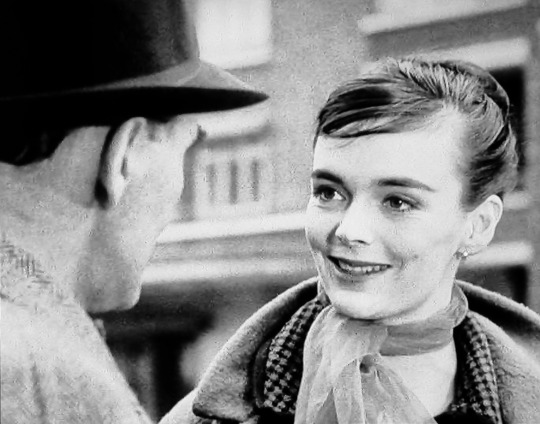
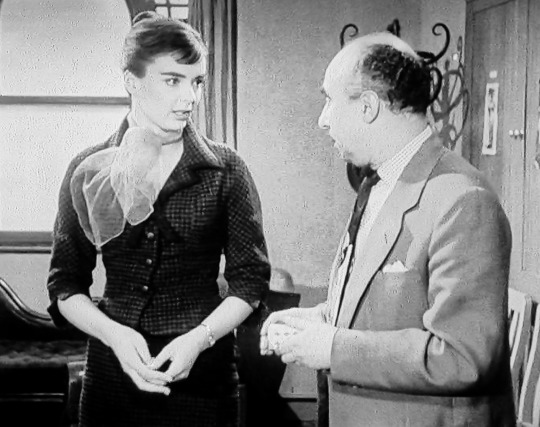
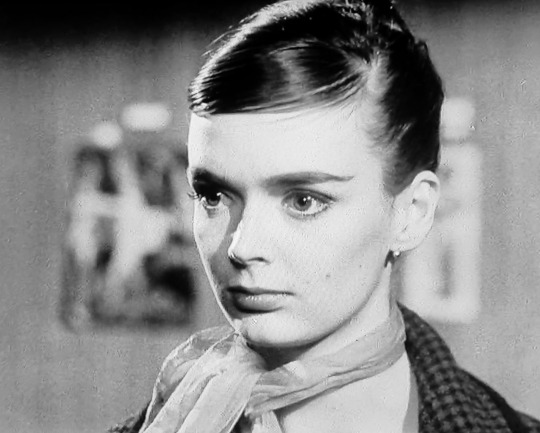
A pre-horror stardom Barbara Steele makes her screen debut as teenage runaway Toni Miller in Dial 999: Missing Persons (1.6, ABC, 1958)
#fave spotting#barbara steele#dial 999#missing persons#1958#classic tv#abc#horror films#scream queen#within a few short years of this first ever screen role‚ Barbara would be an internal sensation and a proto scream queen#known for her horror film appearances in the UK‚ the US and (perhaps most iconic) in Italy#black sunday‚ the pit and the pendulum‚ castle of blood... over the next decade she would make some of the most memorable and#unnerving gothic horror films of the era‚ working with the best directors in the genre#perhaps unsurprisingly‚ having found such success so young‚ her genre tv credits are very few; in the uk she made just this episode#of Dial 999 and‚ seven years later‚ a single Danger Man appearance. mostly she was kept busy in Italy where she fast became the face#of beautiful gothic terror.. as i said in the Pat Troughton and Bill Hartnell posts‚ finding an exact transmission order for Dial 999#seems pretty fruitless‚ but most online sources agree this was shown 6th (network have it as episode 8 but lord knows what order they're#following‚ possibly they just bunged them all on disc in any old order). toni miller is said to be 19 in the script‚ which i raised an#eyebrow at‚ but actually Barbara was only 20 at the time; she carries herself with a lot confidence and professionalism for such a young#performer (and again‚ this was literally her first screen work). it's not the most rewarding part (she's the passive innocent strung along#by a serial killer of runaway girls) but she brings a certain starry eyed naivety to it that's more charming than the script suggests#oh god i just saw an earlier tag says internal sensation when i meant international.. but I'm on mobile and can't edit tags#pretend pretend
6 notes
·
View notes
Text
heres a transcript of that gina & greg interview i mentioned yesterday. literally nothing new is in this, but theres a lot of info in this that was scattered in varying interviews/podcasts and i like having all of it in one place for future reference purposes
(link to vid)
Patrick: Hey everybody, this is Patrick Cavanaugh from comicbook.com here to bring you a very special conversation about Netflix's The Old Guard, which just debuted last week, and everybody has seen it-- I believe people have seen it by now, so that's very exciting. And to dive deep into this film, we're actually very lucky to have the film's director Gina Prince-Bythewood, who also directed Love And Basketball and Beyond The Lights here. Hello, Gina.
Gina: Hey.
P: And we're also joined by the film's writer, as well as the writer of the original comic book series, The Old Guard. Also, you might know him from his DC Comics work, Batwoman, and Lazarus, to name a few of his titles. We have Greg Rucka! Hello, Greg.
Greg: Hello!
P: So this film just first debuted last week, and I know you guys have been inundated with fans, just loving it. And let's just get to what fans want to know, right off the bat; I'm sure you're getting daily questions about this because there's so much for an expanded universe. So let's set the record straight: will there be a Tiger King crossover?
[everyone laughs]
Greg: Uh, we're planning an animated series with giant Mech suits, and, unbeknownst to a certain franchise, we're going to crossover with Transformers and-- no. Come on. [laughs]
P: Okay, alright, we’ll hold onto that big crossover stuff. And I know Netflix, of course, hasn’t fully announced what the future might be for Old Guard, but I'm just kind of curious if you guys have had any recent conversations about what you'd like to do in the future—theoretical, nothing concrete, of course. But since the film has come out and you've seen fan feedback…?
Gina: I will just say, obviously, it's an incredible compliment that people want to see more. It means we did our job in this. It was very important that this film has a beginning middle and end. We wanted to focus on this.
Greg: Yeah.
Gina: And get it right. Having people want more is an incredible gift and I would say those conversations were really… Greg and I, early on in talking through the story... knowing Greg knows where this thing goes --and it's pretty incredible-- helped me in terms of directing this one. So I will say we've had those conversations early on.
Greg: Yeah Gina’s absolutely right. One of the things that I'm really-- one of the many things I am proud of is that the movie is a whole, you certainly leave it going ‘okay, there could be more, I can see how there is more’. But it is a complete work. It is not contingent and does not need anything else. That said, there were plenty of times we were having conversations and would jokingly be like, ‘oh that'll be in the next one, we'll do that in the next one. We had to cut this so we’ll put it in the next one’.
P: I'm sure people would be very thrilled, as would I. So we’ll try to remain patient since it's only been out a week--
Greg: I think that's reasonable.
P: [sarcastic] I mean, fans are nothing but reasonable--
Greg: [very loud laughter] You know what 'fan' is short for right? Fanatic.
P: [laughs] So Greg, I'm curious. You know, since this is a pretty unique situation where you wrote the original books but then also came to write the script-- which doesn't always happen all that often. I was kind of curious what that process was like and if, when revisiting that core story, if you were tempted to kind of go off into a new directions, you know, uncharted territory? And how you managed to stay faithful to that story.
Greg: So when Skydance initially acquired The Old Guard, Matt Grimm and Don Granger were the guys that I was working with. And they were very clear that they had acquired it because they loved the source material. So when I was doing the adaptation, it was ‘adapt this story to be told in a screen format, there are changes that have to be made’. I didn't see it so much as like ‘I can go in a different direction!’ as ‘it's a really rare opportunity to have a second bite at the apple’. Most writers don't get to tell the same story twice. And even with the collaborative nature of comics, making a movie is far more collaborative. So… being able to benefit from a lot of very smart people-- and then when Gina came aboard, and working very closely with her on the screenplay, you know, taking her notes, and talking at length about it was… I mean, I love the comic we made, I'm very proud of it. But I think this is a superior story. Because it allowed me to fix mistakes I had made. And I think that it certainly works as the film that we wanted it to be, but it has a lot more nuance and a lot more ‘shading’ than the comics ever could have had. So yeah, I mean, I'm very proud of the work we've done.
P: Yeah, as you should be, definitely agree with that. And I know, Gina, you've spoken about how you treated the source material essentially as a Bible as the blueprint for adapting the movie. So a question kind of for both of you, I was curious what scene or sequence were you most excited to bring to life? And then what scene were you most apprehensive about whether or not you could pull it off as faithful to that original?
Gina: For me, I mean, there was there were certainly a couple... Joe and Nicky in the van.
Greg: [nodding] Yeah.
Gina: Such a beautiful moment in the comic. And I wanted to get it right. I knew the actors really wanted to get it right. As soon as we started shooting, I was like, 'oh yeah, they're killing it'. Also Booker in the mine, the speech that he gives to Nile, it's everything to his character. It explains both Booker and Andy; where they are, and why they are the way that they are in that moment of time. And I know that as a director, I saw a perfect take. But going into those, you hope that, ‘am I able to evoke what I need to evoke in the audience?’ I think that the hardest really was the Kill Floor, given how iconic it is in the comic. It's just so beautifully drawn by Leandro, it pops off the page. So ‘how am I going to be able to do the same thing on film?’ But it really kind of boiled down to ‘what is the story [of the scene]’ and really focus on that first, but also wanting to really give a bit of a homage to what Leandro did too, which was my use of silhouette throughout it.
Greg: Yeah, I think that… Gina just listed all of the scenes. I mean, I wanted to see the armored car, that was enormously rewarding for me… I couldn't wait to see the killing room floor... You know, when we talk about moments of adaptation, I actually —and I thought this was really well handled in the movie in particular— Nile’s death wasn't wasn't easy in the comic, because it needed to have heart. You know, Kiki's performance and the way it's shot is just, it's phenomenal.
P: And obviously you can't really talk about this movie, which is this big action-fantasy movie, without talking about that scene between Joe and Nicky. I'm curious what both of your reactions have been to seeing that moment hit so hard with so many fans.
Greg: I'm overjoyed that we're able to give that to so many people. I am also frustrated that it's so overdue. While I don't think that either Gina or I felt that this was… It was important and special because it was important and special between these characters. But, you know, I mean I’m in that place where I recognize why we are getting the response that we are, and, I'm frustrated by the fact that it's 2020. And… apparently we're the first people to have done this? And you can say that about a lot of the reactions, you can say that about the reactions to Kiki's Nile. You can say that about reactions about Charlize portraying Andy. There’s a piece of me that's like ‘guys, we didn't invent the wheel here. All we did was show you, THERE’S A WHEEL HERE!’. So.
P: Yeah, it's interesting and it is frustrating that it is 2020 and we have to refer to this as an anomaly. That this is not the norm, that as you said, this is we're showing people that the wheel exists. And so Gina, you know, between having a film with two powered, seemingly super-powered characters, in a comic book adaptation, which is largely been devoid of such characters. [I think he meant to say female powered characters?] and being a black woman, directing a comic book adaptation— again, something in 2020 that we have to treat as a shocking revelation— I was curious, if you felt any sort of pressure about that on set, or if it was like just a confidence in the material, and support from your collaborators, that it wasn't even an issue?
Gina: Um, are you talking about the scene-?
P: Just the project as a whole.
Gina: There was a reason I took this film, because it moved me. It has to start there. There's all these things; I love putting a black female in the world, I love putting Nicky and Joe in the world, I love putting Joe’s character in the world. Those are all such incredible driving forces. But foremost, I have to feel and care about the characters in the story. And I did. And so, for me, it felt... I mean I was honored to be able to be the one to give these characters a life up on screen... or in that big screen in your living room. There's, of course, enormous pressure. Not only just doing a film, like the bigness of it. Certainly me being a woman, me being a black woman, and doing this when nobody has done it before… It's about proving myself and proving that women like me can do this, that we do like action, that we can shoot action… Just changing that narrative. So there's pressure to get it right and do a good job, but I feed off of that. It made me work harder because I felt like I absolutely had a responsibility to get it right.
P: And we've talked about Kiki a few times as Nile, of course. And Gina, I know you said it was within five seconds of meeting her that you knew she was the right one to play Nile. I was curious, how did the rest of the casting process go? Did everybody get hired that easily? Or was it a harder search to round out the ensemble?
Greg: Yes. I’m curious too!
Gina: You know, I knew going into this that I wanted great actors for every role and it's pretty amazing how many of my first choices are in this film. I mean Matthias Schoenaerts who plays Booker is an incredible actor and I knew I wanted him from the get-go. We were told he doesn't do films like this, but he wanted to meet, which was the first thing, like, ‘oh my gosh it’s on me, don't blow this meeting’ and he said again to my face, ‘I don't do these movies, but I love this movie’ and he loved the character Booker. And after that conversation and hearing my vision, he was in, which was amazing. Marwan Kenzari, I saw him in this independent film called Wolf—
Greg: Yeahhhhhh.
Gina: Phenomenal. And he was supposed to read for the part. We had a meeting over FaceTime. Then, Zoom was not what it is now. And it was such an incredible meeting. He was so passionate about the material. So passionate about the character Joe. So passionate about wanting to give that speech. His energy… I just said 'you don't need to read, like, you're Joe'. Luca Marinelli, who plays Nicky, I saw his audition. He has this depth to him, those eyes.. where you just, you felt everything, you felt his soul. But I needed to do a chemistry reading, as I would with any love story. And so, we flew him in to read with Marwan. They did this incredible improv, and it was so obvious that these two were Joe and Nicky. It was a really beautiful moment as a director to just… know, and I was so excited to show everybody what they had. It leapt off the screen, their connection; they’d never met before but, immediate connection. Chiwetel Ejiofor, I mean… [awed silence]
Greg: Chiwetel... yeah.
Gina: Yeah. To hear that he wanted to be in this and work with me on this, I didn't need anything else at that point. He's truly a genius. Charlize, you know, there are very few women who can work in the space and we believe them. And that's the thing about her work, and her action, we believe her. And we needed that for Andy. And of course she's a great actress, so it was, you know, that was kind of a no-brainer. So, lastly Harry Melling, you know our villain. It's funny, Don Granger, at Skydance, says you've done a good job with your villain if the audience wants to punch him in the face. Harry brought that reality of those templates of Mark Zuckerberg and Martin Shkreli and really rocked it.
Greg: I had, you know, I'm the screenwriter, right? And I am pretty much involved in the production at the director’s sufferance, and Gina was so gracious to want me present-- and more than that, want me present and say things, right? As opposed to ‘stand here and be quiet’, but I remember when Kiki… when they knew they wanted Kiki, like in that window before all the paperwork was done and so on. Throughout most of the casting I wasn't hearing a lot from Gina, just the occasional update. Like ‘I think we've got…’ and then the Kiki audition came in, and Gina, you called me, Granger texted me, Grimm texted me. And it was all the same thing. It was all ‘we have found Nile, oh my god, there were these two scenes and she had us howling in one and weeping in the other and she is perfect’. And the exuberant joy, you know, I remember you on that call being like ‘NO, THIS IS HER!!’. It's like, this is gonna be awesome.
P: So, and to open things up a little bit more to the actual mythology of the film and the comic book series, I think one of the coolest things is that this film doesn't entirely explore is why these characters come back to life? But we also don't entirely need to know that to just… witness this slice of time in their journey. So I'm kind of curious, maybe Greg you have more insight on this, but I'm curious if either of you have those ideas in your head of what the root of this, you know, blessing or curse, the curse of immortality? Or is that just stuff that's entirely irrelevant to this journey?
Greg: I think it's irrelevant… to the journey of the first film. That the story is a self-contained story and you don't need to know why they are immortal. And I think that the film actually does tell you, not specifically, but the film does provide you with enough information to allow you to draw certain conclusions. Because there are really a limited number of ways that they're going to get this way, right? We do not, for instance, see Nile fall into a vat of regeneration juice, right? That's not why Nile comes back. There is a mythology. We know the mythology. We know the why and that's for later. Yes, maybe it will become relevant to the story, but for this story that was told as it was told? No, you don't need to know why.
Gina: The striking thing, when I read the script for the first time was I didn't… I didn't care. Like, I didn't need it. And that surprised me because I know Greg had talked about another company who was interested in the project [Gina doesn’t say, but it was Sony lmao] kept asking ‘you have to tell us why though, in this story, an audience needs to know why’. He was absolutely right [for disagreeing with Sony]. Because I didn't need to know why.
Greg: It's the Rian Johnson School of, you know, it's Looper. ‘We can spend two hours talking about time travel or you can accept that we're in time travel. Which is it going to be?’ And I think that that is one of the most brilliant storytelling decisions made in the last 20 years in film! Literally 'here it is—DOESN’T MATTER, MOVING ON!’ you know.
P: Yeah. It's definitely a bold direction to take. And to have an issue with 'oh, well, we never learn [about the] immortality!' proves that you just miss the point of what the movie is, and that that stuff is kind of irrelevant for right now. Although I do kind of hope that because it's on Netflix someone's expecting like a post credit scene, but it's the autoplay feature, right? [Greg and Patrick talk over eachother, laughing]
Greg: We did talk about that button as a post-credit scene, the Booker [scene]—
Gina: That was originally supposed to be a tag.
Greg: And there was, for a while, the contemplation of ‘maybe we can still [put the Booker scene in as a post-credit scene] and really that'll be like a great big reward for those people who actually watch credits on Netflix. It’s like, you got a bonus scene!’
P: So another, you know, people are loving the characters, they're loving the performances, but also the action is so cool in it, and it feels reminiscent of some other films. But the urgency and efficiency of all of the action sequences always feel like they have a point, and they're not just ‘look what we can pull off this week!’ You know, it's not John Wick on a horse fighting motorcycles because we don't need to do that. It's, you know, always to a point. So I'm kind of curious Greg, what does an action scene look like in your script? And then Gina, what was your whole motivation for putting these action scenes together?
Greg: I had two approaches in this script and used both. Sometimes I would write the sequence as you know, as a series-- this is what is happening, ‘he swings and then his head goes flying’ or whatnot. But knowing very well that unless the script needed to see-- because the script has to specify what is a must. It's a must. It's a must document. ‘We must see this’. ‘We must know this information’. So for a lot of the time, I would sort of drop into a narrative voice and say, ‘okay, now we watch the five of them proceeded to kick every ass and take every name that they come across and please bear in mind you are watching over 10,000 years of combat experience, combined between them’. And then that's the description of an action sequence, right? The screenplay… it's a construction document. It's not the interior decorator’s document. It's not even the Foreman's document. It's an architectural document. And then you give it to the Foreman of the whole production, who then goes, ‘I agree, these are the important things’, and then you get out of their way and watch them do the thing that they have, you know, become an expert at doing to make it happen.
P: Gina, what's your reaction when you read Greg’s script saying, ‘oh, you know, just five immortal warriors demonstrating 10,000 years of combat experience’?
Gina: It's like ‘oh shit’. [everyone laughs] Like that's a very cool thing to read—
Greg: But how do you film it?
Gina: Yeah, exactly! Then you start at the beginning of the scene and 'what character can we reveal in the scene'? And when you start like that, it's less overwhelming. Because the best action sequences for me, when I go to the movies, are those that have a story to them and that are character driven, that have an emotion. So I really started there in the vision of what they should be and just working with my incredible, incredible stunt team, Jeff Habberstad and Danny Hernandez and Bryson Counts[? I dont know who that is]. Designing these fights to tell this story, to showcase this part of character, to further the story. And that was important as well, that we never wanted this film to feel like… rushing through the story to get to each action sequence. All of this works seamlessly. The quiet moments are just as important as the action moments. And so that was exciting to me. But being able to tell the story, reveal character, that was fun. And then it's ‘yeah, how do we choreograph so it feels as if these characters finish each other sentences, so to speak, in terms of action, knowing where the other is going to be, knowing when somebody's out of bullets and need another clip?' Like all those things, the way that they're always picking up used guns and used clips, just this dance. And it was very cool, you know, to really put that together and see what the team came up with. And then to see the actors embody that, bring character, bring performance to that. Which is why it was so great that I had the actual actors doing most of the work, so that we can see that performance.
Greg: I think you used a word that I think clearly came from what Gina’s describing and talking about with working with Danny and Jeff and Bryson. Which is 'efficient'. Like, if you watch the film, you will see that there is only one sequence where Andy is ever firing more than twice, and it is on the killing room floor. After that, whenever she fires a gun, it's one bullet. It goes exactly where she wants it to go. Everything she does becomes an issue of ‘her style is efficiency—‘
Gina: Yeah, that was a big—‘brutal efficiency’ is a term we talked about often, where they know a kill shot. They are not the type that are going to go in an environment and spray. It's lazy and not who they are. They are not going to ever hit someone by accident. They are too good. And their moral code is not like an ordinary For Hire who are just trying to get the target by any means necessary.
P: Yeah, and also speaking to what I feel set these action sequences apart from other action films is, we're used to, you know, like thumping techno or hard rock or something kick in. You know, I don't think anyone had like, you know, Frank Ocean being in an action film on Netflix on their 2020 Bingo cards. So I'm just kind of curious how you put that soundtrack together and what that process was like.
Gina: Yeah. I love music so much. It's so much a part of me as an artist. And for me, I love songs for scores, songs that can evoke an emotion, and elevate a scene or the emotion of a scene without taking it over. And music for this film was so important, to the tone. It was such a balance. This is a violent film, yet I never wanted it to feel like a celebration of violence. The fact that there was a cost to the killing and then motion to the killing. So always wanted to keep that in mind-- and music really helped with that. There's also a thing of, you know, I'm the first audience and I actually don't like heavy metal. So, it annoys me when I watch a movie and it's this non-stop thump. In the rectory —spoiler alert— when Andy kills 19 people, the music I chose was important because it took away the sting of that. I didn't want an audience to revel in ‘oh my God, she killed 19 people’. No, it was ‘she killed 19 people and you see on her face that this was not fun, this was not easy’. You see that on Nile’s face when she walks out, and the music helped that. I wanted the music to feel operatic, because what happened in that room did have that depth of emotion, so music again— so important for vibe and tone and it was fun to find these songs that could do exactly what I wanted them to do.
P: Greg, the narrative is definitely very faithful to the first two Old Guard series and, you know, blends together in this compelling and unique way… Just as a —you know, we are comicbook.com— so coming from the purest sense of interpreting the narrative... [Greg laughs] like there's definitely the flashback with Achilles from the comic book, and then also the flashback to Booker's hanging scene. Those are our absent from the film. And I was just curious if those were ever in the script or if you want to rework them for the future…?
Greg: No, I mean we also had, in the original series, the flashback that sort of accounts the Joe and Nicky, ‘we killed each other’, ‘many times’ sequence as well. There were drafts where all of that was there. And sometimes in greater detail than others. There was a version where that hospital scene— [in the movie] you get just the right amount of… when Booker's relaying it to Nile in the mine. But, you know, there was more to that, and you can see sort of Achilles' story’s presence in the mine, right? There's a glimpse of the painting. So those things weren't erased as much as… when you make a comic, every choice you are making is an efficiency choice. ‘You have X many pages, how are you going to spend them?’ And I'm not a filmmaker. I'm the guy who wrote the thing. But one of the things I can tell you when watching is that it's the same calculus but exponentially. It is— every single thing you are doing is asking if it's serving your narrative. And I think the trade —because it is a trade— of the Achilles backstory to build the Quynh story has a benefit that the Achilles story alone didn't have, in that the Quynh story —especially as it's relayed in the movie— not only does it illuminate Joe, Nicky, Booker, and of course Andy, but it's also Illuminating to Nile, in a way that… talking about Achilles would have been repeating a beat. Because as beautiful, and as important, Achilles is to Andy's character… Booker conveys that heartbreak with his story, right? So it becomes an efficiency question as much as anything else. I mean, that that's really what it comes down to.
P: Speaking to some of the changes again, I don't want to get to spoiler heavy but there's definitely a big change with one character and their possible fate. Don't want to ruin anything for anyone, so trying to play it safe.
Greg: [laughing] Yeah, how are we supposed to answer this, Patrick?
P: Why don't we just text each other? [everyone laughs] Well, I'm kind of curious. One character's trajectory has changed a little bit. What were the discussions like over, you know, altering their trajectory and what that could mean, you know, for their future adventures?
Greg: Well, how do we talk around this?
P: Also, if anyone's been watching this for 40 minutes and hasn't seen the movie, they've got to adjust their priorities.
Gina: I would say, it was about adding more jeopardy and stakes. It absolutely did that. What I love so much about the story and what Greg created is that these characters are mostly immortal. So there is always that threat. But it just added another level to that. But it also crystallized so well… the fact that the moment that Andy is truly saying ‘I'm done’ a new Immortal shows up in Nile. So it just seemed to work really well and, you know, obviously having Greg be so on board with that and take it and run with it was really important.
Greg: It externalizes the conflict beautifully. And I believe I think David Ellison at Skydance likes the term downward pressure, I believe. [Gina smiles, Greg sees] Did you hear that? Did you hear that during editing? [Gina nods] But it does. Look, here's a fundamental problem; it's actually one of the problems at the heart of Force Multiplied: what's jeopardy to an immortal? Cuz it's kind of, you know, as Joe says, ‘what are you gonna do, tough guy? Kill me?’ You know, ‘if I go, I go. I don't know when I'm going’. So you you need to be able to inject into the story some level of jeopardy. You want to heighten the stakes. And it also externalizes that particular character’s conflict.
P: Gina, hopefully I don't put you too much on the spot with this question. But, you know, any time there's a big comic book project announced its, you know, fans start saying, oh, I'd love this person who's done action movies to do it’ or ‘this person who’s already done 10 Sci-Fi movies…’, you know, like Taika Waititi can't direct every movie.
Gina: I would love him to!
P: I'm just actually kind of curious, Gina, if there are any directors that you're particularly a fan of who don't necessarily have the same, you know, Marvel DC, Star Wars experience that that you'd love to hear get announced as tackling, you know, a big budget comic book movie.
Greg: I would like to know too.
Gina: Certainly, I'm excited about what Victoria Mahoney's going to be doing-- she just did second unit [director] on Star Wars, first woman to ever do that. I dig her brain so much and her aesthetic. I'm really excited to see what she's going to do in the action space, certainly.
P: Yeah, very cool. Really looking forward to her career for sure. And I think we're just about out of time here. We were down—
Gina: [raising her hand] Can I ask a question real quick? Sorry, I just need a definitive answer on this because I got called out on Twitter and I asked Greg--
Greg: [laughing] Ohhhhhhh—
Gina: So is Old Guard, is it a graphic novel? Or is it a comic?
Greg: You got to answer that Patrick.
P: Oh boy.
Greg: [laughing] Literally he's watching all credibility start to evaporate if he doesn't get this right. [holding up a comic of Opening Fire] This is a what?
P: I mean… part of me, knowing that it is part one of a three-part overall series… You know, my brain goes to ‘trade paperback’, you know, like it's a volume collecting a certain amount of issues. But if you ask me before volume 2 came out, it would be collected as a graphic novel, but… they're all comic books. They're all just comic books, everybody. Let's just take it easy.
Gina: Okay, thank you.
P: That's my answer.
Greg: Thank you. Thank you. I think that is the appropriate answer.
P: They're all just comic books. Take it easy.
P: Yeah, but I am curious. Of course, one of the interesting things about the film is that over the course of hundreds… thousands of years, these characters, the old guard have kind of influenced humanity in some definitely interesting ways… And ultimately for good, is a little bit of what we're seeing in the film. And I can't help but wonder… is it possible that the old guard could have unintentionally influenced the world for bad? And have some negative ripples come from their actions, or do I have to wait for a sequel for that?
Greg: I think that is a very reasonable and logical question to ask, especially when you know, there are 19 dead bodies lying in a church. You know what I mean? There is a certain amount— and it's almost fatuous to talk about it but there is always the doctrine of unintended consequences. I will say this goes to something else— and I'll say it really quickly because I know we're running out of time. I think one of the things that I really, really loved about what's being said, in the movie, is that at the end of the film… The definitive statement is, if you take away everything about immortality, what it's saying is that… our choices matter and our actions matter and they matter in ways and to people that we will never see and never know of. We try to put right in the world by doing right. And we do that without ever seeing what the ramifications of it are. And sometimes we're going to succeed, gloriously, and sometimes we're going to fail and we may never know that either, right? It's the choice paralysis that that you get from cheating in The Good Place, right? I can't eat or drink or move because morally it's all wrong, right? But the takeaway from the film is that, ‘yeah, your life matters and what you do with it matters and it matters to people that you're never ever going to see.’
P: So yeah. Yeah. Well, I mean, I think that's a great positive, you know, message for us to leave on. And I definitely think that comes across in the film, especially, you know, from the characters like Joe and Nicky just professing… you know, it's about the time that you have. And you don't know when your number is going to be up. So you just try and do as many good things before that happens as you can, and hopefully the world responds to that. So I really connected with that message in the film. Thanks so much for taking the time to chat with me. The Old Guard has been out for… five days. So I look forward to reuniting--
Greg: Does it feel longer to you. Gina? It feels like it's longer for me. [Gina laughs]
P: I look forward to reuniting in maybe 10 more days to talk about the sequel and spin-off and the prequel and all that sort of thing. [Greg laughs] But for now, The Old Guard is still on Netflix. And of course don't be tricked into watching any post-credit scenes because you might end up watching, you know, The Great British Bake Off. Well, thanks so much guys, it was a pleasure.
94 notes
·
View notes
Text
Of Tybalts, Composers, and Prodigals

Kageki Shoujo, the excellent anime about young women attending school to become part of a famed all-female acting troupe, spread the love around during its airing, giving significant screen time for each of its supporting girls in addition to the leading ones, Sarasa and Ai, and right through the final episode which aired this past weekend (spoilers ahead). In it, the results of the auditions for a short Romeo and Juliet scene were revealed, and class president Sawa discovered that she lost out on the role of Tybalt to Sarasa.
When conferring with her teacher, Andou, about the audition, Sawa mentions the famous play (and later Oscar-winning film), Amadeus, comparing herself unfavorably to its lead character, Salieri.

For those who haven’t seen the movie—and it’s worth the watch as a study of what ungrace can do to a man—Salieri is both the lead and antagonist. A semi-biographical film, it follows the court composer as he becomes maddened with jealousy at the young Wolfgang Amadeus Mozart, an improper and immature genius whose talent naturally and far exceeds his own. Sawa sees herself as the diligent Salieri who nonetheless comes up short, while Sarasa is the talented Mozart who replaces her with ease.
Although Sawa emphasizes her own shortcomings while making the comparison, something unkind is still inferred, which is that she believes Sarasa doesn’t deserve the role, laid out especially as Sawa explains that Amadeus is about talent versus hard work. In her mind, Sarasa is all or mostly talent, lacking the work ethic and other attributes that Sawa has. Unfortunately, for a young woman with a good and noble heart, this interpretation demonstrates that she’s headed in the wrong direction, more closely toward Salieri’s heart than she realizes, for a more accurate take on Amadeus is that it’s about what happens when one lives by legalism and pride, leaving no room for grace.
Much the same occurs in the parable of “The Prodigal Son.” This beautiful passage is always worth rereading, but I’ll summarize to get near its end, where Sawa’s story begins to align with it.
A son asks his father for his share of the family estate, takes the money, and wastes it on “wild living.” Now destitute and living without even his culture and religion, he decides to return home to beg to become his father’s servant. However, his father surprises him by running to his son, embracing and kissing him, and throwing a feast. The son’s elder sibling, though, is not amused by the forgiveness and festivities:
The older brother became angry and refused to go in. So his father went out and pleaded with him. But he answered his father, “Look! All these years I’ve been slaving for you and never disobeyed your orders. Yet you never gave me even a young goat so I could celebrate with my friends. But when this son of yours who has squandered your property with prostitutes comes home, you kill the fattened calf for him!”
It��s interesting to note that Sawa isn’t so upset as the older brother in this tale, but she, too, is stubborn and unforgiving. She knows that while on the surface, she’s proclaiming that Sarasa deserved to win the audition, inside she doesn’t feel that’s so. It’s she who deserves the acclaim.

Likewise, the brother lays out his qualifications: “All these years I’ve been slaving for you and never disobeyed your orders.” Sawa is just as obedient, guiding her class throughout an eventful first year at Kouka. She studied hard, rehearsed frequently, and delivered a glittering performance—for all this, both the excellent audition and her character, she deserved to be cast as Tybalt.
There’s much more to be said here that your pastor likely already has, and which I can do no better expressing. Instead, I want to focus on one line that I haven’t heard preached much on before, and which applies more directly to Sawa. While the father says two things in response to his elder son, the latter is much more famous, ending in “… this brother of yours was dead and is alive again; he was lost and is found.” But he precedes those words with these:
“My son,” the father said, “you are always with me, and everything I have is yours.”
When I read the parable, I usually get the feeling that the elder brother kind of gets it, but remains upset after the discussion with his father. Forgiveness probably took a long time, and resentment may have existed throughout the rest of his life toward his sibling. But then again, maybe it wasn’t so. Maybe that one line meant everything to him: “You are always with me, and everything I have is yours.”
What a beautiful thing to hear. There’s intimacy there. There’s true fatherhood there. There’s such love and generosity, a “Remember, you are everything to me,” as well as, perhaps, an understanding that the father and son are much the same in character and integrity.
In Kageki Shoujo, as Sawa struggles with her feelings about herself and toward Sarasa, she’s met by someone similar, too, her senpai, Tomomi, one who has guided her through the year. The conversation they have is significant.

Tomomi gives an example to explain to Sawa that she, too, is more the diligent type. And perhaps more importantly, she demonstrates that she sees Sawa. She sees all the hard work, all the effort. Much like the father sees the elder son, the senpai sees her kohai, and it brings Sawa to tears.
Sawa has been understood, and in that moment, it doesn’t matter whether she lost the role or won it. In that sense she’s given grace: Sawa is not an utter failure because she didn’t win the role over the more talented Sarasa. The end product doesn’t matter. Her heart does.
That’s where the focus must be, at least if Sawa is to do what’s right. Her tendency toward justification by the pride she has in her hard work has started to turn her into something she doesn’t want to be. She likes Sarasa, and doesn’t want to feel toward her as Salieri felt toward Mozart. Thankfully, the words from her senpai, along with those from her teachers, helps push her toward toward forgiveness and humility.
Salieri doesn’t choose such a path. He has his moments in Amadeus where the power of Mozart’s music seems to be transforming him, but his poisoned heart, built on decades of a legalistic and proud foundation, is ultimately unable to erase the bitterness and envy; in the end, he literally goes mad. He tries to commit suicide. And he curses all those around him. Salieri’s pride and ungrace is his undoing.
Sawa could go down that path, too. In a school as competitive as Kouka, it wouldn’t be surprising for a student of her intensity and caliber to be changed by the lack of results, the lack of celebration for who she’s determined to be. If not for a sensitive teacher like Andou and a caring senpai like Tomomi, she could have turned the other way and become full of rage, like the Salieri she has always feared she is.

Of all the character stories in Kageki Shoujo, I related most to Sawa’s. I, too, see Salieri within me. I’ve been that someone who “does things right,” who may not have talent but makes up for it in other ways. Can you relate to that? Have you ever felt like Sawa, Salieri, and myself, that you’re “deserving,” especially compared to others who gain recognition and reward but whom you feel aren’t worthy of such glory?
Thankfully, we don’t have to find an end like Salieri’s. Like Sawa and the brothers, we have a senpai, a teacher, a father who shows us that everyone is worthy of love, even the Mozarts, prodigals, and Sarasas. And just as profoundly, that we—the Sawas, Salieris, and elder brothers—are worthy of that love, too, not because of what we do, measured in success of failure, but because of who we are to him:
“You are always with me, and everything I have is yours.”
We are forgiven. We are loved. We are seen.
And because of that, we can be transformed into an image of love more like the father, away from resentment, pride, and our own strength of will, and toward grace and rest—toward becoming the artist, the masterpiece, which we were always meant to be.
=====
Kageki Shoujo can be streamed on Funimation.
#Anime#Christianity#Kageki Shoujo!!#Kageki Shojo!!#The Prodigal Son#Envy#Grace#Jealousy#Articles#Author: TWWK
18 notes
·
View notes
Text
most of the UK reviews i’ve read of martin eden have been a disappointment, tbh. i don’t know if this is because critics have been busy with cannes or because outlets here just don’t have the space, or because it’s kind of seen as old news. i have seen no real engagement with the politics or form beyond a couple of cursory lines, and it’s a shame because... i think it’s really rich wrt those elements?
so i am looking again at the (wonderful) review from film comment last year and it’s such a shame that it’s not available freely online. so i thought i’d post it here behind a cut. it’s long but worth it imo (and also engages really interestingly with marcello’s other films). it’s by phoebe chen.
COLLECTIVE CONSCIOUSNESS
Jan 3, 2020
BY PHOEBE CHEN
EARLY IN JACK LONDON’S 1909 NOVEL MARTIN EDEN, there is a scattering of references to technical ephemera that the 20th century will promptly leave behind: “chromos and lithographs,” those early attempts at large-scale reproduction; “a vast camera obscura,” by then a centuries-old relic; a bullfight so fervid it’s like “gazing into a kinetoscope,” that proto-cinematic spectacle of cloistered motion. These objects now seem like archaic curios, not much more than the flotsam of culture from the moment it shifted gears to mass production. It’s a change in scale that also ensnares the novel’s title character, a hardy young sailor and autodidact-turned-writer-célèbre, famously an avatar of London’s own hollowing transmutation into a figure for mass consumption. But, lucky him—he remains eminent now on the other side of a century; chance still leaves a world of names and faces to gather dust. Easily the most arresting aspect of Pietro Marcello’s new adaptation is its spotlight on the peripheral: from start to end, London’s linear Künstlerroman is intercut with a dizzying range of archival footage, from a decaying nitrate strip of anarchist Errico Malatesta at a workers’ rally to home video–style super 16mm of kids jiving by an arcade game. In these ghostly interludes, Marcello reanimates the visual detritus of industrial production as a kind of archival unconscious.
This temporal remixing is central to Marcello’s work, mostly experimental documentaries that skew auto-ethnographic and use elusive, essayistic editing to constellate place and memory, but always with a clear eye to the present. Marcello’s first feature, Crossing the Line (2007), gathers footage of domestic migrant workers and the nocturnal trains that barrel them to jobs across the country, laying down a recurring fascination with infrastructure. By his second feature, The Mouth of the Wolf (2009), there is already the sense of an artist in riveting negotiation with the scope of his story and setting. Commissioned by a Jesuit foundation during Marcello’s yearlong residency in the port city of Genoa, the film ebbs between a city-symphonic array and a singular focus on the story of a trans sex worker and her formerly incarcerated lover, still together after 20-odd years and spells of separation. Their lives are bound up with a poetic figuration of the city’s making, from the mythic horizon of ancient travails, recalled in bluer-than-blue shots of the Ligurian Sea at dawn, to new-millennium enterprise in the docklands, filled with shipping crates and bulldozers busy with destruction.
Marcello brings a similar approach to Martin Eden, though its emphasis is inverted: it’s the individual narrative that telescopes a broader history of 20th-century Italy. In this pivotal move, Marcello and co-writer Maurizio Braucci shift London’s Oakland-set story to Naples, switching the cold expanse of the North Pacific for the Mediterranean and its well-traversed waters. The young century, too, is switched out for an indeterminate period with jumbled signifiers: initial clues point to a time just shy of World War II, though a television set in a working-class household soon suggests the late ’50s, and then a plastic helicopter figurine loosely yokes us to the ’70s. Even the score delights in anachronism, marked by a heavy synth bass that perforates the sacral reverb of a cappella and organ song, like a discotheque in a cathedral. And—why not?—’70s and ’80s Europop throwbacks lend archival sequences a further sense of epochal collapse. While Marcello worked with researcher Alessia Petitto for the film’s analog trove, much of its vintage stock is feigned by hand-tinting and distressing original 16mm footage. Sometimes a medium-change jolts with sudden incongruity, as in a cut to dockworkers filmed in black and white, their faces and hands painted in uncanny approximations of living complexions. Other transitions are so precisely matched to color and texture that they seem extensions of a dream.
Martin’s writer’s optimism is built on a faith in language as the site of communication and mutual recognition. So follows his tragedy.
Patchworked from the scraps of a long century, this composite view seems to bristle against a story of individual formation. It feels like a strange time for an artist’s coming-of-age tale adapted with such sincerity, especially when that central emphasis on becoming—and becoming a writer, no less—is upended by geopolitical and ecological hostility. At first, our young Martin strides on screen with all the endearing curiosity of an archetypal naïf, played by Luca Marinelli with a cannonballing force that still makes room for the gentler affects of embarrassment and first love. Like the novel, the film begins with a dockside rescue: early one morning, Martin saves a young aristocrat from a beating, for which he is rewarded with lunch at the family estate. On its storied grounds, Martin meets the stranger’s luminous sister, Elena Orsini (Jessica Cressy), a blonde-haloed and silk-bloused conduit for his twinned desires of knowledge and class transgression. In rooms of ornate stucco and gilded everything, the Orsinis parade their enthusiasm for education in a contrived show of open-mindedness, a familiar posture of well-meaning liberals who love to trumpet a certain model of education as global panacea. University-educated Elena can recite Baudelaire in French; Martin trips over simple conjugations in his mother tongue. “You need money to study,” he protests, after Elena prescribes him a back-to-school stint. “I’m sure that your family would not ignore such an important objective,” she insists (to an orphan, who first set sail at age 11).
Anyone who has ever been thrilled into critical pursuit by a single moment of understanding knows the first beat of this story. Bolting through book after book, Martin is fired by the ever-shifting measure of his knowledge. In these limitless stretches of facts to come, there’s the promised glow of sheer comprehension, the way it clarifies the world as it intoxicates: “All hidden things were laying their secrets bare. He was drunk with comprehension,” writes London. Marcello is just as attentive to how Martin understands, a process anchored to the past experiences of his working body. From his years of manual labor, he comes to knowledge in a distinctly embodied way, charming by being so literal. At lunch with the Orsinis, he offers a bread roll as a metaphor for education and gestures at the sauce on his plate as “poverty,” tearing off a piece of education and mopping up the remnants with relish. Later, in a letter to Elena, he recounts his adventures in literacy: “I note down new words, I turn them into my friends.” In these early moments, his expressions are as playful as they are trenchant, enlivened by newfound ways of articulating experience. His writer’s optimism is built on a faith in language as the site of communication and mutual recognition. So follows his tragedy.
One of Marcello’s major structural decisions admittedly makes for some final-act whiplash, when a cut elides the loaded years of Martin’s incremental success, stratospheric fame, and present fall into jaded torpor. By now, he is a bottle-blonde chain-smoker with his own palazzo and entourage, set to leave on a U.S. press tour even though he hasn’t written a thing in years. His ideas have been amplified to unprecedented reach by mass media, and his words circulate as abstract commodities for a vulturine audience. For all its emphasis on formation, Martin Eden is less a story of ebullient self-discovery than one of inhibiting self-consciousness. There is no real sense that Martin’s baseline character has changed, because it hasn’t. Even his now best-selling writing is the stuff of countless prior rejected manuscripts. From that first day at the Orsini estate, when his roughness sticks out to him as a fact, he learns about the gulf between a hardier self-image and the surface self that’s eyed by others.
WITH SUCH A DEEPLY INHABITED PERFORMANCE by Marinelli, it’s intuitive to read the film as a character study, but the lyrical interiority of London’s novel never feels like the point of Marcello’s adaptation. Archival clips—aged by time, or a colorist’s hand—often seem to illustrate episodes from Martin’s past, punctuating the visual specificity of individual memory: a tense encounter with his sister cuts to two children dancing with joyous frenzy; his failed grammar-school entrance exam finds its way to sepia-stained shots of a crippled, shoeless boy. These insertions are more affective echoes than literal ones, the store of a single life drawn from a pool of collective happening.
But, that catch: writing in the hopes of being read, as Martin does (as most do), means feeding some construct of a distinctive self. While the spotlight of celebrity singles out the destructive irony of Martin’s aggressive individualism, Marcello draws from Italy’s roiling history of anarchist and workerist movements to complicate the film’s political critique, taking an itinerant path through factions and waves from anarcho-communism in the early 1900s to the pro-strike years of autonomist Marxism in the late ’70s. In place of crystalline messaging is a structure that parallels Martin’s own desultory politics, traced in both film and novel through his commitment to liberal theorist Herbert Spencer. Early on, Martin has an epiphanic encounter with Spencer’s First Principles (a detail informed by London’s own discovery of the text as a teen), which lays out a systematic philosophy of natural laws, and offers evolution as a structuring principle for the universe—a “master-key,” London offers. Soon, Martin bellows diatribes shaped by Spencer’s more divisive, social Darwinist ideas of evolutionary justice, as though progress is only possible through cruel ambivalence. Late in the film, an image of a drunk and passed-out Martin cuts to yellowed footage of a young boy penciling his name—“Martin Eden”—over and over in an exercise book, a dream of becoming turned memory.
In Marcello’s previous feature, Lost and Beautiful (2015), memory is more explicitly staged as an attachment to landscape. Like Alice Rohrwacher’s Happy as Lazzaro, Lost and Beautiful plays as a pastoral elegy but lays out the bureaucratic inefficiency that hastens heritage loss through neglect. Rolling fields make occasional appearances in Martin Eden, but its Neapolitan surroundings evoke a different history. Far from the two oceans that inspired a North American tradition of maritime literature, the Mediterranean guards its own idiosyncrasies of promise and catastrophe. Of the Sea’s fraught function as a regional crossroads, Marcello has noted, in The Mouth of the Wolf, a braiding of fate and agency: “They are men who transmigrate,” the opening voiceover intones. “We don’t know their stories. We know they chose, found this place, not others.” Mare Nostrum—“Our Sea”—is the Roman epithet for the Mediterranean, a possessive projection that abides in current vernacular. Like so many cities that cup the sea, Naples is a site of immigrant crossing, a fact slyly addressed in Martin Eden with a fleeting long shot of black workers barreling hay in a field of slanted sun, and, at the end, a group of immigrants sitting on a beach at dusk. Brief, but enough to mark the changing conditions of a new century.
Not much is really new, however: not the perils of migration, nor the proselytizing individualists, nor the media circus, nor the classist distortions of taste, nor, blessedly, the kind of learning for learning’s sake that stokes and sustains an interest in the world. Toward the end of the film, there is a shot of our tired once-hero, slumped in the back seat of a car, that cuts to sepia stock of children laughing and running to reach the camera-as-car-window, as if peering through glass and time. It recalls a scene from Wim Wenders’s Wings of Desire, which leaps backward through a similar gaze, when the weary angel Cassiel looks out of a car window at the vista of ’80s Berlin and sees, instead, grainy footage of postwar streets strewn with rubble in fresh ruin. Where human perception is shackled to linearity, these wool-coated and scarfed seraphs—a materialization of Walter Benjamin’s “angel of history”—see all of time in a simultaneous sweep, as they wander Berlin with their palliative touch. Marcello’s Martin Eden mosaics a view less pointedly omniscient, but just as filled with a humanist commitment to the turning world, even as Martin slides into disillusion. All its faces plucked from history remind me of a line from a Pasolini poem: “Everything on that street / was human, and the people all clung / to it tightly.”
Phoebe Chen is a writer and graduate student living in New York.
13 notes
·
View notes
Text
College Student!Haechan
part of the NCT DREAM living the Y/N life collection.

lemme introduce you to some new things donghyuck
full name: lee donghyuck
age: 19 [international]
height: 174cm
donghyuck is an adorable prankster who’s known far-and-wide throughout his life
the boy started out as a class clown, making jokes at teachers and other students in kindergarten
it got him into loads of trouble, and he didn’t really have friends because the other kids called him mean and scary when he tries to joke around with them
hyuck didn’t care tho
he loves the attention from both his peers and parents even if it meant getting scolded every night
he didn’t change when he went to elementary school, still going around pulling pranks on other people, so far as to pulling at a girl’s pigtails and being sent into detention
although his persona did change when high school rolled around
he’s no longer donghyuck, the adorkable class clown he’s now donghyuck, a rebel that hates schoolwork, teachers, and gets thrown into detention more often than he should
never does his homework, smack talks at teachers and destroys school property
people started to wonder why he hasn’t been thrown out of school yet
the only reason he’s still passing his grades is because of mark, a senior who talks and acts friendly around hyuck as if he’s just any normal student
at first hyuck thought the guy befriended him because he wanted something from him
maybe his lunch or his money
but hyuck’s blown away when mark tells him that he just wanted them to be friends
mark tells him about seeing him roam around the halls with no one to talk to,, his hands in his pockets and staying out on the outskirts and how he feels a pang in his heart
he knows the feeling of being alone with no one to talk to just because people won’t spend time trying to get to know the person underneath
he felt it himself after he moved to seoul, all the kids rejecting him from their friend circles because he looked and talked differently
and mark felt the need to befriend him
the two start hanging out alot after that
playing online games together, hanging out in arcades together, walking around school together
sometimes hyuck gives mark headaches because the boy doesn’t want to do any of his workload,, even once trying to pay mark to do his homework
and mark’s pleasantly surprised when he finds out that hyuck is nowhere near stupid
the boy could rank number one in his year if he actually put some work in
hyuck tells him it’s because school just isn’t his passion
“i want to be a singer someday. i won’t be stuck doing algebra and i’ll be going on tours and performing instead.”
hyuck’s 20 now and a changed man
he’s gotten himself into a prestigious college for the performing arts, one step closer to making his dream come true
and while he would never admit it, he’s grateful for mark. if it weren’t for him, he’s end up as a dead beat high school dropout
speaking of mark
mark went to a different college for arts, almost a town away from his
and today he’s going to come by from all the nagging hyucks’s been giving him about not meeting each other often
they’re going to meet at a cafe
and hyuck’s waiting for mark who’s 20 minutes late because of traffic
“hyung! if you didn’t want to see me you could have said so.”
“traffic’s a bitch.”
he’s starting to get bored sitting at the corner alone with nothing but his phone to keep him company, mark not even replying to his messages
until something gets his attention
its you
you’re a solo singer that started out as an actress
relatively young and have debuted for a few years now, known for your amazing vocals and catchy songs
and there you are
on the screen of a flat screen tv hanging just above him, singing and dancing in your newly released mv
hyuck’s staring at the screen and he’s listening very carefully to your song
even going onto his phone and searching for your music after the mv finishes and another show starts playing on the tv
he doesn’t even realize mark running in looking like a train wreck
out of breath and very disheveled with a very clear coffee stain on his shirt
and when he does, haechan shoves his phone into mark’s face, the latter squinting at the bright screen
“who’s this?”
“that’s y/n? she’s a solo singer, i told you about her remember?”
“nope.”
hyuck’s a little confused because?? if mark had told him about you there’s no way he would’ve forgotten
boy goes on a streaming spree right after coming home
can’t be reached by anyone for a whole 24/7, burrowing in his room with the air con on full and his phone blasting your mv one after the other
he’s hooked
goes on an impulsive buying spree for your light stick and multiple albums
pretty much spending his life’s money
droning on and on again and again to mark about you
he goes on non stop about how mark should’ve told him about you sooner, said boy rolling his eyes because, “you’re the one who forgot.”
he burst into tears when mark gave him a fan sign ticket as a reward for acing all his classes mark is THAT friend yall
hugging the life out of the older one and covering mark’s face with spit when he kisses him all over we all need a mark in our lives tbh
he still can not believe he’s going to meet you
d-day arrives
hyuck set up 5 alarms last night so he wouldn’t accidentally over sleep and miss meeting you
all his life, he’s never been a fan of working out but here he is, 8 hours before a fan sign doing pull ups and push ups because he wants to look good
he isn’t ashamed to admit that he shaved twice
nor is he ashamed that he’s using a face mask he literally just bought yesterday because they’re supposed to make him look shining, shimmering and splendid
he’s rushing out of his dorm to where the fan sign is held and he literally stops breathing when he sees you in person surrounded by security and scary looking managers
he’s reminding himself to breath because he doesn’t want to pass out in front of you while all his brain is thinking is, ‘how does she even look better in person?’
‘she looks like an angel.’
‘she’s breathtaking.’
hyuck’s convinced he’s in love
and he only watches you and stares at everything you do
he turns red when you turn to him and wave from afar
‘did that just really happen?’
‘did i just get noticed?’
‘am i in heaven?’
when its finally his turn, he turns into stone all of his planned speeches disappearing into thin air
donghyuck.exe.has stopped functioning
he gives you his gift and he knows you see him trembling and you laugh, holding his hand to stop his shaking
‘did i just hear wedding bells ringing?’
‘i’m never going to wash my hands’
he’s having his own internal crisis
you’re there staring at him for a bit, making sure you smile at him and engage in eye contact
while inside you’re a little blown away because you’ve seen your fair shares of handsome men, your own fans being the most handsome in your eyes but you’ve never seen anyone as handsome as donghyuck is and you’re wondering why he hasn’t been snatched by idol companies
both of you smile and talk to each other
and hyuck’s freaking out a little because this is his time is running out and this is the only chance to tell you the words he thought about for 3 days he even forced mark into his mini lyric writing session
“i wanted to thank you for always making me smile.”
and you’re smiling so much wider by now, the sweet words from your fans never failing to take your breath away
“are you kidding me? donghyuck you’re like the sun, so warm and you bright up my day. you’re my full sun.”
the boy practically melted then and there and had to be escorted out by your security team
the next time he meets mark all he can ramble on and on about is your fansign
“mark, she called me her sun..”
“mARK DON’T TOUCH ME I’M THE FREAKING SUN.”
“I’M CHANGING MY NAME TO LEE HAECHAN.”
#lee haechan x reader#lee haechan imagine#lee haechan drabble#lee haechan imagines#lee donghyuck x reader#lee donghyuck imagines#lee donghyuck drabble#haechan x reader#haechan imagines#donghyuck x reader#donghyuck imagines#donghyuck scenarios#haechan imagine#donghyuck fluff#haechan fluff#donghyuck au#haechan au#nct dream fluff#nct dream imagines#nct dream drabbles#nct dream x reader#nct dream au#nct dream blurbs#nct dream scenarios#nct x reader#nct imagines#nct drabble#nct scenarios#nct blurbs#nct au
230 notes
·
View notes
Text
7th July, 2021 shall go down in history as the day India lost one of her greatest stalwarts, the legend himself- the unimitable Dilip Kumar. Possibly the best actor Indian cinema has ever had, Sri Dilip Kumar was an institution in himself, teaching aspiring actors the art of nuanced acting through his varied works. Originally known as the 'Tragedy King', he excelled equally in comic roles, thereby proving his versatility to the world. Today, we dedicate this special blog to him. If not for 'Mughal-e-Azam', 'Jodha Akbar' would probably remain unmade. Had there been no Dilip Kumar, who would have inspired the next generations?
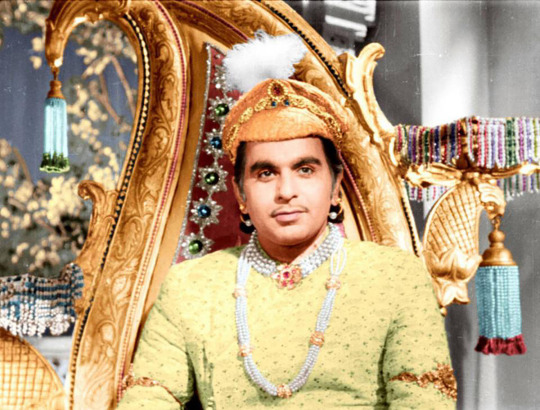
For every movie buff, the dvd release of a favourite film has great significance- the extra reels!! Scenes that were edited out, 'behind the screen' actions, interviews- there is a lot of stuff that we get to watch on the dvds and nowhere else (until some kind soul uploads them 😉😛).. However, a lot of the times, we are left wondering if the dvd was indeed worth our money. Of course, we get to watch the film whenever we want to, but what about the rest? If there is one dvd that gives buyers their money's worth, it is Jodha Akbar.
Ashutosh makes history even here; he is probably the only director who has had to edit out so many fabulous scenes from his film. Others are less unfortunate- they usually edit out unimportant bits, and even if those are good, most of the times, they are dispensable. In Jodha Akbar, most of the deleted scenes seem just the opposite. Once you have seen them, watching the edited version of the film feels somewhat incomplete.
The first scene that comes to mind is 'Jodha talking to her friends about Ratan Singh'. Yes, yes, we do not like Ratan Singh either! However, he is not the reason why we are mentioning this scene here, Jodha is. While the rest of the scene seems totally editable, Jodha's answer to her friend's question about whether she will willingly surrender to Ratan Singh proves that no matter how unimportant a Gowariker scene seems at first, one must never judge before it ends. In the film, we see a bold and opinionated Jodha breaking the stereotypical norms of her society and daring to express her unwillingness to surrender on the very first night. Naturally, when we saw the scene for the first time, we took Jodha's words at face value; we assumed she was not ready because of the forced marriage. However, the deleted scene proves that she would have done the same even for Ratan Singh. She would never have loved someone unless he gave him the resepect she deserved. What a woman!
Next in line is the 'Bidaai' scene, whose essence can literally be summed up in the question that Raja Bharmal's aide asks- 'Ye bidaai hai ya bali?' Jodha indeed is akin to a sacrificial lamb in this scene, and Aishwarya's tears express it all.
Of course, we are interested in Jodha and Akbar's interactions more than anything else, and in all honesty, that was why we all were so impatient for the deleted scenes to come out back then. And thankfully, we do get some unseen moments, although it would be wonderful if the entire 'deleted scene' reel had been just them! 😄😂🤩🥰
Horrified after witnessing Jalal's abject cruelty towards Adham, Jodha confronts her husband and reprimands him for his actions. She is shocked that he never even spared a thought for Maham Anga before taking such a drastic decision. Jalal, however remains adamant as well as furious, and maintains that Adham got what he deserved. Although initially unable to come to terms with it, she soon realizes his reason for doing whatever he did. As a broken and helpless Jalal confesses that if Maham Anga has lost a son, he has lost a father, Jodha understands the agony her husband is going through. Hrithik is brilliant, first as the incandescent Jalal, and then as the heart-broken one. As Jodha places her hand on his shoulder to console him, one can't help but wonder why this scene was edited out of the original reel! What harm would an extra few seconds or even minutes do? 😭
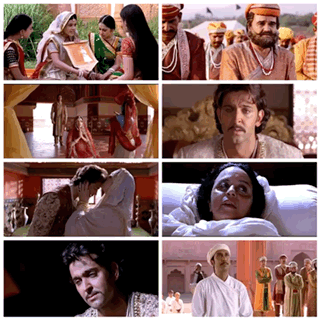
Then comes Mahesh Das aka Birbal. The two scenes through which Ashutosh narrates the history of Mahesh Das's transformation into Birbal are undoubtedly the jewels in the crown of the deleted reel. In the first, Jalal and Jodha meet Mahesh Das who cleverly prevents the emperor from hunting, much to Jodha's pleasure (and ours too). When he claims to know exactly how many birds there are in the land, Jalal tells him that he will be punished if he is wrong. However, Mahesh Das's wit is unparalleled and he rattles a random number. As Jalal and Jodha both look at him with surprise, he explains. If his answer is more than the actual figure, it will mean that birds from the neighbouring land have visited; if less, it will imply that birds from Agra have gone to visit their relatives. Naturally, both the emperor and the queen are impressed. Jalal gives his ring to Mahesh Das and asks him to visit the Deewan-e-Aam.
In the second scene, Mahesh Das visits the Deewan-e-Aam but encounters a corrupt guard who refuses to let common people enter the court without a bribe. When Mahesh Das shows him the emperor's ring, the latter allows him to enter on one condition- Mahesh Das must share half of whatever gift he receives from the emperor with him. Little does he know that he is talking to one of the 'would be' Navratnas of Akbar's court, incidentally one of the most famous ones! Mahesh Das agrees to his condition and asks for a prize of 50 whip shots from Jalal, much to his and evryone else's shock. When he explains the reason for making such a strange request, Jalal calls the guard and orders him to be whipped 50 times instead as a punishment for corruption, which he insists shall have no place in his empire. Fascinated with his wit, Jalal invites Mahesh Das to be a part of the Mughal court. However, Mulla Do-Piyaza objects, and Jalal gives him permission to test the former. If he is able to answer Mulla Do-Piyaza's question, he will be accepted in court. If not, he will be punished. That is the deal. Also, if Mahesh Das wins, then Mulla Do-Piyaza promises to bow before him every day. Jalal agrees, and so does Mahesh Das. After much deliberation, Mulla Do-Piyaza asks Mahesh Das to guess what he is thinking at the moment. Of course, it is an impossible task. However, Mahesh Das is not someone to give up; nor does he need to. His intellect is ready with an answer. He tells the court that at this moment, Mulla Do-Piyaza is praying to the All Mighty for the emperor's long life, good health and prosperity. Is there anything left for Mulla Do-Piyaza to do except accept defeat? 😂😂 Having proved his cleverness to everyone, Mahesh Das attracts appreciation from one and all, and earns a priceless reward from the emperor himself- the name 'Birbal' (meaning quick-witted or 'dimaag mein taaqat'). Having these excellently scripted, directed and enacted scenes in the film would have been worth the extra time!
Two more deleted sequences deserve mention. The first is the moment of Maham Anga's death. Jalal comes to see her as she lies on her death bed, frail and ill. We understand this is the first time he is interacting with her since the betrayal. If not for anything else, this scene should have been included only for Hrithik's exceptional performance, and of course for Ila Arun ji. As Maham Anga finally admits to Jalal that she had wronged Jodha on account of her overpossessiveness for him, and asks him to call him like he used to one last time, we see a completely devastated Jalal, not the Shahenshah of Hindustaan, but just a grieving son. As if she was waiting for that one word from him, Maham Anga passes away the minute Jalal calls her 'Badi Ammi' again. The scene is a strange mixture of melancholia and poeticness, and Hrithik's wonderful emotive capacity makes it one of the best bits of the whole film, both the edited and the unedited versions. On another note, how does someone look so handsome and flawless while sobbing? Is Hrithik even human? 🙄🤨😐😑🤗🤗🤗🤗🤗
The second is the scene when Jalal comes to meet Jodha and his mother before departing for the war with Shareefuddin. Jodha says she is praying for three lives- her husband, her brother Sujamal, and her sister-in- law Bakshi Bano Begum (Shareefuddin's wife). Nonetheless, Jalal vows to protect Amer, no matter what it takes. The scene is poignant and yet another example of the magical on screen chemistry between Hrithik and Aishwarya. Seriously, we deserve them again!!
In conclusion, we reiterate that we would not have minded had the film been half an hour longer due to the inclusion of all the scenes mentioned above
With that, we have come to the end of this blog. Hopefully, you will join us on our next too. Stay safe. Stay well.
Once again, this one is for you Dilip Kumar Saab. You showed the way; so, we have Jodha Akbar. Thank You Sir. May you Rest In Peace 🙏🙏
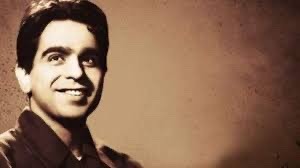
4 notes
·
View notes
Text
Review (In Progress): THE WITCHER 3: WILD HUNT (2015)
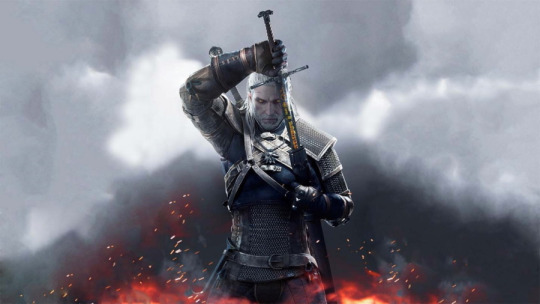
The third and final (so far) game in The Witcher trilogy is big. Very big. Massive. Supermassive. Maybe I’m just a little intimidated by the depth and width and density of the game, but as of this writing, I’ve clocked in 62.4 hours on the game. That’s compared to the 48.1 hours of The Witcher and 31.5 hours of The Witcher 2. I’m closing in on the point where I’ve played Wild Hunt more than the first two games combined. From where I sit, there’s no end in sight, either; I have yet to complete the story, in addition to multiple sidequests, witcher contracts, and treasure hunts, not to mention the jawdropping expansion quests Hearts of Stone and Blood & Wine, which combined supposedly equal the length of the main story quest itself. Throw everything in a blender and pour it out, and I’ll be surprised if I eventually finish everything I’ve a mind for in under 150 hours. This is a big game. This is a dense game, packed with content every couple of miles or so, in a world where you can’t walk into a town without stumbling onto someone -- or something -- in need, and that’s ignoring the contracts on notice boards. People walk, talk, argue, cough, stumble around drunk, and get into fights with you. Oh yes, run afoul of local gangs, and they will come for you. Meanwhile, the vast open world is teeming with monsters to battle and loot, from the continual presence of drowners to the new griffins and basilisks. An overwhelming amount of content in a series that already packs plenty of content into each game. It would be far, far too much and monotonous if it wasn’t for one thing: developers CD Projekt Red write compelling material, and they know how to write a damn good story.
When the game opened up, it looked just like any other open world game I’ve ever played, and immediately I felt a pang of disappointment. I’ve done Far Cry 3, Horizon: Zero Dawn, Grand Theft Auto V, Assassin’s Creed: Origins, and like many of my gaming generation I get what to do. Seek out loot, checkpoints for fast travel, towns, fight things to get xp, ignore the “pressing” main story in favor of side quests for cool shit, yadda yadda yadda. Considering the first two Witcher games felt like original experiences in what they were trying to do, to walk into such a generic open-world framework was such a let down.
At first.
But then, something strange began to happen: I settled in. Two random quests twisted and convoluted into a connected thread, which was followed by a third main quest which circled back to this thread and elaborated on it. Suddenly a character who just seemed off her rocker was now a fearfully sympathetic human being, now seen in the light of someone else’s story. CD Projeckt Red hooked me, hooked me bad, and now this wide wide world was no longer a series of performances, it was the lives of people in this world and how Geralt affects them -- just like in the previous games. Only here, it’s bigger and wider and seemingly less connected, but it still all comes back together. Choices matter. People matter. The world itself twists and winds according to you, the witcher, and who you side with/fight for. Every other open world game I’ve played has had Things To Do, and this is no exception, but now suddenly it feels like everything matters. Before, everything I did felt like it was to further a progression percentage, to get trophies and upgrade items and simply arcade my way through a sandbox which promised “openness” but really was just all the levels of a video game laid out side-by-side so you could see them all at once instead of having to press through to get to the next one. This is the first time where I’ve really, honestly felt like I was walking through a living world, and to say that it’s captured me is an understatement. Where once I would have rolled my eyes at sidequesting in the face of a main quest where the point is to track someone down or save someone because it is incredibly important, now it feels like the most natural thing because the main quest requires you to go through some shit first. Every contract and quest met along the way furthers the main quest in some way or another, particularly when you open up new quests AFTER helping old friends, friends who now desperately need your help again, and what would happen if you weren’t there? Combine all of this with exceptional voice acting, talented writing, detailed animations, and we have compelling content literally around every corner. And that’s even when you’re just out searching for treasure or diagrams to make better witcher armor! Stories pop up everywhere, all of it interesting, even the slightest of things, and it truly crafts a distracting world to be enveloped by.
A living breathing world would be one thing all on its own, but thankfully Wild Hunt features the best-looking graphics in the series to date. I was genuinely worried that my old rig wouldn’t be able to handle a massive open-world game from 2015 without some tweaks (my desktop is old, shut up), but for the most part I’m running everything on high and it is breathtaking. Weather effects, god rays, BLOOM jesus christ I’m appreciating bloom in a video game for the very first time and I hate that I am but god fuck the first time you see the moon behind clouds in this game with bloom on, and I’m talking a full moon so it is BRIGHT and BEAUTIFUL and just. But I’m getting ahead of myself. Detailed textures and character models, the best in the series so far, a wide palette of colors (which sometimes makes the game look like a living painting, in the best of ways), absolutely masterful work. There’s the odd object-poking-through-something-it-really-shouldn’t, or the glitchy human being moving/acting/dying in ways they shouldn’t be, but that’s also a staple of both open world games and this series in general. Jank happens, especially in a game this size. It’s not as breaking as it has been in certain aspects of the first two games, and it’s mostly Bethesda-level charming. What matters though is that it doesn’t kill the experience, nor does it happen so often that it feels like the game is bugged or broken.
Combat, meanwhile, is still not perfect but it’s the best it’s been in the trilogy. Fast and furious, yet rewarding for those who have more patient skills, swordplay is easy and comfortable and versatile. Similar to the second game, one needs only turn the camera towards whichever enemy they want to attack and Geralt automatically goes for whichever monster or human is highlighted. Sometimes this can be fraught as the game will erratically highlight a different character than the one you’re facing, or will transfer the highlight to a different enemy if the one you were facing dances out of sight due to a roll or dodge or other maneuver. But it’s only frustrating sometimes; this was a flaw far more prevalent in the second game than here, and the lock-on mechanic is a godsend when paired against high-level creatures. With patience and tactics I’ve been able to competently square with beasts far too high level for me to tackle, and actually come out the victor, an idea that would be absolute suicide in the first two games. But now strategy versus simple number rolls can prevail, provided you are prepared and/or willing to have the patience to chip away while dodging for your life.
Wild Hunt is one of the few game worlds I’ve entered that feels stunningly alive. Whenever I start up the game, I am transported. Taken away. Breathlessly in awe of how real and vibrant the physical presence of the visuals on screen are. What a strange gift to behold. And, yet, aggravatingly, it frustrates me that most opinions I have encountered are that players don’t need to play through Witcher 1 & 2 in order to play this game. You certainly can, but so much context is lost. Geralt’s relationships with Triss and Yennifer and the struggles between them (that is, should you decide to romance Triss); the nostalgia and heartache of coming back to Kaer Morhen and revisting the other witchers; the friends and former alliances who pop up under vastly different circumstances; the paths taken and decisions made which impact where and how you begin this story. Wild Hunt is the culmination of a near-decade’s worth of storytelling, and the rewards for having played through the previous two games are plentiful. Nilfgaard’s invasion has extra oomph knowing where they were before, and walking through Vizima’s capital now occupied by Emperor Emhyr is especially chilling and devastating. I have no doubt that someone could pick up this game and play it and get the jist of what’s going on without playing the first two games. But will it mean as much? I daresay no. It is absolutely essential to play the first two games to truly feel the depth of impact that this story -- this world -- has to offer.
At this point in time it seems I’m coming upon some kind of resolution to the story. I’m off in search of allies to help combat a vicious foe, meaning it’s time to wrap up any side quests I still have in my ledger. There’s a lot to do. Once I’ve reached the conclusion of this game, this story, I’ll provide a wrap-up review. For now, this deep and still ploughing through, The Witcher 3: Wild Hunt is not only the best of the trilogy, it makes me want to go all the way back to the first game and play through the whole series again with different choices, for different outcomes, if only to see the roads I did not take and who was left behind. This is an amazing experience with literally hours of content to take in, and I am eager to devour the remainder.
Score (So Far): 9/10
#the witcher#wild hunt#blood and wine#hearts of stone#geralt of rivia#Yennefer of Vengerberg#Triss Merigold#CD Projekt RED#pc gaming#rpg#review#ck burch#ruby ranger#ranger report
2 notes
·
View notes
Text
yalright let’s do this
AGENTS OF SHIELD SEASON ONE REWATCH COMPLETE BREAKDOWN MEGAPOST
hella spoilers for the entire canon up through season 5, but not 6 because I only saw it the once and am having a hard time remembering ANYthing about it.
I cannot determine specifically what it was about this season that caused to be branded “literal garbage” in my mind-hole for seven years.
Best guesses:
there’s some cheesy stuff that probably didn’t sit well with me at the time, and, at the time, there was no way of knowing that that kind of stuff was going to be ultimately eradicated
there’s some good stuff, like character stuff and plot stuff, but it didn’t successfully implant positive emotional responses in my brain-hole, leading me to be frustrated/offended at its own self-importance
there’s some stuff that just Doesn’t Work. I won’t call anybody out, but there are some main side characters whose casting, in my opinion, leaves much to be desired. when it comes to acting ability, I feel that it’s important to have the ranges of your entire cast match each other. if you’re gonna hire B-listers, at least make sure they’re ALL B-listers. if you’re gonna splurge and get some S-tier talent, pleeeeease don’t embarrass the B-listers by thinking you’re doing them a favor by including them on your project. Understood, this opinion is highly subjective and I can’t expect everyone in front or behind the screen to buy into it, but it’s definitely a pet peeve of mine that causes strong reactions in me*
some of the plots are tired and/or straight up boring. I got through them easily this time through because I was able to focus on the things I like, which is largely character interactions and re-learning the backstory for stuff that I know will continue to be important later on. imagine listening to your grandpa’s stories about his life, but instead of telling you the cool stories about going to the moon or whatever, he’s telling you in great detail about the time he got his shoelaces stuck on like, a rusty nail sticking out of a fence. It’s not a great story but it does explain why his mom only bought him velcro shoes after that and one time when they were trying on shoes in the store a couple of years later, some other kid started making fun of him for having velcro shoes and long story short your grandpa’s relationship with that kid is what got him interested in astrophysics and also he married that kid twenty-five years later -- but right now the story is specifically about spending forty minutes trying not to get tetanus.
Now that I’m older and wiser, what really surprised me throughout, though, was that not only was I not having any type of reaction that validated my “literal garbage” classification, I was noticing that there was A Lot of stuff that ticked a lot of boxes.
I’m talking technical stuff, the textbook basic filmmaking stuff, the stuff that I subjectively find objectively “Good” because it means that creative decisions were made with intent and were also executed proficiently enough to make that intent clear.
I’m talking SYMMETRICAL NARRATIVE which has to be one of my all-time favorite techniques, one that I personally use a lot, and I’m very biased in responding favorably when I see it, so I think ultimately this is a huge reason why this season cannot be classified as garbage this time around. Because it shows that they cared! It shows that they had A Plan! It’s an emotionally satisfying technique that can be used to great effect when tipping the audience off to how far we’ve come from where we started. It creates this nice tidy structural loop which I find very appealing.
Just real quick, you see this in individual episodes or even scenes, too. Here’s a classic A+ example from episode 2:
Simmons has given Skye a bottle of water as a gag because that’s what happens on planes, and that bit is a set up to this bit, where Coulson is talking about how he rebuilt the Bus from the “studs up” and it demands to be treated with kid gloves; ergo:
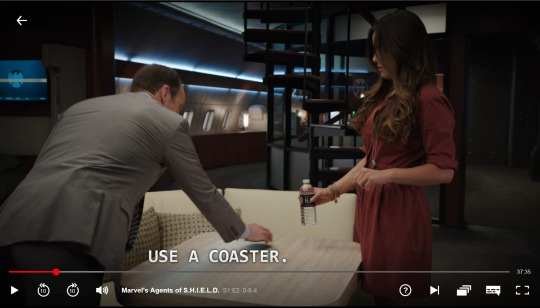
Only to have the thing completely wrecked over the course of the episode. In the denouement, “just starting to warm up to this place,” Coulson says ruefully, righting a broken glass as if that will put the plane back together; Skye immediately tosses a coaster down and moves the glass on top of it.

As a callback, it juxtaposes the starting-state and ending-state in your mind and highlights the contrast between the two. And it’s also a nice character-building beat where you, the audience, get to observe Skye’s character in that she remembers a trivial detail that happened to be important to Coulson. You also get to see Coulson observing the same, and you understand a little bit more about both of them. *chef’s kiss*
So this is a pretty powerful and common technique, and I guess you could say that any well-resolved narrative is by definition going to recall you to the specifics of how it started. Like ep 1 we start with Mike and Ace, their call and response “what are we/we’re a team,” and an understanding of Mike’s desire to be his kid’s guardian and hero and his desperate search for the tools that will allow him to become that. In the finale, we see the pay off where Ace (via Skye) reminds Mike of this motivation, and Mike is finally in the position to protect his kid by taking out the Big Bad.
But I don’t want to go through the list to demonstrate that everyone’s character arcs likewise left them in a thematically resolved position relative to where they started. Obviously this is an expectation of all (well structured) narratives.
(And I don’t really mean to talk about callbacks themselves, such as Fitz’s obsession with monkeys or May’s repeated demand of “don’t call me that.”)
Stuff that only comes up at the beginning and the end. Here’s the kind of symmetry that I mean:
Skye’s use of GPS encryption and the location of the diner where she first meets Mike. Both topics come up in ep 1, and are revisited in ep 20 when she’s stalling for time against Ward and brings him to the diner by telling him that it’s the GPS coordinates necessary for decrypting the drive. It says, last time you were here, Skye, you were living out of a van and fangirling over people with superpowers; now you’re an official agent of SHIELD (fun while it lasted, anyway) and you’re currently doublecrossing your own doublecrosser who was directly responsible for transforming you into the competent spy you are today.
Same thing: the only time we see Lola fly is at the end of ep 1, when Coulson and Skye are heading back to the Bus, and in ep 20 when Coulson rescues Skye from off the Bus.
Ep 2: 0-8-4. We’re introduced to the very first object with the titular designation, and Simmons idly wonders “imagine what it would do to a person.” Ep 22, it’s used to evaporate Garrett. Same ep, we also meet the little, what even is it, that dendrotoxin EMP (??? I don’t recall whether the gadget is named) that Ward uses, and Coulson uses it in ep 17 to incapacitate Garrett.
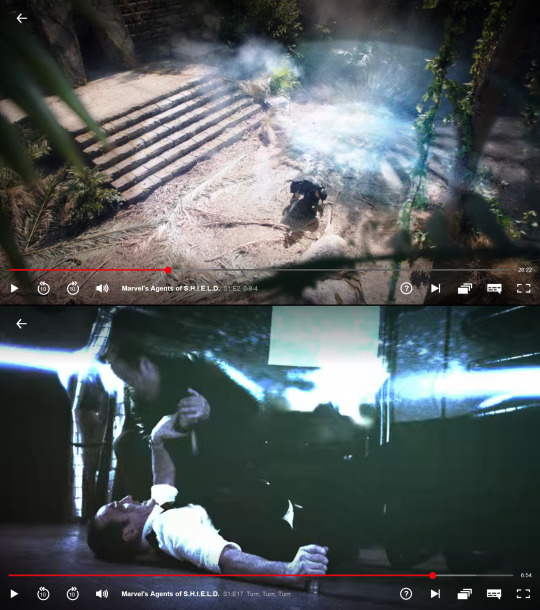
Similarly, all the cool alien gadgets we spent the first few episodes gathering and locking up, including that first 0-8-4, are all broken out into the wrong hands in ep 18.
Also in ep 2 we are introduced to the idea of being thrown out of the airplane and Skye & co specifically prevent Ward from being sucked out. We’re introduced to the concept of Coulson’s cellist! Fury also makes a cameo (”talkin to me about authority”) !
It’s a little later on, but ep 6 has Simmons jumping out the plane, and Ward proving his Good Teammate status by jumping out after her (while Fitz is struggling on his way to do the same). Ep 21, Ward boots FitzSimmons out the plane, and in ep 22 Fitz finally has the chance to properly save Simmons himself.
Ep 19 Coulson has a chance to save his cellist (again)
Ep 22, Fury comes back all Deus ex Machina and relinquishes authority of SHIELD directly to Coulson.
There’s also some dialogue recycled on purpose to make a point, like Fitz-Simmons introductory scene is recreated almost verbatim in ep 21:
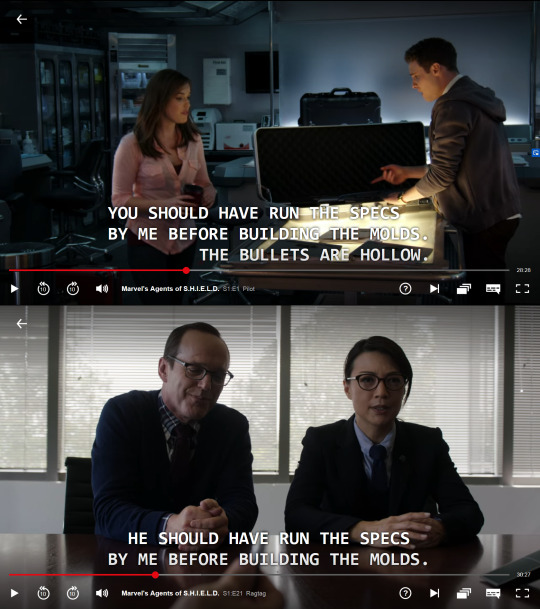
Ep 2, talking to Skye about his mission vs ep 18 talking to Raina about his mission
(gotta admit, the man took this role seriously. check out that cheekbone game he achieved in such a short time)
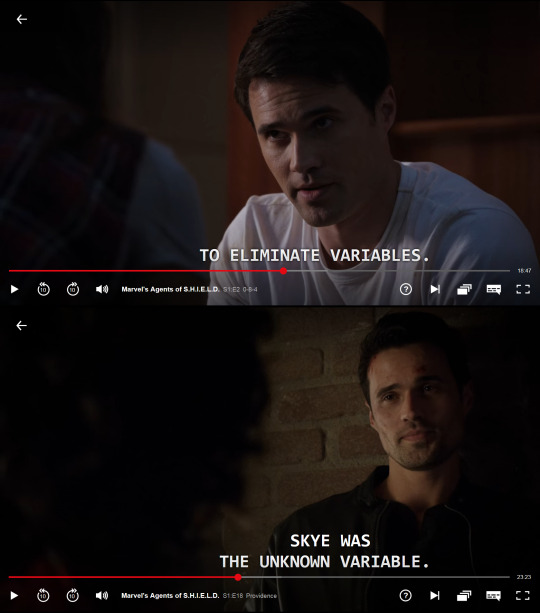
And again, Ep 1 Ward vs Ep 18 Ward. They even framed it the same!!

All this to say, Season 1 is Structurally Sound and it has my blessing.
Now let’s move on to the list of things I liked that surprised me:
It’s pretty well polished, visually. Joss Whedon’s veteran control of the director’s chair is readily apparent in the pilot, setting the visual tone for the series. There are some made-for-tv shots over the course of the season, sure, and the least impressive compositions tend to involve CGI backdrops, but they do make the most of their interior sets and work hard to dress up various LA locations to, er, inspire the idea of the international scope of the show. In my last update, I talked about ep 8 The Well in the context of Quality Directing, so it definitely goes above and beyond the basic shot-reverse shot when it wants to.
Ward. Just for the record, I think Brett Dalton is great at his job and really brought exactly what they wanted to this character. Eps 1 and 2 are a little shaky and stiff, but everyone’s performances are, as they let these characters coalesce around them. I remember not liking Ward when I was watching this live, and honestly I think this was intentional. He’s that character that you expect that you’re expected to like, you know, the traditional cocky savior type that lots of those fancy heroes are. But because he’s so tropey in his characterization, you’re just ... over it? And then when they flip the script and you’re supposed to hate him -- WOW. It’s like two Christmases at once. They took something you were already doing and rewarded you for it.
I’m not unaware of the “redeem grant ward” phenomenon. I’m aware that the character had fans who were honestly drawn to and appreciative of the character before that persona was revealed to be a lie.
And honestly, it’s not that I like OR dislike Ward at all. As a person. It’s annoying that he’s a cocky bad-boy. But it’s sweet when he plays nice with Simmons. It’s embarrassing that he and May have “a thing.” But it’s cathartic when he opens up to Skye about his past. And Then, the sequence where we know he’s Hydra but Skye doesn’t. And Then, the sequence where Skye knows he’s Hydra but he doesn’t. And Then, his weird yucky confusion where he still wants to pursue something with Skye or doesn’t want to put down puppy-dog-eyed Fitz.
As a character, Ward is a great character. His set up is so bland that the twist does appear to come out of nowhere, but on a rewatch all the groundwork is there. His characterization as a baddie is enthralling. I’m forecasting into season 2 a bit, but you want to follow his nefarious exploits just as much as you want to see his ex-friends smash his face in. Brett Dalton played it right, A+ good job. It makes Framework!Ward just that much more of a beautiful thing, to get to see what it would have been like if the Season 1 persona had actually been the man.
Also as covered in the last update, I was really very pleased to see how much character work was being done in this season. Because I only watch and rewatch starting from the second season, there are important plot points that I’d been grudgingly attributing to this season about which I’d forgotten the specifics, such as, what’s the deal with Gravitonium, howcome we hate Ward so much, where did they get that memory-torture-machine, why are you acting like I recognize Titus Welliver’s character? What surprised me was how much of a focus there is on character development as well. A lot of good origin story stuff, like how green FitzSimmons is and how soft and good-hearted Skye is and all the reasons we respect and trust May and all the reasons we would follow Coulson to the ends of the earth. Watching a found family start to put down roots is worth it, too, ten times out of ten.
The tie-in stuff wasn’t as overstated and stifling as I remembered it being. They were allowed quite a long leash even this far back. Centipede is based on Extremis, but helms a a unique narrative. The Asgardians-of-the-week are just MacGuffins for driving character stories. Turns out all of SHIELD has been Hydra all along! Sucks to be you, a show about the Agents of SHIELD ... oh wait, Daddy MCU’s insane twist is mirrored in the DNA of your team’s composition AND baked into your overall season arc? Well then. Carry on!
Engaging with Season 1 explicitly as a prequel is a powerful thing. First time through, I had the distinct realization that “too much of a good thing” was at play regarding Coulson. He’s everybody’s favorite MCU character in 2013, hands down, but ... getting intimate with him for 40 minutes a week really waters down his mysterious G-man appeal. BUT. After spending six+ years with the man, Season 1!Coulson is a precursor to the 3-dimensional Director you’ll fall in love with, rather than a distortion of the one-liner MCU!Coulson you thought you wanted.
So what’s next! Absence makes the heart grow fonder, and here all all the things I associate with AoS that were not present in Season 1:
Robot hand.
DaISy JoHnsOn
AGENT/DIRECTOR MACK where is he I need him
Fitz’s facial hair
Their underground SSR base with the exposed brick, I miss that place all the time
Hive, Bobbi*, Hunter, Kyle MacLachlan, Maveth (everything** about Seasons 2 and 3, really). Robbie Reyes. Aida and Kasius!! I know these things are temporary, but they’re so important to the best bits and I love them.
Getting to see episode after episode where there are scenes at a time containing a majority (up to 100%) of women and/or POC characters with executive agency, and none of those characters are token or temporary but were placed there with intent to normalize a diversified cast.
My absolute favorite episode of all time, 4x15 Self Control.
Things I am not looking forward to:
**Lincoln. I’ve seen these seasons four times and just now I had to google his name because I wasn’t sure it wasn’t Logan. He’s garbage and I’m glad he’s dead. Other opinions are available.
Misc. Thoughts
*I said I wouldn’t name names but Adrianne Palicki is a C-lister who can swing a B+ if the stars align. I love Bobbi, though, especially the way the character’s reputation precedes her, how her adorableness complements her badassness. In fact, the character’s a great foil to May, who is also a badass lady and S-tier agent but has a completely different approach to being those things. Bobbi’s a reminder that badassness and aloofness are not correlated at all. Also there’s a headcanon out there that she’s non-binary (one of the reasons she prefers Bobbi over Barbara) and that is a concept I can get behind. Bobbi’s perfect and I’ll fight you if you don’t agree.
Poor Trip!!!!!!! When you always start from Season 2, he’s really just a flash in the pan, there and gone. I’ve always been like, “well, he didn’t really have a home here, no carved-out niche, so I guess getting Coulson’d and becoming something to avenge is the best a character like him is gonna get.” But now that I see that he comes late to the game as a literal stand in for Ward, his story is that much sadder. He was never intended to BE a character. He’s introduced with Garrett as a pawn/distraction during this arc’s who-is-Hydra shell game, he’s kept to demonstrate what kind of friend and agent Ward should have been, his defining character trait as a gentle flirt only serves as a catalyst for Fitz’s coming to terms with his feelings for Simmons. The poor guy is just a walking plot point, up until the bitter end. :<
I had entirely forgotten and/or never tracked the fact that Fury put together Coulson’s team specifically to monitor him after project T.A.H.I.T.I. I’d forgotten the distrust Coulson has for May after he perceives that she has betrayed him by being a part of this. It’s a season-specific reveal that is literally never mentioned again. It’s important to the fabric of the narrative of that particular arc, offering up May alongside Ward and Trip as fodder for the aforementioned shell game, but the true inciting incident of this entire show just gets swept under the rug and ceases to matter. I’m kind of :/ about that.
When you’re bi and non-binary, you’ll get a lot of mileage out of wanting to be/be with Daisy and/or Fitz, don’t judge me
In conclusion, Season 1 is the opposite of literal garbage, Agents of S.H.I.E.L.D. is my favorite show and my favorite MCU movie, Daisy Johnson is my favorite Marvel superhero (not related to Season 1 but still true), and nobody had better spoil Season 7 for me pleaAAASE don’t let it happen.
2 notes
·
View notes
Text
Why Oscar’s writing has been disappointing
Stories rely on their characters. You can tell a grand, sweeping narrative that spans continents and timelines but if you don’t give a rats ass about the people at the center of these events, viewers won’t care. Stories with high kill-counts like Walking Dead, Game of Thrones and Attack on Titan rely on audiences forming an attachment with characters very quickly, so that the possibility of their sudden death is all the more painful for the viewer. Long story short, if you can’t make an audience care about your character, it can be hard to keep them interested.
RWBY has overall done a fantastic job at getting people to fall for its cast; I’m a case in point with how hard I’ll go to bat for Emerald and Mercury. But be it the obvious choices in the main cast, the wide array of villains to obsess over. The fandom even has a few eccentric folk who stan for people not seen in years! (shoutout to CFVY fans, who knew you’d get rewarded over the whole Coco in Chibi thing by getting a book?) But rather unfortunately, while one character has managed to earn a fanbase happy to see them get content, the writing has consistently failed one particular character, through constant refusals to allow them the screentime they deserve and often putting it in the wrong places when they do get morsels of time to shine each year.
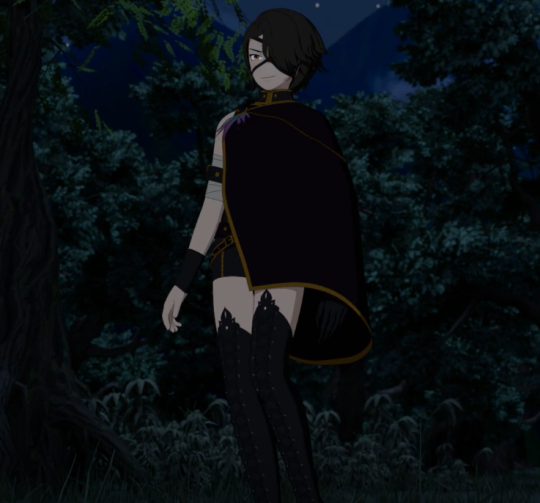
Oh no, not you. I’ll get back to you before this hiatus is out.
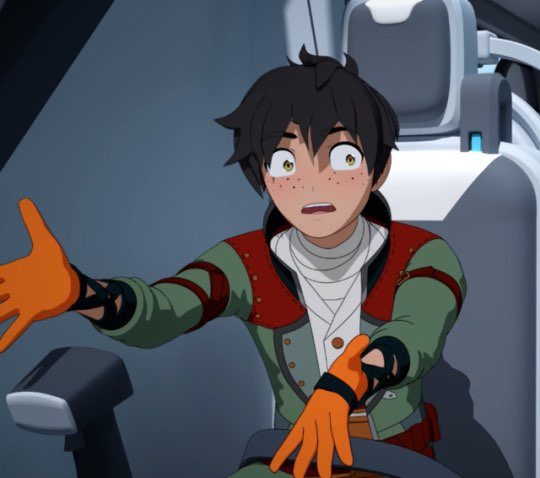
... actually why are his gloves orange of all colors? And what’s with the banages, is he planning on cosplaying Dazai from Bungou Stray Dogs at an Atlas convention during the off-season?
Yeah, no, I’m talking about Oscar Pine. First introduced in Volume 4, Oscar has now been a part of the main cast for half of the show’s runtime. In that time Oscar has developed psychosis, met a ticket-punching man, got stuck in a house for a month, fought a teleporting staircase man, was involved in a train crash, bought new clothes, and stole military property.
Notice something? Nothing in there mentioned Oscar getting character development. Or rather he does... but it’s always offscreen. Oscar is infuriating in the sense that he has a lot of wasted character potential to be one of the best characters in the show- a simple but efficient design, great voice work from Aaron Dismuke and a charming personality that makes him a likable hero. But in spite of that all, Oscar constantly get the shaft when it comes to his screentime showing him developing from his problems, and each volume so far has had Oscar be faced with a trial that would make for a truly fascinating character arc, only for him to get over it while the camera’s focused elsewhere. And that’s what I’m going to focus on in this essay- I’m going to go over why I think Oscar’s writing has been consistently mishandled, and my hopes for the character in Volume 7.
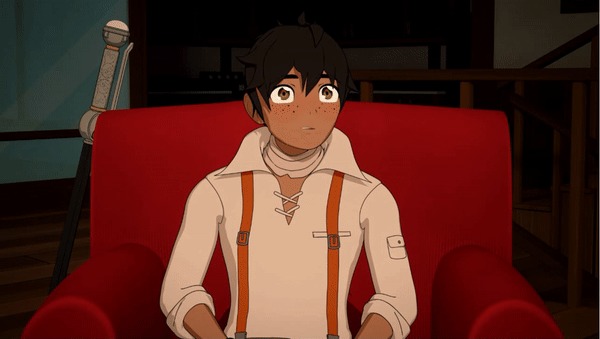
God damn I don’t like doing this, I want to like the farm boi most of the time
1) Volume 4: All these voices running through my head, I’m on fire, face burning red
Oscar is introduced very early in Volume 4- as in, he’s in the first episode and is the eighth character we see onscreen after the villains. Oscar is in fact, if you don’t count Ruby’s character short, present in Volume 4 before the title characters. His first episode is... a lot of nothing, mostly just Oscar doing some farming. Oscar’s introduction does a good job telling us a bit about his character without him saying much- he’s prone to daydreaming while working on the farm, clearly not enjoying himself and his work. It matches up with what we learn later, that Oscar dreams of becoming a hero. It’s a stock motivation, and a stock background, but a simple and effective way of setting up a hero who desires the chance to prove himself in the wider world. His intro scene is a nice, quiet beat between the dark opening of Evernight and Salem, and the more frantic action of RNJR fighting the Geist. But overall the time the fandom was wondering what was up with Oscar- he wasn’t in the OP and nothing had set him up before now and yet here he was, getting focus before the main girls.
It takes until Oscar’s second appearance, three episodes later in Family, that we get the real reason for his importance- Ozpin’s in his head, but it would take another three episodes, in Punished, for this to be elaborated on in an unintentional Christmas gift from Rooster Teeth; Ozpin’s in his head due to their Auras and souls merging thanks to Ozma’s pact with the Archangel Asshole a few centuries back, and now Oscar is starting to act like an Assassin’s Creed character with all the memories that are in his head that he didn’t create. It’s a cruel irony for Oscar- Ozpin plays on how Oscar wants to be more than just a farmhand to try and get him to go to Mistral, but Oscar’s body language and face make it clear that this wasn’t how he saw himself getting some new life choices. Rather tragically, Oscar finally gets the chance to be part of something bigger but the manner in which it’s offered to him is anathema, as it’s coming from a literal voice in his head who claims to be a dead headmaster, and more importantly, he was never offered a choice- this was thrust upon him, a young 14 year old child who never asked for this burden of responsibility. And the last shot of Oscar in this episode already has him cracking under that burden, stuck on his knees and unsure what to do.
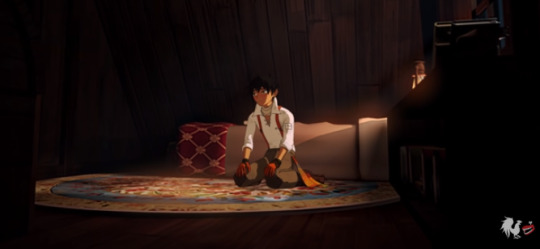
(also btw Oscar’s Aunt tells him to clean his hands but Oscar’s model has gloves on all the time, so... how would he clean his hands? Or does he read books with dirty gloves? Eww)
It’s an interesting place to leave Oscar, at the metaphorical and and spiritual crossroads, and means the viewer wants to see Oscar’s next actions and the deliberation between the easy, boring life he knows or risking everything on a voice in his head telling him to try his chances in the big city. Sounds pretty interesting, right?
Not to the writers, unfortunately. Because when we next check in with Oscar three episodes later during Kuroyuri, Oscar’s already on the road to Mistral with his backpack all ready to go. That deliberation, the consideration, Oscar eventually choosing to trust Ozpin and go along with his plan? All done offscreen. Similarly, Oscar goes from treating Ozpin’s voice as an irritating thing to be annoyed has been chucked out a window- now out on the open road, it doesn’t “feel crazy” anymore. It just feels like such a cheap way to handle Oscar’s writing- rather than show his development naturally, it just fast-forwards until it reaches a point where it skips all that. And unfortunately, this isn’t the first or last time Oscar is victim to the writers fast-forwarding through his development moments. Given how much of Oscar’s arc hinges on this crucial first step, it just seems inane to me that of all of the potential Oscar scenes to cut... him coming around on Ozpin and making the call to leave was what got the cutting room floor. Especially since nothing in his Kuroyuri scene was all that essential for Oscar in contrast, barring setting up the the mystery Hazel and Ozpin’s past.
Oscar doesn’t appear again after his encounter with Hazel until the finale, when during the montage of Ruby’s letter (that consists of half her dialogue this season) we see Oscar on the train to Mistral, which really only caused a problem thanks to all the people who used it to ask why RNJR didn’t take a train. He also appears in the post-credits scene, meeting Qrow at a bar and asking for his cane back, the volume ending on Oscar extending the cane experimentally.
Being blunt, I feel like Oscar should have been cut from Volume 4 and just introduced in Volume 5 with the bar scene. Volume 4 already had to juggle far too much in RWBY and Cinder’s plots, and adding Oscar to the mix unfortunately meant the screentime for some characters had to suffer- especially Yang. His time this season ultimately goes nowhere and only gives him a basic background that most fans would have already guessed from his character design, and the already wobbly Jenga Tower that was Volume 4′s screentime didn’t need more blocks thrown on top. I like a fair few things in Oscar’s arc, but it’s content that ultimately I’d have been fine having left on the cutting room floor. Hell, if nothing else, Oscar’s first scene should have ended with Ozpin’s reappearance, that these are two separate scenes is mind-boggling and left the fans wondering what the hell was Oscar’s purpose for weeks.
Oscar’s debut arc has its ups and downs, much like the volume itself. His intro scene and argument with Ozpin are both well-executed and show the viewer the vocal dynamite of Dismuke’s performance or just set up his base character, but for every good thing to come of Oscar’s arc, it’s fraught with issues- most notably, his scene of choosing to leave his home being omitted and beginning the unfortunate tendency for Oscar to get the short end of the stick when it came to development and agency, which undermine his choice to leave. But overall, Oscar built himself a small but dedicated fanbase with his debut volume, even immediately shooting up to become a potential target for Ruby’s affections in the fandom shipping wars. It was a rocky start, but surely now that Oscar was going to have his plot merged with RNJR, he’d be able to handle his screen-time more effectively, right?
Right?
Volume 5- Two for one on meatsacks
Volume 5 is Oscar’s worst volume so far, being blunt. It’s a lot of people’s worst volumes though (Cinder, Ruby, Weiss, Mercury, Adam, mine) that at least he can share the load. It doesn’t help that he’s not in half the damn thing because his body is being used by Ozpin to regale the audience with expositon that makes them actively yearn for the sweet embrace of death... or just the return of the World of Remnant shorts. Oscar’s first scene in Volume 5 is just a recycling of the Volume 4 post-credits scene, which raises the question of why the scene was used in Volume 4. I don’t think it’s even touched up, they literally just copy-pasted it. Much like his first scene in Volume 4, his intro scene this volume is intercepted by comedy relief- last time it was Jaune’s miserable attempts at being a strategist, this time it’s Drunkle Qrow.
... You know, this scene ages poorly in hindsight given how just one volume later Qrow’s alcoholism is treated with ice-cold severity.
Episode 3 follows up on this and gives us Ozcar’s first major scene of the volume, and unfortunately also sets up their dynamic this volume. Oscar gets some awkwardly charming moments with Ruby but overall the scene is dominated by Ozpin taking over for the first time and explaining his reincarnation powers alongside setitng up RNJR’s plot for the season- “training.” An episode later sees the entirety of this training, with Oscar and Ruby engaging in hand-to-hand combat and Oscar getting a lore dump from Ren (in hindsight this is novel not just because they’re outside during it but Ren’s the one delivering the infodump and not Ozpin). Ozpin barely even factors into the episode barring some fisticuffs and a generic speech at the end. But the scene is overall just pointless to the narrative beyond loosely setting up Jaune’s own Semblance unlocking, and this is the last we hear of RNJR “training” for the upcoming trials at Haven. Hell, even though the story makes a point of noting Oscar still hasn’t unlocked his Semblance, that still hasn’t come up two years later. This scene really only pays off in one immediate way:
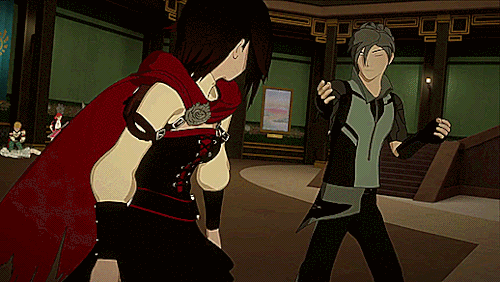
This is Ruby’s sole contribution to the Battle of Haven after getting KO’d by Emerald outside of just yelling orders for offscreen fights, and all this helped do was begin to convince people that “MERC’S A BAD FIGHTER WITHOUT EMERALD.”
Lighting the Fire’s training scene is one of Oscar’s only major scenes where he interacts with RNJR to boot for the entirety of Volume 5, and it’s quite sad that nothing really comes of it. It just serves to highlight how little Oscar interacts with the other kids, as most of his dialogue this season is just as Ozcar.
Necessary Sacrifice then, should be great on paper. It’s an entirely Oscar and Ruby scene with Ozpin only chiming in at the end. It has Oscar confronting Ruby and himself on his fears and how Ruby can put up a brace face, and Ruby finally gets to open up a little about losing Penny and Pyrrha at Beacon. But the scene just falls flat on its face and botches the execution. Putting aside Ruby’s own problems in this scene (her speech feels incredibly pre-rehearsed, as if she spent hours practicing it in the mirror to ward off anyone actually prying into her life). Oscar’s anger and fear come out of left field with nothing setting this up in his prior scenes this volume. Ruby needed a scene where she talked about losing Penny and Pyrrha, but it should have been during Volume 4, with Jaune. Having it now with Oscar feels like the writers apologizing for having Ruby get shafted for screenitme during Volume 4... during the volume where she gets shafted by literally everyone else. The scene is frustrating to me, it could and should have been a lot better (musically at least I love the reprises of When It Falls and Lets Just Live), but it just feels like a hasty patch note. Oscar doesn’t really develop from the situation and his fears are just forgotten for the rest of the volume.
Oscar then proceeds to basically sit out Volume 5 barring Chapters 11 and 12. I still don’t get why he wasn’t part of the dinner scene with RWBJNR, since it would have been so very easy for him to be part of the dinner and get the chance to interact with the rest of the kids. Oscar wants to be a hero, so let him... actually interact with heroes his age. Have him brought up to speed on the crazy adventures the team have, let them get to interact with Oscar without having to deal with his backseat driver. You could even make something tragic of the scene where Oscar is forced to go away so Ozpin can take over, and the team’s faces fall flat when Ozpin gets right to talking shop which leads to the YOU TURNED THEM INTO BIRDS exchange. But otherwise, the rest of the House scenes revolve around Ozpin talking. The kids talk past Oscar, and again, you can very easily make something tragic of that as Oscar could grow to resent Ozpin because none of the others see him as himself, just a puppet on strings. But again... Oscar’s just not allowed to develop onscreen in this show.
And perhaps the worst thing about all this is that whenever Ozpin actually is called out on his tactics, one of the most pressings ones in his possession of Oscar,a 14 year old boy, is never used as fuel. Granted, yes, Ozpin has no control over who’s his next host but surely someone, somewhere is going to opine how morally bankrupt it is that Ozpin essentially conscripted a child not even old enough to get a learner’s permit into his eternal shadow war. It’s times like this that my theory that Jaune was going to be Ozpin’s original replacement before the backlash to Jaundice made them backtrack looks more and more possible.
The Haven Battle episodes quickly have Ozpin force control away from Oscar, but it’s not like Oscar did much before then anyway other than serve as the conduit for another lore dump on Hazel’s backstory. He doesn’t try and learn why Leo defected and manages to trounce the headmaster so well one wonders how the hell Leo got put in charge of a combat school. After that, Ozpin takes over (and we admittedly get some of the coolest fighting in the actual Battle of Haven in Ozcar vs Hazel) and Oscar only briefly returns in the last seconds of the finale to drop the sequel hook that they need to get the lamp to Atlas.
Volume 5 is just a bad season for Oscar- this is the one time we don’t get his eternal phantom of offscreen character development because it’s not fair to say Oscar has any development in Volume 5. He’s immediately forced to the back to serve as a projector through which Ozpin can put the audience to sleep, most of his actual scenes are irrelevant or just feel like a waste of time and he basically sits out the entire finale. It’s just infuriatingly incompetent writing- we’ve gone from Oscar being a waste of time in Volume 4 to just being a waste of a character in Volume 5 who barely gets to express himself. Little is done with Oscar that could not be achieved by putting a tape recorder beside a lampshade and calling that Ozpin’s new host. Volume 5′s bad for a lot of characters, but at least most of the rest of the cast had good seasons beforehand to show how well they could be handled or written. Oscar didn’t have that, and while ultimately the blame was placed more on Ozpin for hogging the time, Oscar’s critics began to grow and he was derisively seen as just a plot device to let the writers bring Ozpin back and serve as a mission marker for the heroes. One more bad season for Oscar could spell the end to his character ever having a warm reception among the fans and critics. Drastic action would need to be undertaken in order to regain trust in Oscar.
3) Volume 6- Tossing out the baby with the water
So the big plan to give Oscar some screentime... was basically cut Ozpin out of the story entirely. Oscar is almost entirely himself after the fourth episode, it’s the longest run of episodes with Oscar as himself that we’ve gotten in the show to date and Ozpin doesn’t even surface until the finale. There’s a lovely line of Oscar’s in episode 4 that finally lets him address some of the fears and concerns he should be rightfully worried about- “I’m just going to be another one of his lives, aren’t I?” Oscar’s tone is just so bleak there, it works super well and it was nice to finally see Oscar expressing human emotions. It even my cynical heart hope that Volume 6 would finally see Oscar get the limelight he had been denied for two years running.
But then the ball is just dropped hard. Oscar’s left in a background role for the Brunswick episodes, stuck working on a tire while RWBY encounter the Apathy. What’s already a somewhat rushed resolution to the whole plot of “RWBY express concerns about going onward to Atlas in light of Jinn’s revelations” now leaves Oscar, the guy carrying Ozma’s soul in him, out of the moment. He just gets to be tired and tell Blake to make food if she’s hungry.
Argus at least alludes to putting Oscar in the driver’s seat for his own solo arc where he explores the city alone after Jaune physically assults him (why didn’t anyone stop Jaune from hurting Oscar two people saying Jaune’s name with all the concern of someone stubbing their toe just feels cheap). Even though I was cold on the episode as a whole, Dead End did set up the wonderful idea of an Oscar episode, one where he maybe forces Ozpin to come out so they can talk frankly for the first time in two volumes. Maybe they could even rip off Avatar (some more) and have Oscar meet Ozma himself, using his conversation with the two as his own chance to rally onwards and decide to bring the fight to Salem. It could have been a really sweet moment of him backing Ruby up in her desire to keep going, the two forming a mutual bond of bolstering each other’s hopes as they carry the burden for their team.
But no. Because I can’t have nice things, in an otherwise near-perfect episode where I actually got Mercury and Emerald screentime and the lovely Pyrrha statue scene (which I low-key feel like Oscar should have been a part of but that’s a subject for another day), Oscar just gets over his issues, buys a new outfit and dodges past his problems, getting to develop past them, off-screen, for the third time in a row.
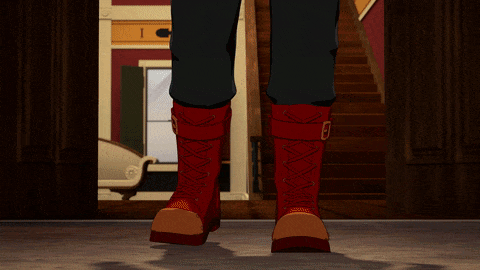
As far as I care, Oscar stole the money for this costume from either Qrow or Jaune and I don’t care if Miles says to my face he earned the money legit, I’m keeping that headcanon. Also, why are his gloves still orange? They don’t fit the rest of his costume.
If there was anything that got cut from Volume 6′s final half, I’d bet money on it being Oscar’s solo arc. Kerry himself has admitted during the RWBY Rewind for the finale that stuff got cut, and it’s very likely (going off comments from Miles that The Lost Fable was a huge resource drain) that this content was going to be part of the entire episode that was cut (Volume 6 initially had 14 episodes but around Christmastime this was remedied down to 13). It’s actually downright insulting and infuriating that Oscar got the shaft again, especially when Volume 6 finally seemed to be addressing the issue of Oscar never getting growth or focus. He was free of Ozpin, and with Ozma’s history revealed it was the perfect time for him to embrace the past forced upon him and resolve to become a hero. But no, the episode count went down so we had to wave goodbye to Oscar’s agency again.
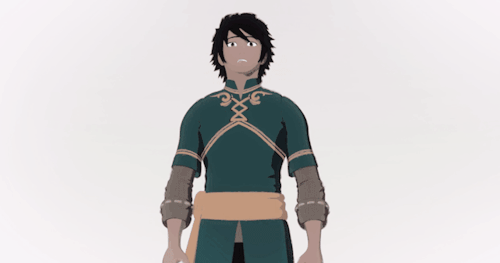
Just think of how beneficial it would be for Oscar to actually confront his sorta-not-really ancestor, who may have had to watch as soul after soul gets consumed for him. Has Ozma ever had someone tell him none of this was his fault? I feel he needs it.
If I was a more suspicious person I’d say it almost feels deliberate, that someone on the writing team doesn’t like Oscar and is purposefully keeping his growth offscreen out of childish spite. But three volumes in a row now, Oscar’s growth has felt artificial and fake, and leaves him feeling like an afterthought. I know it’s not a problem of RWBY not being able to write new characters well, just look at how fleshed out and beloved Maria was after just her debut season. But Oscar just can’t catch a break and it’s frustrating to watch. In a volume that otherwise made huge strides in solving many of the pre-existing issues in Volumes 4 and 5, that 6 still refuses to treat Oscar with anything other than mild apathy is just mind-boggling.
Like, what was even the point of having Jaune say Ozpin was just pretending to be Oscar? To make Jaune look irrational? To plant the red herring in the viewer’s minds? The rest of the volume itself shoots the idea down hard, and it feels like it was going to be used during Oscar’s potential cut scene, but again... it was cut. I can only go off what’s in the volume and unfortunately, Oscar in Volume 6 is only marginally better than he was in past Volumes. Bless his heart, Aaron is trying to save this character but the writing itself is dragging Oscar down every chance it can get.
4) Volume 7- The potential breaking point
Oscar’s character is currently in a make or break spot, and Volume 7 will either finally solve his growth issues or this will be it and his fandom will reach a boiling point. The worst thing is, it’s a very easy solution to fix Oscar.
Just put his character development onscreen.
That’s it, the golden answer to all of Oscar’s problems is to just stop cutting his development and agency short. Oscar has potential to be the most tragic character in RWBY- someone who wanted to be a hero, only for the responsibilities to be forced on him without his consent. He’s someone who the rest of his companions oftentimes don’t see as a person, just a walking telephone to their boss. Imagine how dehumanizing it would be, especially after Qrow’s “Don’t lie to him, we’re better than that” line? Imagine being someone effectively living on borrowed time because sooner or later, your consciousness will be absorbed what makes you you will be but a distant memory? Oscar could easily be a shining example of character growth, he could easily have a great arc of learning to deal with the burdens of Ozma’s struggle, of being the target of Hazel and Salem’s ire when he did nothing to earn it. But it needs to be soon, or all the potential in the world won’t be able to save Oscar.
Perhaps Volume 7 will have a flashback to Oscar in Argus having that confrontation with Ozpin and getting his new outfit. Perhaps Ironwood will be mistrusting of Oscar claiming to be Oz, and Oscar will have to step up and prove he is who he says he is. Qrow never apologized to Oscar for punching him, so an apology would serve both Qrow and Oscar’s arcs as Qrow reignites his spark to fight. A potential confrontation with Salem where Oscar may try something the previous Oz lives didn’t could work wonders for Oscar. Volume 7 could still easily have Oscar get spotlight, but with how many plates the season is already planning to spin (Tyrian and Wattts going to Atlas, Cinder and Neo going after Ruby, Weiss dealing with her family, Ruby learning about the Silver Eyes with Maria, a likely return of Faunus racism for Blake and Yang, Atlas class warfare, the token reminder that Pyrrha died so Jaune, Ren and Nora can be sad, etc.) I’m already accepting that Oscar is the most likely candidate to get the boot again. It’s happened before, and I try to avoid being a sucker who falls for the same thing over and over. Definition of insanity and all that.
5) Conclusion
Oscar is... I hate to say this again, but infuriating to me writing wise. He has so much potential as a character in terms of his growth but despite having had main character status for half the show’s runtime now, it’s hard to really care. Oscar keeps getting the short end of the stick, and if it turns out that the whole reason he got shafted for years was because of M&K’s mystery fetish, I might actually throw a chair out a window.
What makes it worse is that Oscar is not a character with no hopes of being salvaged! There is a very easy way to remedy the problem and it’s just to let him have his time to shine and develop offscreen. Flashbacks covering the lost events such as his leaving his farm or gaining confidence in Argus (or even giving Oscar a character short specifically to address these issues) might be belated and feel like damage control- let’s be fair, after Adam’s short this wouldn’t be the first time they resorted to doing damage control in their shorts- but it would be a step in the right direction and show the team are committed to working to salvage Oscar. But they want to do it, it has to be now. If Oscar leaves Volume 7 suffering from the same problems, he might as well get killed off in Volume 8 because that will be it for his character, no one will defend him and Oscar will fully become the heroic Cinder in that no matter what, you can rest assured they won’t get onscreen development from anything that happens. In the meantime, all I can do is hope that this time, things will work out for the farm boi. There’s a goldmine of a character here guys, someone’s just gotta put the work into finding the first nugget.
In short, Oscar can be a great character, if the writing lets him become it onscreen. But until then, it’s going to be a frankly depressing journey to get there.
Thank you for reading.
#rwby#oscar pine#ozpin#ruby rose#rwde#rwby analysis#ozma#salem#james ironwood#hazel rainart#aaron dismuke#rwby4#rwby5#rwby6#rwby7#jaune arc#qrow branwen
153 notes
·
View notes
Text
Persona (1966) | Directed and Written by Ingmar Bergman
youtube
(preferable trailer over original from Austin Film Society)
Film Intro and Purpose for Page
Heady Times = Heady Films!...and we’re all wearing masks right now, literal and metaphorical.
To start off my new page I’m going to begin at the tippy top with Ingmar Bergman’s Persona, the “Mount Everest of Film Analysis”, which has been described as creating even more contradictions when trying to analyze it.
It was made in 1965 in Sweden and is commonly in conversation as one of the greatest films of all time.
Bergman died at his home where he filmed Persona on July 30, 2007. This was also my first day ever to visit Los Angeles, right before moving here the following month. I remember seeing it on the LA local news while staying at a beach hotel with my Mom. I don’t know how I remember it so clearly but I can see that room now, in my head, and the news anchor looking into the camera.
It’s also worth mentioning that Michelangelo Antonioni, the Italian filmmaker, died on the same day. Two giants of cinema.
I rewatched Persona late last night and took a copious amount of notes. I first saw this film 7 or 8 years ago and then twice recently. This entry will be more lengthy than future ones because I naturally felt the need to be more specific with this particular film...I wanted to have a fighting chance at semi-understanding it.
I will only look something up if absolutely necessary for factual purposes. Although (full disclosure) the “Mount Everest of Film Analysis” title was taken from the first paragraph on the film’s Wikipedia. This was before I decided exhaustive searches about film historians’ perspectives would just be too much for these posts. Instead, I will focus on my unique thoughts and perspective about the film and what I feel is valid.
After filling my head with Persona I went to bed. I then dreamt that I was in a writers’ room with filmmaker Paul Thomas Anderson (who is one of my favorite filmmakers and will turn up on this page soon). We began talking about his film The Master. I remember feeling frustrated in the dream that I couldn’t think of anything clever to say about it in front of him. He told me that films sometimes just fold in together in unexpected ways, almost by luck. This prompted me to finish his sentence by saying that films sometimes generate these unplanned illuminating interpretations that are endless. He agreed with me, which felt good, even though in reality I was speaking for Paul because he was just a character in my dream...or possibly something outside the grasp of my conscious mind spoke for him/me.
So why start with Persona?
Why start this page??
Because I am fascinated by the mystery of great films and believe there is transformation and understanding when one attempts to decipher "works of art” like this.
Plus, it’s fun for me and a rewarding challenge to complete.
Mulholland Drive was my big bang moment (influenced by Persona) and I have been hooked on digging into these type of films ever since.
I’m also a filmmaker that has been working on a Short for the past year (which has been grueling) and feel I can improve my own filmmaking abilities by breaking down these masterpieces in my own words.
My goal is to attempt not to stray too far from what is objectively being shown while also using my own knowledge of what I think the filmmakers are trying to say...or, even better, DIDN’T know they were trying to say. And I’m sure writing about the metacognitive nature of this particular film will reveal a lot about myself, which is what great cinema inspires.

Enigmatic Opening
The film fades in and we are inside a film projector. Images begin to flash quickly and chaotically. I will mention some below:
-A penis.
-An animated female character upside down that eventually holds her breasts.
-A silent era movie chase scene of a skeleton coming out of a chest, and then dracula chasing a man in his pajamas. He fearfully jumps in bed and throws the covers over himself. Is it just a dream?
-A closeup of a sheep being slaughtered, bleeding out.
-Screen flashes white to a shot of Jesus’ hand being nailed to the cross, which to me resembles the tarantula that flashed earlier.
-Cuts to a quiet forrest, then sharp tops of a metal fence and next a dirty snowpile in front of a building...
Why are we being shown this?
I believe this opening operates like a dream. Are these images preparing our unconscious for what we see later? It’s impossible to know exactly unless some detailed external commentary is given. I remember reading Roger Ebert saying the sequence was Bergman stating he is creating a new type of cinema, expressing this by starting in the projector and ending in the projector. This never crossed my mind while watching.
-An old woman dead on a table possibly in a morgue, then a man.
-A phone rings. The dead women suddenly opens her eyes.
-A boy opens his eyes, waking up. He puts on his glasses as the phone continues to ring and opens a book and begins reading. He then looks into the camera at us (a motif for certain moments in the film, especially for Elisabet).
-Next, a reverse shot which reveals he is looking at a screen that covers the wall. It’s a striking image as the music crescendoes. The screen reveals what looks to be an unrecognizable woman that keeps blurring and morphing. The boy touches the screen in a way that I interpret as yearning.
Then it becomes clear the women’s faces on the screen are the main characters that we will soon meet and spend the film with, Alma and Elisabet. Their faces are blending into one another, but it is still not extremely clear. I had to go back and rewatch this part to verify if it was actually them.
“Not extremely clear” is a theme throughout the film. Who is who? What is a dream and what is not? This motif of faces and masks. Insecurities about what to show and what to hide, which I think was my main, simplified takeaway from the movie after the first watch.
Predeterminism is also something that keeps popping in my head after watching. Alma cannot hide from Elisabet. Elisabet always seems to know at key moments. The Conscious cannot hide from the Unconscious.
The Swiss psychologist Carl Jung was a large inspiration for this film and the term persona is his term in the context aligning with the film.
Then the title page quickly flashes, along with the boy in glasses again, then the two main female characters, all in individual closeups.
This film is shot in 4:3 aspect ratio, which is conducive to faces and the two female characters have amazing faces with the help of the naturalistic cinematography of Sven Nykvist.
Below is a couple of quotes I found beautiful by Bergman regarding the human face:
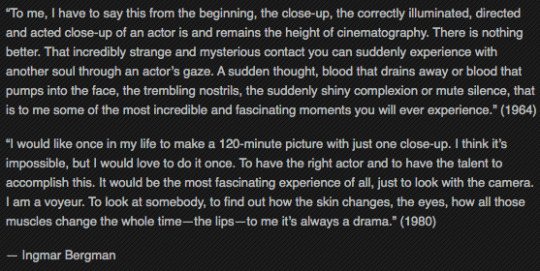
The music is amazing here too at the opening...percussion and xylophone with chaotic crescendos, which seem way ahead of its time.
And is this boy shown, Bergman himself?...putting on his glasses, with childlike curiosity, yearning, awakening to this experience of making this novel film and what it will tell him?

Alma and Elisabet Meet
We are at a hospital. The Doctor informs the Nurse, Alma, that the patient, Elisabet, has stopped speaking. She is an actress that became mute in the middle of a performance on stage playing Electra and has continued not speaking for 3 months.
(”Electra Complex” is a Jungian term that is the female version of the Oedipal Complex.)
Alma anxiously enters Elisabet’s room and introduces herself saying she’s 25 years old and grew up on a farm in the country. Elisabet looks away.
Alma later tells the doctor in the hallway that she can not help her and “may not be up to the task mentally”.
In my opinion, Alma’s insecurity with her mental faculties is a huge part of the film, possibly because she’s unaware and/or unwilling to see her full Self.
Alma goes back in the room and blurts out that she doesn’t understand films and theatre but has great admiration for artists and is impressed by Elisabet, who then embraces her. Elisabet possibly needed this validation.
Alma soon leaves the room after turning on the radio with symphony music. A closeup of Elisabet reveals how deeply she feels this music. Liv Ullmann (actress playing Elisabet) has such deep eyes that are able to convey so much as tears subtly well up. She eventually exhales and turns away from the camera and radio.
These moments occur with Elisabet throughout the film where she shows this sensitivity and understanding of something outside of the sphere of what is going on between Alma and herself. For example, soon we see her in the bare hospital room (beautifully and minimally lit) reacting to news coverage of the Vietnam War. The TV shows a monk that has set himself on fire in protest. This backs Elisabet all the way up into the corner of the room, gasping with her hand over her mouth and in closeup it’s evident she feels so much of what’s she’s watching...and I felt it deeply too.

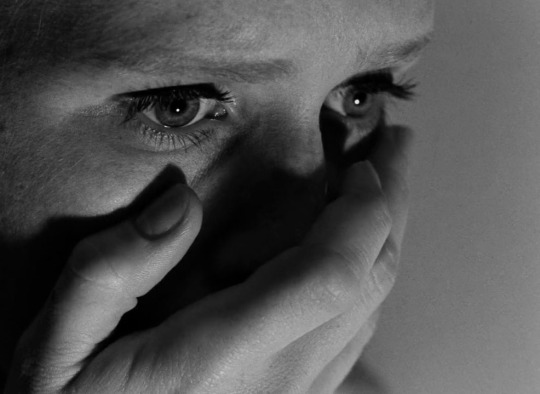
In the scene prior, Alma is shown sitting on her bed in her nightgown (possibly talking to the camera first, then herself) about how she will get married, raise her kids and how everything is “decided” for her, predetermined.
Several phrases that she uses during this self-assuring scene:
“It is inside of me”,
“Already written”,
“I don’t even have to think about it.”
Which to me, is a stark contrast to who Elisabet is...a mother who has left her family, who does not accept her reality and who wants more.
Yet, Alma now is sleepless also, sorting this out aloud, as if coming back into herself because Elisabet has perplexed and disrupted her. Elisabet fascinates her. She admires Elisabet. Elisabet has introduced this mystery into Alma’s life now and is living in her thoughts.
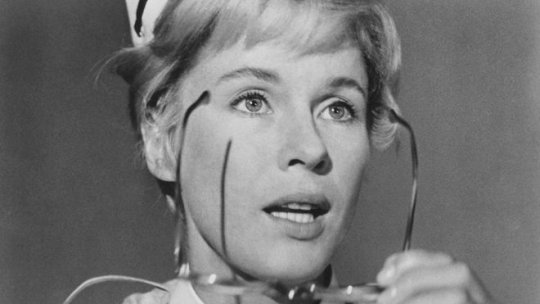
The Doctor Speaks to Elisabet
I’m not sure what others have said about this scene, but in the moment while watching, I found it to be the most revealing, door-opening of the film. I think it is because the Doctor speaks with such clarity and assurance. It is a more literal explanation of what is happening with Elisabet and a lot of the other scenes do not reveal themselves so easily. You have to chew on them a bit.
The Doctor is older, integrated, in contrast to the two younger fragmented leads.
The Doctor recommends Elisabet and Alma move in to her summer home next to the sea instead of staying at the hospital. She says it will be better for Elisabet there. She then says she understands the chasm inside of Elisabet and also the deep chasm between Elisabet and others. The Doctor continues by saying that this feeling of falseness and lies and the constant hunger to be “unmasked” is causing this paralysis of speech. Elisabet is still, carefully listening. Apparently the Doctor is onto something.
The close-up two shot during this scene is also a motif that recurs throughout the film. Sometimes the two shots are not exactly like this but very similar.
The Doctor is fully lit. Elisabet is half-lit, in shadow on the side closest to the camera.
I wonder if this half-shadow lighting is connected to Jung’s term, shadow. I wouldn’t be surprised if it was a literal, overt expression in the cinematography. The shadow is defined as an unconscious aspect of the personality which the conscious ego does not identify in itself. Jung goes on to say that the shadow is often negative, because it is the least desirable aspects within oneself that has been conveniently ignored or rejected...because it’s uncomfortable to face (no pun intended). This is an accurate description regarding the characters.
Alma also displays this rejection of the shadow multiple times that I will point out later.
The Doctor then mentions Elisabet should play out this scenario until it is no longer interesting and then she can drop it, like a role. Perhaps the Doctor says this to use a vernacular Elisabet will understand, but also connecting her condition to the mute persona Elisabet has now acquired.
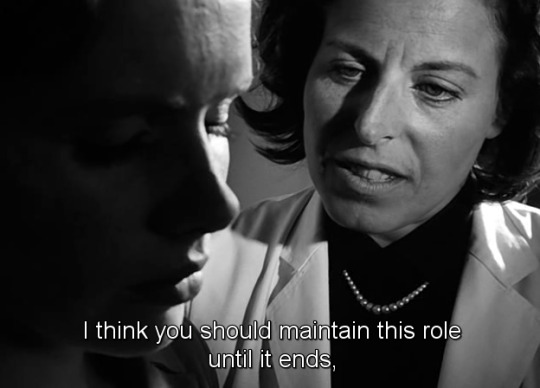
The Summer House
It's amazing how much Bergman packs in to the first 22 minutes!
Alma and Elisabet are now at the summer house alone together, enjoying themselves in this isolated spot near the sea. Alma grew up a farm girl, so is accustomed to this “rural seclusion”. Elisabet’s coldness and indifference has seemed to disappear, moving out of the sterile hospital room to this new setting.
The two sit together outside and go through mushrooms they’ve picked, both with similar style hats (light and dark) as they subtly hum a tune in unison. Elisabet then compares her palms with Alma’s. Alma grins and says it’s bad luck to compare hands.
The two are now on the rocky beach in their swimsuits. The beach is quite bleak, looks uncomfortable to lounge on and a bit other-worldly. Alma reads a passage aloud from a book she’s reading, meditating on the “anxiety of the earthly condition”, perhaps something she thinks Elisabet will find profound. Elisabet takes this in, is moved and agrees with the existential description. Alma however doesn’t agree, nor seems to fully comprehend what she’s read.
In the house now. Alma has several moments where she begins to open up to Elisabet but then second-guesses herself, self-conscious of what the mute “artist” might think. And Elisabet IS hard to read. She seems to me bored and distant at times, then lovingly engaged and listening. Alma now smokes because Elisabet does and both dress similarly in black.
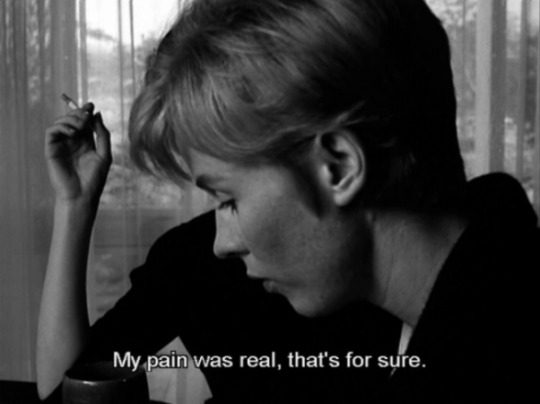
Alma continues to open up even more. A silent companion only leaves room for one talker.
Who is the patient now?
The camera angle features Alma’s speaking face in the foreground blocking Elisabet’s; one head blending together. It’s as if Alma is discovering things about herself for the first time...about her chosen profession as a nurse and a past relationship.
The conversation moves to the bedroom. Both are in their night gowns. Alma tells a long, detailed story about an orgy on a beach involving her friend and two boys that approached them while they sunbathed nude. Elisabet is sitting up in the bed and Alma sits in a chair. Elisabet shows a few signs of pulling away due to Alma’s gregariousness and wears a cool “been there done that” expression, but as the story continues she becomes focused, still, and calculating.
If I had to guess, this sexual experience of Alma’s is the most intense event of her life. She had cheated on the man she is now engaged to and is so vulnerable here in her confession. The acting by Bibi Andersson is superb.
Alma ended up pregnant and had an abortion. She weeps with guilt.
Is Alma’s mask fully off, revealing too much, bare to the bone? What does Elisabet really think about all this? Is she “gaining” from this somehow?
They move to the dining table again in the other room. It’s raining outside. Alma is loose and drunk, in a manner one is after a huge confession. She again announces her inferiority, saying how boring she must be to Elisabet and what use she could possibly be to her. She also says that she should be more like Elisabet and not talk. Alma then points out how they look alike and she could turn into her if she made the effort. Then she says, “You could turn yourself into me just like that. Although your soul would be much too big. It would stick out everywhere!” My favorite lines of the film.
Alma then puts her head down on the table as if to sleep. Elisabet then speaks for the only time in the film, telling Alma to go to bed before she falls asleep at the table. Alma looks up blankly, puts her head back down, then pops up again and repeats what Elisabet just said.
Was it just a thought or did Elisabet actually speak?
Does Alma flirt here with Elisabet when saying good night? It looks like it.
Alma’s Awakening
The bedroom is foggy. Alma gets a glass of water then lies down in bed. Elisabet walks up the hallway into the bedroom, looking at Alma then into the white room around the corner. She then turns back. A horn from a boat blows ominously outside in the night sea. A slight breeze moves a white transparent curtain in the doorway. Alma raises as if summoned, goes to Elisabet and leans her head on her wearily. Then the iconic shot of the the two looking into the camera at us. Elisabet places her hand on Alma’s forehead moves it back over her hair as if this is allowing Alma to “see” now, an awakening...Elisabet being the guide.
Is this an opening of the third eye? It may be a stretch, but it crossed my mind.
The two actresses are so beautiful here, softly lit from above, and fold into each other afterwards like an integrated yin and yang as picture fades to black.
The music reminds me of Hitchcock’s and I’m not sure I like it, but the moment is indeed powerful.
Did Alma dream this?
Does it matter?

Chaos
Picture fades back in and Elisabet greets us on the rocky beach. She enters frame from below, taking a picture of us with a stills camera. Alma is in the distant background next to the shore. Elisabet walks to her and takes a photo of Alma as she clumsily poses. Alma coldly asks Elisabet if she was in her room last night. Elisabet shakes her head no and shows no sign of lying.
Later in the house, Alma takes the mail to sent be sent off and has to take a drive to do this. In the car, she opens up Elisabet’s letter to the Doctor in curiosity. The first part of the letter is complimentary to the living situation and Alma, but then Elisabet writes, “it’s fun studying her (Alma) and how she cries over past sins.” The letter also mentions Alma’s orgy and the abortion and says how she “complains that her notions of life fail to accord with her actions”.
Alma is stunned and gets out of the car. She stands stolidly dressed all in black next to a murky pond looking at her reflection in wide shot.
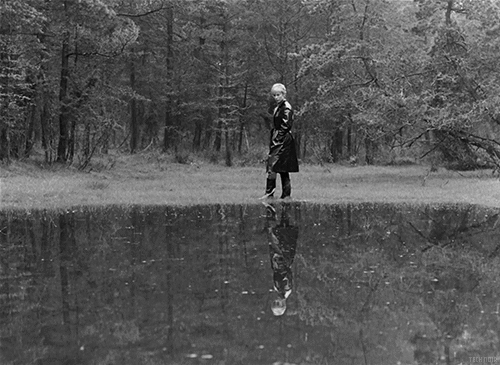
Alma is back at the house now in a black swimsuit with a grave look on her face. This expression was nowhere to be found until this point in the film. Outside she breaks a glass on accident and begins sweeping it up. She notices she missed a large piece, but leaves it after seeing Elisabet coming outside. The camera moves from the piece of glass as Elisabet’s bare feet pass by it, then back up to a watchful Alma. Again, camera fixed on the piece of glass as Elisabet narrowly misses it and tilts back up to a silent Alma. Eventually, Elisabet steps on it, making a painful sound in response.
Alma watches from inside the house with a hard scowl behind a transparent curtain. Elisabet stares back with a concerned, furrowed brow as if she knows what Alma did.
A violent sound effect comes in along with a literal splitting of the picture, a deep transition within the film and the character of Alma. She has crossed a line.
My first impression of the sound effect is it’s a film spool that is hung up in the machine...like the film has broken (similar to the glass) after Alma committed this act (or non-act).
The shot then literally burns up, starting on Alma’s face to a quiet white screen.
This effect would have seemed cheesy in almost in other film, but I think it works here. It is simple and clear and connects to the meta, self-reflexive nature of the film.
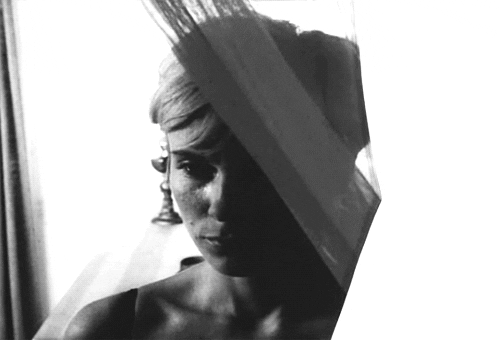
Everything has changed now.
Alma's insecurities have caused her to become darkened. Her sought-after approval from Elisabet has been betrayed by the letter to the Doctor. She has lost herself and taken on a new protective persona.
Or has she found power (even though misdirected) after her awakening?
Pain leading to growth in her cycle?
What is for sure now is she is very far from the sweet, unsure nurse we saw at the beginning of the film.
A voice in reverse is heard now (an effect David Lynch must have gleamed for Twin Peaks). We are again shown images similar to the opening of the film...
the vampire, the skeleton, a spike going into Jesus’ hand accompanied by a disturbing scream and an extreme closeup on a shifty eyeball that the camera pushes in on...
What do the eyes say and can the camera uncover it?
Can we see the soul if the camera looks into the eye close enough?
Camera fades in to Elisabet walking around the house, picture blurred and in slow motion, which eventually becomes focused and at normal speed. She exits the house and goes outside looking for Alma. Eventually she finds her and touches Alma’s cheek with sweet, subtle affection and sits down to read.
Alma is dressed in all black with dark black sunglasses. She acts cool and distant and lurks around behind a sitting Elisabet, poking at her with words and becoming visibly more upset and restless by the moment. She soon loses the facade saying she feels used and discarded (like the Doctor explained Elisabet’s “acting role”).
Alma continues saying she has been hurt very badly and laughed at behind her back. She then confesses she read the letter to the Doctor and accuses Elisabet of getting her to talk and mention things she’s never mentioned to anyone! Alma pleads for Elisabet to speak. The argument becomes violent. Elisabet slaps Alma and bloodies her nose. The two stop. Elisabet begins to laugh at the ridiculousness of the situation. I thought Alma might join in with the laughter here but she does the opposite and runs into the bathroom crying. She is so sensitive about being laughed at at this point that the internal turmoil just increases.
After a while, Alma reenters the room calm and raw. She asks Elisabet if being truly genuine, telling the truth, not evading things, truly being oneself...sloppy and silly...can this be possible? She says Elisabet might get better if she just allows herself to be what she is. Elisabet smokes her cigarette, cooly facing the opposite direction and doesn’t react or show much at all. Alma is unsatisfied with the lack of reciprocity and says angrily she knows how rotten Elisabet really is.
This strikes a nerve with Elisabet and she storms out.
Alma immediately feels regret and asks God what she is doing, then runs after her.
A long, beautiful tracking shot along the rocky beach as Alma chases after Elisabet apologizing profusely. She says how honored she was for an actress of her caliber to be interested in what she had to say, but then how hurt she felt because she was betrayed in the letter.
Alma “blabbers on”.
Elisabet eventually turns as if she might embrace Alma, but coldly walks away.
To me, it was as if the mask was projecting one thing, creating a pause in Alma, thinking that an embrace might occur, then Elisabet’s action doing another thing, walking away coldly. An example of the mask not connecting with the action.
Alma falls to the rocky beach, distraught.

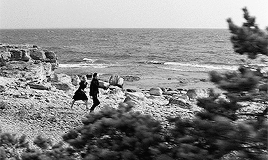
The next shot, in stark contrast, Alma is sitting serenely near the shore.
Elisabet is in the house, pacing with a cigarette, looking out the window (that reminds me so much of a shot in Woody Allen’s “Interiors”).
There is a deep anticipating heaviness that Bergman is masterfully able to create here with the help of the music. Elisabet shows more emotion here than usual. Is it because she is alone and no one is there to observe her?
She shows visible sadness again soon after, alone in her bedroom. She then comes across a photo in a book. It is of Jewish children being lined up by the Nazis in World War II. Her sadness becomes deeper and focused, maximized by the horror-enducing music accompanying.
Elisabet’s empathetic contemplation here is similar to when she was at the hospital watching the burning monk in the Vietnam War news footage.
Closeup on the picture, which is of a young boy with his hands up as a gun is pointed at him. The camera then cuts to various other closeups, bouncing around the photo examining every face...every mask.
What is Bergman trying to tell us here?
This may be a stretch, but my first thoughts were that Bergman is briefly pointing at something universal which includes all human psychological underpinnings. It is connected to our two protagonists in the film and what 's happening with them psychologically, but for moment looking beyond them, silently illuminating the potential evil (the shadow) within all human beings. That the fear of truly living without a mask can create such a sickness in man that one is potentially able to create this type of destruction towards others. That instead of facing oneself honestly, being whatever it is that you are, that a mental illness can form and the persona can fully take over. That one can become so identified with the persona of being a “Nazi” that they would point a gun at a “Jewish” child.
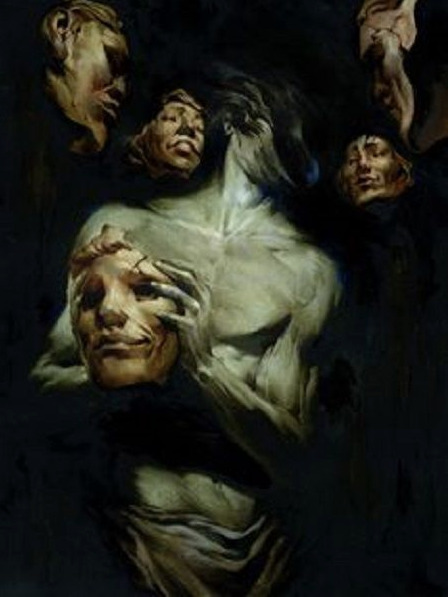

Again, back to the psychologist Carl Jung who looked to Eastern philosophy often as a reference for his work. In Eastern philosophy there is a common belief that under the mask is the godhead within each individual. To repeat from earlier, Jung believed the mask (or persona) was not the true self and could keep us from a much deeper, truer self which included a unified “collective unconscious” that all humans share.
Opposed to a healthy mask essential for social life, if it completely overtakes the godhead (or the true self) chaos ensues within that individual because one is also identifying everyone else solely based on their masks. Divinity can no longer be seen in ones’ fellow man or woman. All humanity towards others can potentially be thrown out the window because of this difference in “mask” and atrocities can occur because of the dual nature of this thinking, rather than a unifying recognition of a collective unconscious in the “other”.
And if there are enough individuals, disconnected from the godhead/true self, you get Nazis killing Jews.
ALL mask.
ALL persona.
And no recognition of the holy selfhood in others, which ultimately stems from fear, blinding the individual...
And taking us back to the film of our two fearful protagonists where the persona is being focused upon.
Does Elisabet understand all of this yet is unable to change herself? Or is her silence a rejection of the mask, a rebellion to conform and/or an attempt to get better?
I don’t know.
We cut to Alma now in her bedroom and she is having a bad dream, shaking her head violently side to side. She wakes up and turns on a portable radio. Through the static it says “we don’t talk...listen...or understand”, then the voice says something about “Elisabet” and “by what means should...to enable.”
Is the radio representative of her conscious mind tuning in to another frequency? I see no other reason for the radio that randomly appears out of the blue.
We then see Alma going into Elisabet’s room, who is asleep.
Alma begins watching her, smelling her, taking her in and even touches her face. She comments aloud how Elisabet’s face is slack and her mouth is swollen and ugly, then points out a wrinkle. She also mentions she can see a scar that Elisabet normally covers with makeup.
Alma seems to relish in the fact she sees her this way, with her guard down and is able to feel superior in this moment. Alma hears a voice from another room that says “Elisabet” and leaves.
Is it the radio from a few moments before?
Elisabet then opens her eyes and looks into the camera again at us. She was not asleep. She was acting like she was sleeping. Even when Alma thought she was superior, Elisabet was still conscious. Perhaps because the unconscious never sleeps and Elisabet is representative of the unconscious.
"Elisabet” and Mr. Vogler
This next part becomes the most surreal and hardest to understand in my opinion. It is dawn now. Alma walks through the house, then is startled by Mr. Vogler, Elisabet’s husband. He calls Alma “Elisabet” and begins explaining how this has been hard on their little boy and continues further about their relationship. Alma once again says she is not his wife, as Elisabet creeps up from behind fixated on Mr. Vogler, lurking behind Alma’s shoulder in a two-shot closeup. Elisabet then guides Alma’s hand up to caress Mr.Vogler’s face, like Alma is her puppet. He is a strange, stern looking man with dark sunglasses. Alma now is under the spell that this is her husband, and says she loves him very much.
We’re now watching in a reverse shot with Elisabet in the foreground, looking upset, as the other two are professing their love for one another. Alma moves her gaze to Elisabet in a conniving way and continues with Mr. Vogler in spite of Elisabet and they kiss.
This is one of the most puzzling parts of the film to me and I found myself, mentally, wanting to check out. I had to consciously will myself to pay close attention and try to decode this. I think because it smashed the narrative I currently had going in my head of what I thought the film was.
It’s as if Alma is now a vessel controlled by Elisabet, but why? Alma seems to be unaware of Elisabet, then aware.
Is it because Alma, who adores Elisabet, can now see what it's like to be in her shoes? Is Elisabet upset because Alma is now privy to this?
I think there is also a deeper subtext throughout the film where Alma is representative of the “conscious” and Elisabet the “unconscious”, which is running parallel to what is literally being shown, yet sometimes they blend like a dream. I’ve mentioned this once and is worth mentioning again.
Alma/Elisabet and Mr. Vogler are laying down now and it seems they have just made love. Alma/Elisabet soon goes from tender to a violent struggle asking to be anesthetized! She cries saying she is cold and rotten and indifferent, “all lies and imitation”. The camera moves to an extreme closeup on Elisabet and fades to white.
Does Alma clearly see Elisabet now? Was Alma able to break through Elisabet’s persona and truly feel what it was like for her with her husband and why they are estranged? Or it could very well be Elisabet detaching herself from the past experience and processing it this way as we see things from her point of view. And rather than Bergman showing a flashback with Elisabet and Mr. Vogler, he presents it this way with Alma standing in?
I keep asking these questions because I feel the questions are more important than the answers. A film that just gives answers is not a film I am interested in seeing. If answers are the most important thing then one should just read the dictionary and not watch Persona.
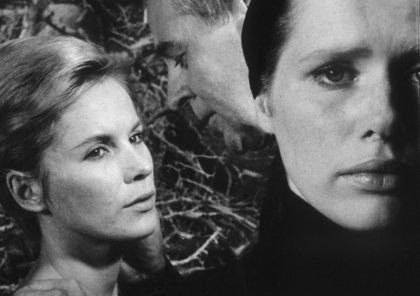
Alma Strengthened?
It is daylight now. Mr. Vogler is nowhere to be found. The scene starts as almost a complete nosequitar to what just occured. Alma sees Elisabet hiding something under her hand and makes her show what it is, like a student being disciplined by a teacher. It is a picture of Elisabet’s child. Alma asks her to talk about it. Elisabet shakes her head no, so Alma speaks for her. Alma’s attitude is similar to the Doctor’s now and is dressed exactly like Elisabet. Both have been in black most of the time, but now it is exactly matching, up to the detail of the black headband.
So why is it important they dress in black? There must a reason, or several.
I’ve seen some far out interpretations of what this film is, so I’m going to take a swing regarding a possible reason why this deep black is worn by the characters a majority of the time.
Both are in a state of “dying”. Not in the physical sense, but psychologically...a chaos, a putrefaction (alchemy term).
It doesn’t necessarily mean something so simple as “black is negative”/“white is positive”, but chaos/putrefaction/psychological death is an essential stage in life as fragmented reality occurs. It is impossible to stay in the light all the time. We are human. We are foulable beings tossed out of the Garden of Eden. We become confused, tragedy occurs, we become fearful. This is what life is and it’s inevitable.
In this film’s case, unity does not reign but a duality of “Alma” and “Elisabet”, who must pass through this stage in the cycle in order to become unified and “in the light” again (atleast that’s the goal). The film is at a point in their lives in which chaos reigns, for reasons I’ve previously highlighted regarding the shadow, persona and self. And Carl Jung was very well-versed in Alchemy and it’s metaphors, as I assume Bergman was as well. Also, perhaps this connects to the morgue and skeleton during the beginning sequence
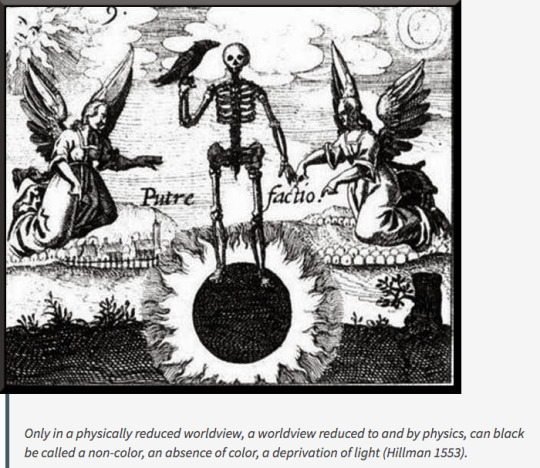
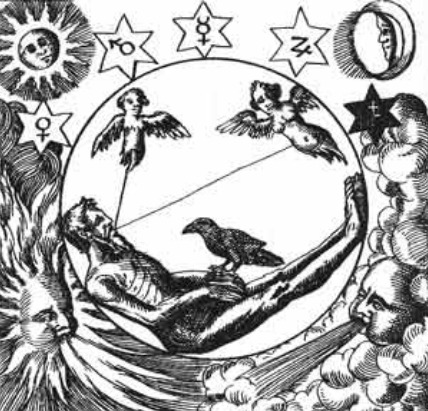
This is the most still and confident we have seen Alma in the film. Alma now begins to speak Elisabet’s story to Elisabet. This begins with a comment someone made to Elisabet at a party telling her that she had everything as a woman and an artist but lacked motherliness. Elisabet, in turn, then became pregnant. Elisabet next felt frightened, in over her head regarding all that pregnancy and motherhood required of her, but she “played the role”, put on the persona as a Mother.
As Alma speaks, this is the most emotion Elisabet has shown in front of Alma the entire film, looking away, furrowing her brow, half-lit, terrified and found out! Alma continues, saying Elisabet had wished the baby would’ve been stillborn and a deep shame washes over Elisabet as she ducks her head. Alma is vicious, continuing on about how much Elisabet despised the baby, how it cried day and night and how she was scared with a bad conscience.
The boy eventually went to live with relatives and Elisabet went back to the theatre. The boy loves his mother greatly, but Elisabet is always cold and indifferent...disgusted by him.
The scene then starts over again, but with an over-the-shoulder shot onto Alma this time. The exact same dialogue is repeated and we have to again hear this painful dressing down of Elisabet and her resentful relationship with her son. The over-the-shoulder shot turns into two 1-shots, the same as with Elisabet the first time. Alma is also half-lit and I don’t think she ever blinks (which made me think of Paul Thomas Anderson’s film The Master scene at the table but between two men.)
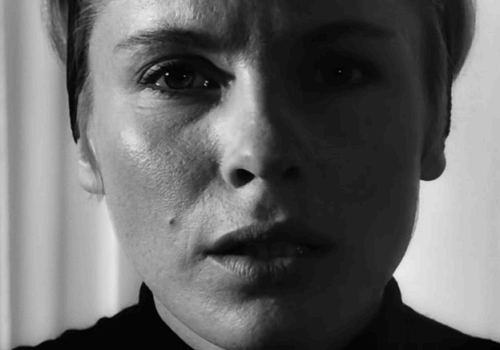

After Alma finishes (on a straight-ahead closeup) Elisabet’s face begin to take up the darkly lit half of Alma’s and she says, “No! I’m not like you”, “I’m Sister Alma, I’m just here to help you.”
The two faces are now one.
Duality to Unity.
Both face-halfs are now in the light.
Elisabet’s half appears and disappears a few times and then appears fully with punctuating music at the end of the scene, freeze-framing before fading to gray. It is striking how well their faces actually match up.
Obviously I’m going to expand on what I think happened here.
Alma has entered Elisabet’s head so deeply, she was able to intuit this dark story about Elisabet and all of the unflattering details. Alma had to suffer to get to this point in order to enter Elisabet’s mind. And her entry is so intense she begins to lose herself. Her self-assuredness then quickly turns back to the vulnerable, scared Alma from before.
Is this for the best Elisabet hears this?
I kept thinking while watching that a regular moviegoer would interpret this as overly harsh by Alma. But it is also Elisabet becoming fully aware of why she decided to become pregnant in the first place and the subsequent emotional damage caused to her son. It then covers up to the point where she becomes mute during the Electra play.
Elisabet needed Alma in order to get to this point of realization, as painful as it might’ve been.
A Standoff and Enigmatic Ending
We open on a 1-shot of Elisabet and a quick close-up catching a glimmer of defiance as Alma enters the room with her nurse’s outfit on now. Alma attempts to match her defiance and a stareoff ensues. Alma says she’s learned quite a bit and physically punches forward directly in front of an unflinching Elisabet. Alma then leans in and says she will never be like Elisabet (denying the shadow) and says she changes all the time and Elisabet will never get to her.
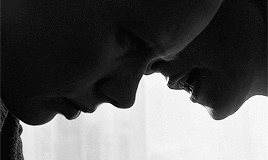
Another stareoff.
Soon Alma breaks and begins nervously hitting the table.
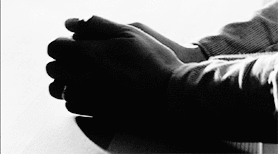
I have thought about this scene moreso than any other scene after watching the film. To me, there is so much to unpack. Alma is never able to get a leg up on Elisabet for very long. Again, I think this reinforces the metaphor that the conscious is unable to escape the unconscious. The same as a human being unable to escape the eye of God. This is why pre-determination was mentioned at the beginning of this post.
If we are following this logic, Alma is predetermined not to gain a mental edge on Elisabet. She’s not formed to have the depth that someone like Elisabet has, no matter how much she’s “learned” or the mask she has tried to maintain. Elisabet knows her thoughts and has the mental ability to consume her and Alma knows this and it manifests in this anxious pounding on the table.
Alma somewhat regains composure in her face but her words are gibberish nonsequitars...almost poetic but too garbled. Elisabet turns around and is in the foreground of a closeup 2-shot and mouths her words as if she is controlling what’s coming out of Alma’s mouth. Her mouth does not sync with the words but it does convey that Elisabet is in control.
Alma continues to struggle, trying with all her might to articulate what she wants to say. But the gibberish continues, as if two minds are battling one another and Elisabet is winning, silent and calm, while Alma strains to squeeze out meaning verbally with little luck.
Then, something revealing occurs...
Elisabet runs her nails down the inside of Alma’s forearm until drawing blood, then goes down and begins sucking the blood like a vampire. Eventually Alma fights her off and begins slapping her repeatedly until it cuts to black.
I did accidentally stumble across an article by BFI (British Film Institute) that states Bergman intentionally took Elisabet’s surname (Vogler) from a film called “The Magician” involving a character who was an artist that sapped the energies of others for his artistic gain. This makes sense because, as mentioned, Elisabet has used her mental energy to consume Alma by essentially playing the role as the mute patient. I don’t think this was an elaborate plan on Elisabet’s part, but kind of fell in her lap and she went with it.
Also, due to the meta-nature of the film (inside the film projector, characters looking into the lens, etc) is Bergman also implicating himself? This film is very aware of itself and makes this clear several times. If I had to guess, Bergman is also saying he is not innocent, that he is using these characters/actors to play out his dream in order to gain a better of understanding of his own psyche.
Also, are we, the audience, implicated as well? Elisabet looks at us, takes our picture, is aware of us...aren’t we placing ourselves inside these characters? We see their vulnerabilities, analyze their weaknesses, pass judgement...we use them in order to come to some type of new understanding within ourselves or for our own entertainment. Is the nature of art itself vampiric? In a sense, are Elisabet, Bergman, us and all artists vampiric in a way? Absolutely.

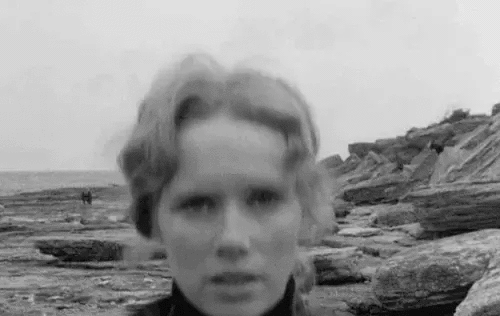
Then, right when you think you have all it figured out, there is another couple of scenes that make you think otherwise.
You have to take one scene at a time with Persona. It is less of a narrative and more of a dreamlike poem.
Alma nows enters the hospital room and Elisabet is in bed in a sedated state. Alma lifts her up slightly and says, “Nothing, That’s how it should be”, in a comforting manner and then lays Elisabet’s head back down. It then fades into a repeat of the Alma/Elisabet dream shot of them looking into the camera from earlier in the film, perhaps comforting us the audience, slowly waking us up after this traumatic, confusing ride we’ve been on as the film winds down... telling us it’s nothing, it’s okay, it’s how it should be.
In turn, Alma wakes up in her bedroom in the Summer house. We are not in the hospital anymore. She peaks out and sees Elisabet packing her suitcase.
Alma then begins putting all the summer outdoor chairs inside the house to pack up before she leaves. We do not see Elisabet again. What happened to her? Did she just leave without saying goodbye?
Alma looks into the mirror and brushes her hair back as was done in the scene with Elisabet from earlier. A translucent image of Elisabet then appears behind her as seen below. She then smiles to herself and puts on her hat.
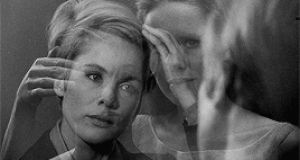
As she exits outside with her suitcase, there is a large concrete sculpture of a face that the camera moves to. It then flashes to a shot of Elisabet on stage as Electra.
Alma walks to the bus. It then cuts to a camera sweeping down from above on a film set to capture Elisabet in frame.
It cuts back to Alma getting on the bus to leave and the camera pans to dark rocks on the side of the road, then fades into the boy in front of the screen from the beginning of the film, reaching out to touch the screen. The screen includes a blurry image of what looks to be Alma that soon fades completely to white...a screen within a screen.
As we, the viewers, reach out with our minds to comprehend exactly what the ending means, the shirtless boy with the glasses also reaches out to feel an image that disappears. The film roll runs out (literally on screen), falling off the spool and the projector burns out. The End.
To conclude, I just realized that attempting to analyze this film is almost like chasing a conspiracy theory, looking for connections that may or may not exist. I know that I missed some things. I know that I got some things wrong, but the joy of thinking about these films is that's okay. :)
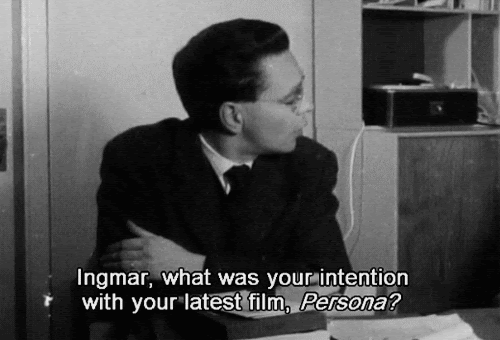
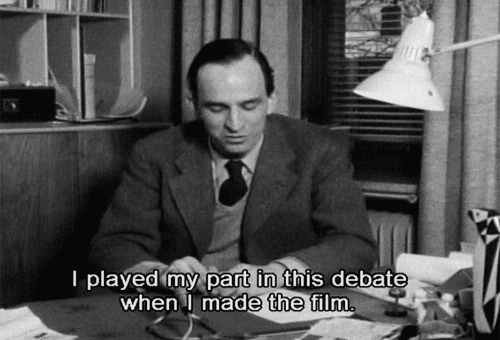

Also, in closing, I wanted to add an image that I had an immediate reaction to while looking for behind-the-scenes photos.
As you can see, it is of Bergman, Liv Ullman and Bibbi Andersson. And as you know by now, this a very heavy, dark film on identity and internal chaos. But there is such love and sensitivity and thoughtfulness in this photo of three artists in the middle of making something extraordinary and revolutionary in cinema.
It brings up some deep emotions in me because this is something I yearn for, almost like the boy touching the screen. I do truly feel I've had small glimpses of this type of satisfaction while working on my own projects, sparking a recognition, knowing it is rare and beautiful and transcendent, providing more to aspire to.
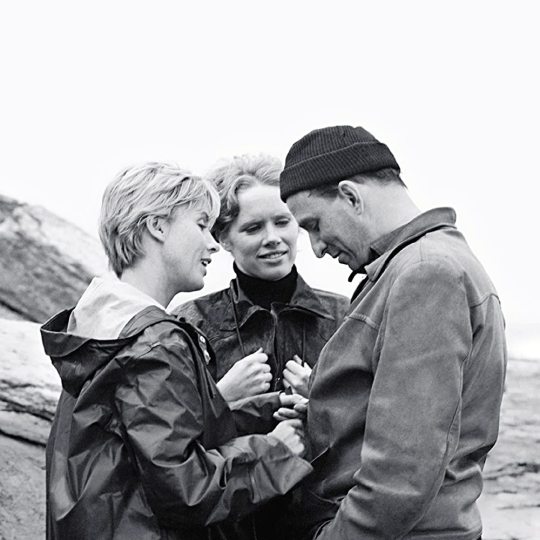
#cinema#persona#bergman#livullmann#bibiandersson#ingmarbergman#swedishfilm#filmanalysis#1966#criterion collection
6 notes
·
View notes
Text
Winter Weebwatch #2
Alright, Week 2, second episodes, which we are getting to a lot quicker than we got the Week 1 episodes, hence why this post is going out, like, three days after the last one. Hey, maybe by the time we hit Week 3, we’ll be current! That’d be nice.
Several third episodes have already aired, and In/Spectre always seems to be subbed a little late, so we might skip over it for Week 3 and come back for it in Week 4.
Same seven shows as last week, those being Darwin’s Game, Plunderer, ID: Invaded, Pet, In/Spectre, Sorcerous Stabber Orphen and Infinite Dendrogram. Nothing has been dropped or picked up yet, but the season’s still young.
Darwin’s Game

★☆☆☆☆
Haha, this time I’m reviewing the episode immediately after watching! My memory won’t pull the rug out from under me this time!
So, Darwin’s Game episode two sees … um … sees the guy … whose name begins with a K I think … doing something. Um. Oh! There’s a treasure hunt game with murdery elements on, but … but wait, that happens at the end of the episode? So what happens before that? I think there’s a guy who’s like a boxer with superspeed, and he steals the protagonist’s phone, maybe? But I don’t remember why. I …
God, this show is difficult to review. I swear I just finished watching it, but literally none of it has stuck. It just doesn’t take up any space in my memory, it’s like when you wake up from a dream and you remember it for like six seconds before it starts getting jumbled and confused.
One star again, I guess, because I can’t properly review something that I don’t even have a clear recollection of.
Plunderer
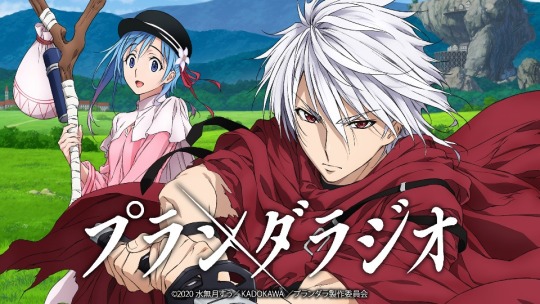
★☆☆☆☆
Fresh off what might well be the worst first episode of the season, Plunderer proceeds to demonstrate that it could have won me over easily if it hadn’t decided to devote the first twenty minutes of the series to making me hate it.
So, episode two kicks off with a fight scene between the protagonist, Licht, and Skeezy Military Guy, and it’s honestly pretty fun, as is the sequence just afterwards where Licht pretends to be an amoral thief as part of a convoluted gambit to keep the deuteragonist, Hina, from being arrested for possession of an illegal Ballot. There’s even a kind of emotional arc in this episode, of sorts. If I hadn’t seen the first episode, I probably would’ve given this one three stars.
Except I did see the first episode, and the consequences of that still apply. I can’t really ever sympathise with Licht or even enjoy seeing him on screen because the very first thing we ever saw of his character was him committing sexual harassment. Despite what my reviews of Darwin’s Game might suggest, I have a memory longer than that of a goldfish, so no matter what kind of emotional moments or ‘Aw, see, he really is a good person!’ moments the show throws out, it’s not going to matter, because his introduction already soured me to him and, to be honest, to the show entirely.
Anyway, the episode ends with some random background extra revealing that he’s actually a major villain, and I guess Hina is going to track down Licht to warn him or something, and I’ve just emotionally checked out at this point.
Pet.
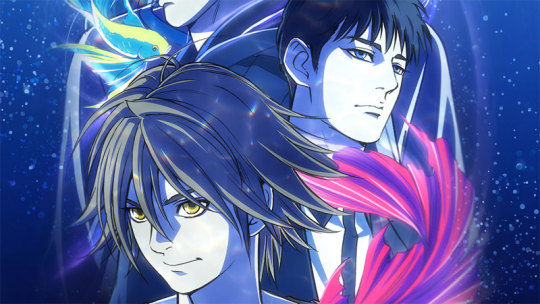
★★★☆☆
Pet wins the coveted Most Improved prize this week, as its second episode retells the events of the first episode, but from the perspective of the psychic criminals. This is kind of a great move, as it shows us how these powers work, sets up rules and limitations, clues us into the character dynamic between psychic crime boyfriends Hiroki and Tsukasa, and their boss, the tyrannical and short-tempered but noticeably less powerful Katsuragi.
With this new perspective, events from the first episode are recontextualised, as we see how Hiroki and Tsukasa alter their victim’s memory, and also see how Hiroki is toying with Katsuragi (most noticeably, by making him believe he’s smoking when his cigarette is unlit), and the tension that arises from Katsuragi’s ostensible superior position juxtaposed against Hiroki’s vastly more powerful psychic abilities, setting us up for a future conflict down the line.
We also get to see Hiroki and Tsukasa’s co-dependent relationship, with Tsukasa relying on Hiroki in their work, while Hiroki is emotionally too tangled up in Tsukasa to function without him. That’s actually genuinely interested, and it’s compared and contrasted with the victim’s relationship with his best friend/possible boyfriend -- a relationship that Hiroki and Tsukasa are, by changing his memories, destroying.
The animation is still pretty bad, but it makes up for that somewhat with some stylistic flair and some interesting aesthetic choices.
Infinite Dendrogram.

★★☆☆☆
Infinite Dendrogram picks up this week with Ray and his new person-weapon Nemesis attempting to level up. After learning about a war between the NPC nations of Altar and Dryfe that ended with Altar’s defeat, Ray’s first attempt to level up sees him making both a new friend in the form of another player named Rook, and a new enemy, in the form of a mystery gunman who shoots him down for no readily apparent reason.
I really wanted to give this episode three stars, I wavered back and forth on it for quite a while, since this is still a really enjoyable episode, but ultimately I had to scrape off a point for two reasons: The first was the inclusion of some really jarring and irritating fanservice in the form of the antics of Rook’s Embryo, Babylon, which just threw me out of the episode and grated on me. The second is the scene where Ray’s brother Kuma informs him that the war between Altar and Dryfe was lost largely because when Altar’s NPC king (and remember, NPCs are sapient in this game apparently) said he would not be giving out loot rewards to players who assisted in the war, players just outright refused to help.
Which is kind of … wow. Thousands or maybe hundred of thousands of sapient AIs perished because players, who were at no risk of serious injury or permanent in-game death, refused to help out unless they got ultimately meaningless in-game rewards for doing so. It wouldn’t even as if they would be killing other sapient NPCs, since it’s clarified that Dryfe uses non-sapient robot soldiers. To make this a more bizarre turn that frames the entire playerbase of this game as sociopaths, apparently a bunch of players did fight for Dryfe, which offered rewards to them for doing so, and those players actually did murder a bunch of sapient NPCs.
I’ve elected to be fairly forgiving with the absurdity of this show’s premise, but that one worldbuilding detail kind of pushes it into the red for now.
Sorcerous Stabber Orphen.
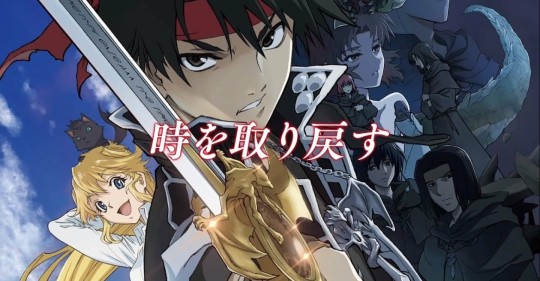
★★☆☆☆
Not a whole lot happens in episode two.
Actually, nearly nothing happens in episode two. There’s a very brief explanation of the magic system, and a short sequence that sets up the next few episodes, as Orphen is blackmailed by his sorcerous former friends to assist them in hunting down his sister Azalie, and apart from that it’s alllllllllllll flashbacks.
The flashbacks don’t really communicate anything that couldn’t have been communicated in other ways, though. I mean, in general I really don’t like flashbacks, given that they bring a story to a grinding halt, but these flashbacks are just sort of pointless. We see that Orphen was a student at the Tower of Fang, which we knew, and we meet a few of his friends, which we meet again just afterwards so it’s kind of pointless, and we get some explanation of how the Sword of Baldanders, the weapon that turned Azalie into a dragon, got to the town that Orphen is currently in -- only for us to be told the same thing in exposition a second later.
The pacing of this show is just not … great. After two episodes, it feels like there’s been maybe one or one and a half episodes of content, and I know that doesn’t sound like it’d drag too much, but I have the attention span of a horsefly, so.
ID: Invaded.
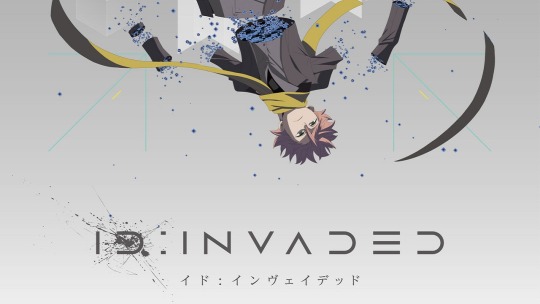
★★★★☆
Continuing on from last week’s episodes, ID: Invaded -- now on its third episode, since again, it aired two episodes at once in its first week -- picks up with a new case, that of a bomber who mixes fireworks into his explosives, creating brightly coloured displays as he murders people. Diving into his mental world, Sakaido finds himself on a tower surrounded by a waterfall with dozens of people, as a sniper picks them all off. As he attempts to find clues, his progress is hindered by constantly dying, causing him to reset his memory and start over each time.
This is kind of an opposite situation to Infinite Dendrogram, where this would have been a solid three star episode, being entertaining, engaging, occasionally even thought-provoking and atmospheric (such as in the scene where Sakaido is thinking back to the aftermath of his daughter’s death, pointing out as he remembers it that his recollection of it, in which his daughter is able to talk to him before she dies, the body is recognisable, and the mortician praises her bravery, is incorrect), if not for a few small things.
In this case, it’s the final scene that pushes it up to being a four star episode. With the bomber in custody and in the cell opposite Sakaido’s, a solid four or five minutes are devoted to a harrowing sequence where Sakaido uses what he learned in the bomber’s mind to talk him into committing suicide. It’s an atmospheric, tense, and remarkably upsetting scene, made all the moreso by the voice actors’ excellent performances.
In unrelated news, for those keeping count, the surrealist director Ei Aoki references this time around is Koichi Mashimo, director of the impressively surreal and atmospheric .hack and Tsubasa Chronicle animes.
In/Spectre.

★★★☆☆
So, after a first episode that was kind of all over the place, the second episode actually settles into something like a single genre, establishing itself as a light-hearted supernatural mystery with some romance elements. Which is fine, and it does it well, and I’m happy to not constantly be getting genre whiplash anymore.
This week’s episode sees Kotoko summoned up to the mountains by a snake spirit who wishes to know why a murderer tipped the body of her victim into the snake’s swamp. The main bulk of the episode is taken up by Kotoko and the snake’s interactions, with Kotoko acting as prosecutor and presenting plausible theories as to why the killer did what they did, and the snake picking holes in those theories and shooting them down.
It actually kind of works, to be honest. As Kotoko explains her theories, we’re shown them happening on screen, and since the snake points out some pretty reasonable flaws in them, it feels like a nice, even back-and-forth debate, as the two make point and counterpoint. Written well, debates like that can be really compelling viewing, and this episode actually is written really well.
There’s also some nice character development moments early on, with Kuro turning down Kotoko’s offer of accompanying her to visit the snake, only to insist she take a thermos of soup and a jacket with her, and later wandering up to meet up with her anyway. Mamoru Miyano doesn’t have the easiest job here, playing someone who is meant to have extremely flat affect and yet still make them interesting to listen to, but he pulls it off pretty well.
#darwins game#id invaded#infinite dendrogram#plunderer#sorcerous stabber orphen#anime#winter weebwatch
2 notes
·
View notes
Text
Borderlands 3 review
Level 50 Zane, 15 Amara.
Minor spoilers ahead
World/Maps
-The worlds you travel to are impressively large even though they're broken up into smaller sections; the term "smaller" is used very loosely. I may be wrong but these are by far the most areas and largest in the franchise and its kind of impressive. My favorite level is the Lectra City section of Promethea. It's both organized and maze-like where a gunfight can break out literally around every corner. All the sections are noticeably big and feel unique to the planet or area they represent with that "if it's on the map there's probably something there" design that not enough games take advantage of.
-The color pallet is miles better than any previous game in the series. This game can be pretty but its even prettier when everything is blowing up and shit catching fire, particle effects are trying to fuck your eyeballs. The previous games were kind of bland color-wise, the pre-sequel did try and venture out more but this is way above that in my eyes.
Gameplay/Guns/L00t
-The combat is sublime. I have heard people complain that doesn't feel much different but I think they are wrong and need to go back and play the less enthralling, less involved combat of the previous games. You didn't have many options in the first games when firefights broke out and it was dated but distinctly Borderlands. Now that the slide and mantle have been implemented (it's about time really), combat is faster and players can take advantage of high points and hit cover faster. The slide even has combat implications once you get to the later parts of the story. It's all very well worked and thought out as opposed to being just thrown in because it's what shooters do now.
-The guns and gunplay are on par with Destiny, they may even be a little better when you consider how deep the loot is and how the stats visibly and tactically affect the guns they’re applied to. You get one Duke in D2 and you've pretty much got them all. Here you can get the same gun to drop and actually see and feel the difference between the stats it rolled with. The distinct differences in the manufacturers have really been leaned into as well. They reworked some of the distinct hallmarks of the makers and improved them to help ramp up the combat. This is minor but I really like how manufacturers will mail you guns the more you use theirs.
-Vehicle controls are muddy as hell and will take a second to get used to. It’s definitely not the best possible setting even after messing with controls for a few minutes. The default kind of forces you to shoot where you’re looking unless you’re standing still, you may want a little more flexibility in your controls which is available. That said, the models and their functionality are varied and cool but I’m honestly surprised they haven’t perfected controls yet.
Story/Writing
-The story is decent, wildly better than the actual writing and dialogue itself (which doesn't say that much) but once you get to the end there are some connection's made that are interesting and well thought out. Now that I've gotten the "good" out of the way. What the fuck is up with all the cutscenes not having our character in them. All events in cutscenes play out like our guy or girl isn't in the room and can't affect the events that play out in them. There will be so many times where you yell at the screen as to why your character is never seen/not doing anything in pivotal situations that could use a Vault Hunter. LIKE THE ONE THAT SHOULD BE STANDING RIGHT THERE.
-Troy (male villain) literally says "You were like, 'My powers boo hoo'!!" which is a Handsome Jack reference. It would be nice and nostalgic if it wasn't the very first thing that comes out of his mouth when the Twins intercept you at the Dry Dock. Instead, it just seems beyond lazy and proves just how lacking in identity they both are. Tyrene is arguably worse, she just says things and then follows it with "I don't believe that," or " That's just something people say". That could show how little she cares and that would be fine if it wasn't the only thing about her that stood out. They almost do something interesting later in the story where Troy takes center stage but that lasts literally a boss fight. Both of them are just, underwhelming in almost every single way. All seldom the connection they have and how Troy is capable of being a Siren and Tyrene's seemingly completely unique and powerful abilities.
Co-op, Optimization, and Performance
- Co-op will go from fluid and fantastic to laggy and rubber banding at the drop of a mag and it's as frustrating as it is thrilling as hell. It's strange what situations will slow things down and what runs smooth as hell. We had four people on one internet connection and everything ran really well. One day my friend and I tried with just us on Promethea and the session was so fucked I actually couldn't see or fire my guns at one point and I had to back out and come back to get them functioning again. There are definitely more patches coming but for a game boasting online co-op, it should be better. I will say though, level balancing is amazing and can even be quite useful if you want guns to drop at level no matter where you are in the game.
People have been complaining about the UI and I totally understand, I don't mind the design, what I do mind is how obnoxious the input lag is. Oh and the weird glitch where as you scroll your inventory, the pictures of the items toward the bottom copy to rows above them. It's easy to fix in-game but...why is it even a thing?
How have they not fixed that glitch where your FFYL timer just drops off despite still having time on the meter. It's happened since borderlands 1 maybe there's a certain amount of damage you can take before the timer doesn't matter anymore? I genuinely don't understand it and on boss fights, it's infuriating to lose money when you could've gotten a kill for your second wind.
Misc.
-Of course, the first patch they put out isn't to fix the performance issues but to kill the Loot Tink farm on at the Jakob estates. A farm you can still do offline fyi ;) A billion guns and you mad people getting a slightly higher chance at getting the guns they’re just gonna get anyway. WHY
-The trinkets are cute but useless, why not put a minor stat buff on them to actually give them reason? They're so small they almost don't exist to me.
-Also, that end credits song is absolutely terribly chosen. The end sequence, in general, is just strange and seemed a little forced. Not how they presented it but what exactly they showed because as perplexing as it was to see what I did, I was just more upset I didn't get the development of those scenarios to see how we reached the outcome. I'm trying not to spoil things but it's difficult so I'll just be quiet. I'm not even sure of what I saw but I do know what it looked like. I just wish there was more background given since our character gets literally none.
-REALLY weird cameos. Like, really strange.
tl;dr BL3 is an 8.5 for me which flys in the face of my many criticisms but I can't deny how fantastic the gameplay is on top of the absolute wealth of content delivered, all without the modern monetization bullshit. The story is meh, writing meh, but god damn if it isn't rewarding in its gameplay. IF you like BL as a whole there's no reason not to play unless you're waiting for the Steam release. An Endgame post is in the works.
3 notes
·
View notes
Text
The Hollow Crown - Series Review

“Let us sit upon the ground and tell sad stories of the death of kings.”
Occasionally, television reminds us that it can be a brilliant medium. It is easy to become cynical, believing that only a show that pretends to be reality or a comedy in which good actors spout terrible dialogue can be aired. Then, just as we despair, along comes something truly genius. The Hollow Crown is truly genius.
It is a series of four of Shakespeare’s history plays. Often performed together, these stories take us from the late years of Richard II’s reign through the reign of Henry V. Although we will never know if Shakespeare intended for these plays to be performed as a series, they work as one. The stories lead on to the next; characters appear in more than one; and, references are often made to earlier plays.
The BBC, once again, didn’t hold back when producing these four shows. Each has a dream cast and a dream director and they were all filmed on location in England. The music is gorgeous; the sets and the costumes are lush; the cinematography is stunning.
Shakespeare is not an author you can watch with one eye while doing the crossword. His language is dense and, because he wrote in the days prior to special effects, much of what is happening is spelled out in some detail. Your reward, however, for paying attention and concentrating on the play at hand is some of the most beautiful language ever written, at least in English. When that language is spoken by some of the greatest living English actors, it becomes magic.
Richard II
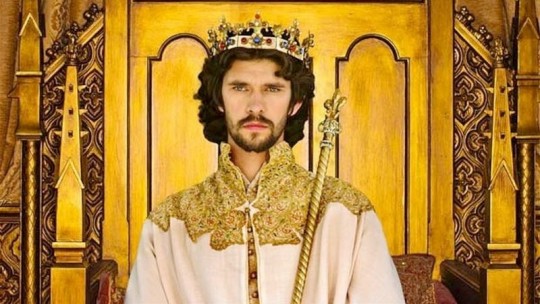
The story takes place over the last two years of Richard’s reign and shows us the rise of Harry Bolingbroke who will become Henry IV. The cast is magnificent, especially Patrick Stewart who, I would argue, is among the best of the RSC old guard. And, on a personal note, can I just say that James Purefoy in period costume works so much better than whatever it is that he is currently playing in The Following.
Like so much of Shakespeare, this play is much more complex than one would initially suspect. On the surface, it is about one king losing his throne to another. It is, however, so much more. It is the story of two men who face off against each other. One is a born leader; the other not so much.
Ben Winshaw, who deservedly won a BAFTA for this role, plays King Richard as weak and entitled, convinced by the divine right of kings that he is untouchable. As he makes the decisions he does, even without the benefit of history, we know that they are wrong and that he is making his downfall inevitable.
Rory Kinnear plays Bolingbroke, Henry IV by the end of the play. He plays the role with subtlety and grace, yet underneath it all is a man conflicted and tormented. He never wanted to be king; he just wanted back what was his.
The best example of this disparity is in the language used. Richard never strays from the royal plural; Bolingbroke never uses it once. Now Henry IV, Bolingbroke understands that the divine right of kings has been turned on its ear and his guilt at what he has done, both to his cousin and to the monarchy, is stunningly conveyed in the final scene.
This play is not performed often, but it should be. It is as strong as the three that follow it.
Henry IV, Part One
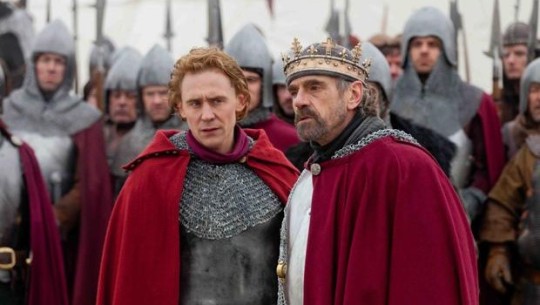
Many years have passed, and Henry IV is ensconced on the throne. He has aged and now is played by Jeremy Irons who is simply wonderful. “Uneasy lies the head” being a true statement, Henry has spent his reign wrestling with his guilt and with the constant threat of civil war as not everyone is thrilled about who is wearing the crown.
To make matters even more troubling for our king, his son and heir Hal is a right pain in the ass. Instead of hanging out with his father at court and becoming a mighty warrior, Hal chooses to spend his days hanging out in an Eastcheap tavern with Falstaff and other lowlifes. Tom Hiddleston plays Hal and does so with gusto.
Herein lies the tension of this play. Hal has two fathers; the king whom he disrespects and Falstaff whom he disrespects even more. Henry has two sons; Hal who makes him furious and Hotspur (one of the great Shakespearean names) who is not his son, but is the warrior supporting the crown. The problem is that Hotspur is hotheaded and feels that not only does he have a right to the throne as Richard’s true (and declared) heir, he has earned it.
The inevitable battle is truly epic and tough to watch. The producers did not hold back and the flying arrows and sword fights look amazingly real. Extras roll around in the mud and, at the end, all of our heroes look truly filthy and exhausted.
Hotspur and Henry face off and we see Hal become the true heir to the throne in front of our eyes. The language helps, but Hiddleston plays the scene to perfection as everything from the tone of his voice to the way he holds his head changes and becomes more regal.
Simon Russell Beale is the finest Falstaff, ever (he, too, won a well-deserved BAFTA). So many actors play the role going for the obvious laughs. Beale, on the other hand, manages to inject the character with pathos and humanity, and his paternal love for Hal is obvious to all. Admittedly, some of the humor is lost as a result of these choices, but I didn’t miss it. For maybe the first time ever, I understood what Hal saw in such a horror of a man.
This version is filled with wonderful character actors, too numerous to mention. However, I would be remiss if I didn’t send a shout out to Julie Waters who plays Mistress Quickly to perfection. These plays are slight on roles for women, but Waters manages to jump off the screen, going toe-to-toe with both Hiddleston and Beale and, more often than not, winning.
Henry IV, Part Two
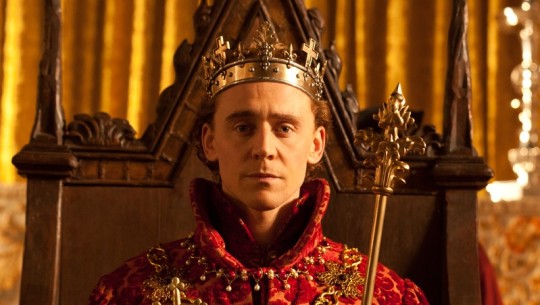
This is my least favorite of the four plays, but I did like the choices that Richard Eyre (the director) made in his cuts. He turned what can be a turgid and, let’s face it, dull play into something interesting to watch. He turned it into a play about becoming old and facing death.
King Henry is approaching his death and he frets about the unsuitability of his son to wear the crown when he is gone. Although it takes a while to get there, the final scenes between Henry and Hal are mesmerizing. Irons and Hiddleston are wonderful as the mantle of power is passed, literally as Henry crowns his son. The very brief moment before all this happens, as Hal sits on the throne with his crown, tears running down his face, actually made me well up.
Hal’s other father is aging as well. Falstaff is completely deluded about what Hal’s becoming king will mean for his old friend. Convinced that a life of leisure and sack is just around the corner, Falstaff is biding his time. The scene in the tavern with Doll was tender and lovely. Here is an old man, aware of his mortality, trying to drum up sympathy for his plight. It is all too late, as his past actions are catching up with him.
Never do they catch up more than at the end of the play and Beale plays Falstaff’s final humiliation to perfection. Genuinely shocked by Hal’s change of heart, the emotion races across his face while the newly crowned king dismisses him out of hand. Hiddleston plays this scene extraordinarily well. It is clear that he is doing what he must and what he believes is right, but there are hints that he wishes he could have avoided this scene all together.
Henry V

The producers were up against it filming this play. Undoubtedly the best known of the history plays, it is filled with speeches that are so well known, they are quoted and paraphrased in nearly everything one watches. Additionally, every English actor worth his salt has performed the role at one point or another and Kenneth Branagh filmed a version that would be tough to beat.
It is also, arguably, the most English of all Shakespeare’s plays. By that, I mean it is patriotism in its purest form. The English king, a reformed bad boy, travels to France and, against all odds, triumphs over his adversaries. Throw in the St. Crispin’s Day speech, and I want to stand tall and salute the St. George’s Cross.
The Hollow Crown version, although not the best, worked in terms of the series. It brought to a satisfying close the arc of a weak king, succeeded by a stronger king, succeeded by the most famous king of them all. Hiddleston was better as the younger playboy than he was as a fierce warrior, but when Henry disguises himself to walk amongst his troops before the battle, he was believable -- we had already seen it.
The problem I had with this version is that Hiddleston is on his own, and he doesn’t quite carry it off. He does not have a Jeremy Irons or a Simon Russell Beale with whom to interact and his final scene with Princess Katherine should have at least some degree of sexual tension. This did not.
Having said that, I pity anyone who has to take on the St. Crispin’s Day speech and make it his own. This one was fantastic. Rather than shout it from the ramparts, the director chose to have Hal speak it to “a happy few” and to speak it from the heart. I found myself grinning at the end of it.
The end was also an interesting choice. The director chose to have Falstaff’s boy, who appears sporadically throughout the play, age and turn into John Hurt who had been voicing the role of the Chorus. He breaks the fourth wall in the final moments and it worked. It reminded us that we are watching is, indeed, history and that time passes for us all.
I’m convinced that if Shakespeare is looking down at some of the schlock being performed in his name, he is sighing with relief at these. I’d like to think that, like me, he wishes they hadn’t stopped, but had continued on with Richard III.
ChrisB is a freelance writer who spends more time than she ought in front of a television screen or with a book in her hand.
#The Hollow Crown#William Shakespeare#Richard II#Henry IV Park 1#Henry IV Part 2#Henry V#Ben Winshaw#Jeremy Irons#Tom Hiddleston#Doux Reviews#TV Reviews
19 notes
·
View notes
Photo

the stage is empty and the audience is abuzz. what is the 411? what has everybody been up to? what is the hot gossip? tell me everything. some of them can’t wait for the contest to end, whereas others wish for just one more night, if only so they can see how the whole thing would blow up even further. in all the hubbub, the crowd seems to miss one minor detail: where has ursula gone?
the murmurs don’t even fully quiet down when the lights dim and the music kicks up.
light purple spotlights shimmer as they spin about onstage. a dark void worthy of darkrai opens up in the center and the lights stop, seeming to be swallowed by the night shade-hex combo that makes a black hole in the center. with a flash of orange dazzling gleam, motes of confuse ray spin out of the hole as shadow sneak hands shoot out from the oozing mass that also releases infestation bugs that skitter into the aisles. each hand seems to use thunderbolt on the way up, like the electric bars of a cage--
and then ursula herself appears, rising out of the hole thanks to gengar’s psychic, completely dry in spite of being underwater because of the very same move. she bows as the audience applauds, and begins her speech.

❝ladies and gentlemen, i’m proud to announce that the all hallows’ faire is now over!❞ a profound sigh of relief swept through the crowd, which ursula ignored. ❝well, not really. i still have to announce the winners and everything. everybody, come on out!❞
one by one the contestants file onto the stage, in the order that they performed, to the audience’s tumultuous applause. as each one takes their place, ursula hands them each a black key with a glowing orange pumpkin tip: each key is topped by a jack-o-lantern with a wicked grin.
❝i am so happy you all could join with me here for the contest. your performances were truly exceptional, and uh--❞ she looks at her hand--❝i couldn’t have done any of this without you. please accept these custom all hallows’ souvenir keys as proof of all the, uh, good memories you shared of this contest--you all are welcome back next year.❞ if there even would be a next year, she thought as she handed them out.
❝anyway, let’s see what our first, second, third and honorable mention places will be taking home today!❞ she clapped her fingers and at once the prizes appeared on two screens flanking the stage. the one right above the stage remained empty, but it would not be for long.
❝in addition to being able to access our wonderful castle here, second place will get to choose from some of our properties, and lucky first place gets to access it all--and more!❞ she clasps her hands together and smiles, all her previous nerves gone; thinking about her family’s wealth never fails to cheer her up. as she describes each property, it flashes on the top screen.
❝there’s our castelia city penthouse, complete with two bedrooms, a piano, and a balcony with a view of the entire city. there’s our villa in the geosenge countryside, with its own private forest. and finally, there’s our beach house in undella bay, with its own private section of the abyssal ruins for you to explore! so, first place, you’ll have free access to all these wonderful locations, plus a few more that i would really love to show you. and second place, just let me know where you want to go at any point after the performance is over--don’t worry, the time you take to decide isn’t going to cut into the time that you have to live in it!❞
❝now, who’s going to win these fabulous prizes?❞

❝Let’s find out!❞
holographic keyholes light up above each contestant’s head as the lighting dims to a dramatic halloween-y green and the drumroll starts.
❝the first round scores!❞
black holographic dots whizz into each of the souvenir keyholes, filling each one in proportion to the scores that the contestants received. the evil jack-o-lantern grins light up even brighter as the scores are received, as though they are drawing sustenance from the energy. at the same time, orange numbers appear above the keyholes to match the actual scores.
❝the second round scores!❞
this time the dots are orange. the point numbers scroll as they increase like slots on a slot machine, ticking steadily upward as the new results come in.
❝and now, the moment you’ve all been waiting for, the thing that tips the scales…the votes!❞
the final round of dots, this time yellow, begins to peter in. the numbers continue to increase, but at a slower pace to reflect the smaller volume of points earned from votes than from the first two rounds.
the highest number shines bright above one contestant’s head. the number above their keyhole flashes as the rest of the keyholes fade away. a brief fanfare plays as ursula’s gengar invisibly uses dazzling gleam to surround them with a brilliant golden light…
Annalise is the winner!
on the top screen, there is now a list to reveal precisely who scored what:
Annalise Abernathy - 114 + 103 + 9 votes (45 points) = 262 points!
May Sakurai - 105 + 95 + 9 votes (45) = 245 points!
Yuugetsu Sumire Wheeler - 100 + 117 + 5 votes (25) = 242 points!
Fabien Lafayette - 105 + 91 + 6 votes (30) = 226 points!
Hikari Azai - 83 + 80 + 12 votes (60) = 223 points!
Agatha Christine - 89 + 83 + 2 votes (10) = 182 points!
Grimsley De Alencar - 87 + 72 + 4 votes (20) = 179 points!
❝a warm and wonderful congratulations to all of our fabulous finalists, especially our top four contestants and our honorable mention. and especially to you, annalise--you worked suuuuuper hard for this reward, so you earned it! here, you pick.❞ she shows annalise two options: the all hallows’ faire key, or the all hallows’ faire ribbon--both of which would open doors to two very different opportunities, one in showcases and one in contests. what a relief, ursula thinks, that annalise so happened to win: maybe now sky might get off her back a little!
once annalise makes her choice, ursula turns around to address the crowd again.
❝now for a word from the honorable mention himself--fabien lafayette, who i am proud to call a servant of my household!❞
grandly she hands the microphone to fabien, who speaks--but it’s not at all what they rehearsed together. instead, it’s something far more incriminating than even her parents could have imagined…
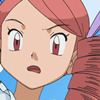
❝…didn’t expect that reaction, but that’s okay,❞ she says. it’s all she can do not to break down onstage as well. ❝hey, crew, could we, uh…❞
she doesn’t even have to ask. the line gets drawn through fabien’s name, and in his place hiroko’s (misspelled) name is bolded. she is the new honorable mention, not THAT BITCH who just ran offstage!

❝anyway…yeah. that’s it. that’s the contest,❞ she says, folding her hands over her microphone. ❝well, i, uh, hope you all had fun, because i sure did. have a happy halloween and, um…see you next year!❞
the void from whence she came opens up, and she literally sinks through the floor in embarrassment.
her contest is a disaster, sky is about to catch her cheating and now her most trusted servant just messed up her grand finale.
why do all these bad things have to happen to her?

@dracaelum-faerie @kxkuko @ranseiuniter @stageonmay @sparklingemeraldidol @devonheir@gottamuseemall @3000yearmonarch @eevee-sohma @estrellawn @astralinity@lunarisvesperaregina @firewarriorshamus @grimastor @imbicilite@grimomens @facadxs@griseousperformer @lukissed @sayurismiles@lostguidings @nimbasah @ofreborngods@aeshmedai @coldbornthief @stygianmoondust @hikaup @eiriini @moonpulled @elitentomology @sangmer @wxrldxfpokemxn @hclianthi and with that twist ending, the contest has now FINISHED! right on the winter solstice, too, which is cool. all i have to add is the following administrative things:
the order of the placements by URL is as follows.
first place goes to @dracaelum-faerie!
second place goes to @stageonmay!
third place goes to @lunarisvesperaregina!
@imbicilite, who used to be honorable mention, dropped out.
honorable mention goes to @ranseiuniter!
@kxkuko
@grimastor
if you want to leave comments, you can fill out this feedback form. it is totally optional, but would be greatly appreciated!
if you would like me to continue your all hallows’ trick-or-treat, please let me know, otherwise the thread will be dropped. everyone in the contest who has commented on this post has received a starter (except for @estrellawn GIRL I AM SO SORRY IF YOU WANT ME TO DO ONE FOR YOU I 100000% WILL) and will receive a prize.
if you would like to continue an all hallows’ thread with me, feel free to do so. in addition, if there are threads with other people that you want to continue, you are free to do so as long as you want.
it’s been an absolute pleasure having you all on board with this competition--it just wouldn’t be the same without your creativity, your passion and your dedication to rp and contest work. i hope everyone has a wonderful, happy holiday and i can’t wait to see you back at my next event!
riot squad, you know what to do.
BEGIN THE AFTER-PARTY 😈😈😈😈😈
#allhallows2k18#allhallows2k18updates#allhallows2k18results#|| ALSO YES I MADE A MEAN GIRLS REFERENCE
9 notes
·
View notes
Text
3. OCEAN'S DEPTH.

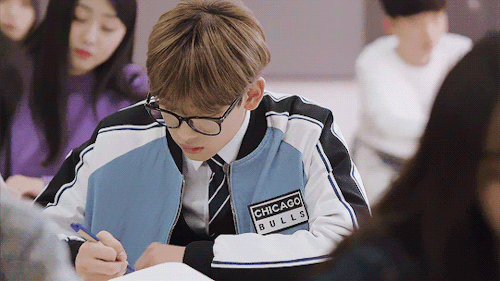
Genre: marine biologist AU
Pairing: Bambam x reader
Word count: 2.2K
0. Synopsis // 1. Whales // 2. Dolphins. // 3. Ocean's depth.
(( I apologise for the long wait, it was not planned at all. Uni is in full swing, I am in my final year so the thesis writing is giving me a little headache. I hope this part will still be somehow enjoyable! Please let me know your thoughts! ))
- - - OCEAN'S DEPTH - - -
You were tapping your foot against the warm pavement the next day in the docks. The weather was still shiny, pleasant and ever so welcoming.
You were supposed to have a good mood, considering all of these aspects.
You felt like a piece of a rotten tuna tin.
Exactly like rotten tuna tin, whatever it was supposed to mean.
"Where is he?!" you shouted angrily to your two colleagues who were looking bored and kept murmuring among each other, snickering quietly.
"Calm down," said Jaebeom and pressed the side button on his iPhone to check the time. He pushed it back into his back pocket of his jeans. "His late just 15 minutes."
Jackson laughed in disbelief. "Just 15 minutes."
You glued your strict stare at the cheerful man and he just shook his head, not bothering to talk to you more.
"Well, if he isn't coming in five more minutes, we are leaving."
"But boss, even if we leave in five minutes we will still be there 30 minutes early," replied Jaebeom in a diplomatic tone.
Jackson snickered again.
You sighed, combing your hand through your already messy hair. "Are you making fun of me? Do you think this is funny?"
"No, not at all, " replied Jaebeom, coughing away his giggle.
"Look, " you started, holding your hand out." You can think whatever you want to, but the fact is that we should be there a little bit earlier to make sure everything goes smoothly. As you can see, this duck head is late anyway. This is why we have to be there a little bit earlier."
"A little bit, " mumbled Jackson to himself.
Jaebeom started to laugh loudly, not bothering to hold back anymore.
As much as you liked to see your forever cold and reserved colleagues laugh, you did not appreciate it one bit at the moment.
" Shut up, Jackson, " you snapped. " You don't let me breathe even for a little while right? You always have to push me down."
He looked at your hurt face and before he could argue in any possible way, from the distance you hear rushed steps and a very tired looking Bambam. He was trying to adjust his bag on his shoulder as his hair was a big mess.
"I'm here! I'm coming! Oh, thanks for waiting for me!" he breathed as he finally arrived.
"Good." You turned around and marched forward towards the kindergarten that you hated so much at the moment. Youngjae was going to pay a big price for letting his mouth talk so much.
If Jackson were a dog, he would have his ears pressed to the sides of his head, his tail between his legs and lowered head. There wasn't a minute when you wouldn't fight these days despite how hard and cold you both were to each other.
He still wouldn't tell you what was pissing him off so much about you and you certainly didn't want to ask about that kind of thing. This way you were aware you were annoying him and that was more than enough.
You all made your way to the kindergarten and to your pleasure, you were quickly ushered in, the kids already waiting.
"Soon is never soon enough, Dr Im," you muttered to Jaebeom. Before he could retort something too sophisticated for you, you turned quickly to your team, mostly focusing your attention to your two colleagues rather than Bambam who was smiling the whole time as he was observing the kids' drawings. "Alright, we literally have like five minutes to discuss whose gonna talk about what-"
"Y/N," you heard your name. Youngjae's mum was standing next to you, her frame tall and her facial features kind. "I'm afraid you will have to go in now. The kids are waiting and they are restless."
"Yes but-"
"Alright, then there is no time to waste!" shouted Bambam, suddenly paying attention and soon he was entering the little hall kids had there for their performances.
Jackson snickered as he followed Jaebeom and BamBam. "So much for authority, huh."
A tiny growl escaped your lips, startling you. Damn. Now the game was on. You would ruin Jackson for sure.
The kids greeted you politely, most of them curiously looking at the blonde haired Bam.
While Jaebeom looked uncomfortable and seemed like dying inside from the attention, Jacskon was also naturally swayed with the kids as he was smiling brightly, waving at them.
"Everyone, let me introduce you these marine biologists," started Youngjae's mother, her voice a pleasant baritone. "Dr Y/N is The leader of the marine research institute here in Mokpo and Dr Jackson and Dr Jaebeom are her colleagues, great experts. Dr Bambam is a world famous marine biologist from Thailand so make sure to treat him with respect."
"Are we considered trash next to him?" muttered Jackson as he had his bright smile plastered on his face.
You bumped your elbow into his ribs quite hardly which made him wince with surprise. He widened his eyes at you, but you had a stern look already focused on the wall opposite you.
"Now I will let our biologists take over the talking and please participate actively!"
Youngjae's mum nodded at you with a supportive smile and you made sure to thank kindly before reaching for the microphone. "Hello, everyone! I'm Y/N and I would like to start with a question for all of you. Please raise your hands if you want to talk, alright?" you asked with a thumb up but when you didn't get any feedback you laughed awkwardly. "Alright! So, what do you understand under marine biology or marine research?"
You had a weird feeling these questions were not exactly meant for such a young audience as these four-year-olds who barely knew their mother's name but you were serious about doing your job professionally.
One little boy in the front row raised his hand shyly. "I think you work with dolphins."
You swayed your head from side to side. "Yes, could be also."
"That's totally true!" exclaimed Bambam. "And you know what? Let me tell you something that I'm sure you didn't know about whales." The way he was talking made kids much more interested compared to the poker faces they were giving you.
"The whales are these veeery big animals, right?" asked Bambam, motioning with his hands. "We also call them mammals.They can be much bigger than this whole kindergarten! And the important thing to know about them is that their poop is needed for the ocean's ecosystem."
You snapped your head to Bambam, not liking the direction he was going. On the other side Jaebeom and Jackson were also listening as intently as the kids.
"So how exactly does this work, hm? Well, when the whales poop it's really big and can create a big mess." Kids started to laugh, supported by Bambam. "Their poop contains lots of important microscopic creatures that are beneficial for other fish! For instance, phytoplankton is a crucial part of the ocean's ecosystem and some underwater animals live off of it."
"Eeeeeeeeew," kids whined but laughed loudly, scrunching up their noses.
BamBam laughed too, extremely pleased with himself. Jackson and Jaebeom had a light grin, also liking the playful way Bam introduces whale's poop.
"Another thing we have to watch out for are coral reefs," started Jackson his part. The k god it was an appropriate topic. "Do you know what are coral reefs right?"
There was a lady sitting by with a laptop who screened pictures on the big wall so the kids could see. She typed quickly into Naver search engine the keywords and all of you were met with colourful fish and massive corals. It made you smile right away and Jackson went up to the picture and tried to simplify the information about the coral reefs.
“They are extremely endagered. You know Nemo, right? Well, he also lives in these coral reefs. However, Nemo cannot cope with warm water. That is what causes these reefs to die out - warmed up temperatures.”
All of you continued with your presentations, trying to engage children as much as possible and at the end having a nice little quiz (with a rewarding present too!).
Jaebeom was breaking jokes about sea horses that you tried not to cringe about but thanks to Bambam, he supported every idea. It almost seemed like he knew only the silly stuff and not the important information.
After you were finished, you stopped Bam on your way out, so that Jackson and Jaebeom wouldn't hear you.
"Can we go diving today?" you spilled.
If Bambam was surprised, he didn't show it. Instead a signature smile spread across his face. "Well of course , boss. But I made a reservation at this five star restaurant you have in this little town so I will go there first."
You sighed, trying not to show your frustration. "Look. You shouldn't eat before diving especially not with the depth of our diving. Secondly, I thought you came here to help, not try all these so call five star restaurants."
BamBam laughed, tapping your shoulder. "should I cancel because of you, Y/N?"
"Exactly my idea," you smiled, walking past him.
He was quick to grab your hand though. "How will you refund me this loss?"
"What? What do you mean?"
"Well, you know how important I hold my luxury living. Since I'm going to sacrifice it for you, I hope it will be rewarding at least." His hand trailed over your arm, teasing you.
By now you knew better than to take his ideas seriously. "Well, heated kissing under the water, how does that sound."
Bam laughed tapping you shoulder. "Good enough, girl, good enough."
You couldn’t believe your own words. Your own mouth. Your own tongue. heated kissing under the water?! There was a sudden urge for you to slap yourself as you were heading to the docks to meet Bambam. How on earth could be this cheesy?
You knew Bam was not serious half of the time and even though he did tell you some good things about the marine biology and how to lead this entire expedition, there was just something slightly off. Whenever someone had a really professional question, he would suddenly go quiet, dissing the question with a simple answer that didn’t really add to your knowledge.
When you entered the docks with all your equipment, you were surprised to find him already there. He seemed deep in thought, his uniform already on.
You paused for moment, thinking what to do.
Set your goals straight...
There was no doubt you needed this guy for you to find the creature. He had all the knowledge. Apparently...
“How was it when you found out people know you?” you walked towards him, a challenging smile on your burned face. “And why would you talk about whale poop anyway.”
Bambam smirked as he turned towards you, his full attention now on you. “How else do you want to get the kids attention if not with something silly.”
“Good for you it was a true fact what you said,” you replied, putting on your swimming gear.
“I only say things that are true,” he murmured, eyeing you up.
A blush creeped up into your cheeks as you zipped up the uniform on your back. You both checked whether the equipment you had was prepared for the dive. “I sure hope so.”
“So the kissing part,” he started.
You held out your hand quickly. “Stop right there. I didn’t mean any of that.”
“And here I thought you liked me.”
“I do,” you said without thinking and immediately closed your mouth in pure shock. What did you just say?!
“You do?” he asked, his eyes full of hope.
You blinked a few times, hiding behind one of the oxygen bombs. “What? I mean I like the weather today.”
Bambam burst out into fit of laughters. “You are actually super cute, you know that? You play all this hardly approached girl but you are such a softie.”
“That is some good load of whale poop,” a doubtful laughter was the only thing you could let out. “Anyway, let’s go already. It’s gonna be super dark in a few.”
“Yes, that’s the point of night diving.”
As you walked passed him, you turned sharply, facing him. “Listen, Bambam. Whatever it is you are thinking, stop it. And just so you know, I have my eyes on you.”
He wiggled his eyebrows at you, obviously not taking you seriously but you just sighed and headed towards the little stairs leading into the water. It wasn’t until you reached the edge and you slipped on it that you felt his hands around your waist. You yelped feeling him pulling you backwards. It made him slip almost as well but he managed to keep a strong stance making sure you are steady.
You stayed like that for a few more seconds before your heart beat could simmer down to a normal rate. Slowly turning around, you saw Bambam’s gentle face. His eyes were already on you when you met his gaze. His hand reached out and slowly pushed your messy hair out of your face before his index finger slipped under your chin, sending goosebumps down your spine.
You didn’t realise you were holding your breath until his face was inching closer to yours.
Oh no.
What was he doing?!
<3
#got7 au#got7 fanfic#got7 au fanfic#got7 fanfiction#got7 bambam#got7 bambam fanfic#got7 bambam soft#got7 bambam imagine#got7 bambam drabble#got7 bambam scenario#bambam#got7 scenario#got7 imagine#got7 drabble#kpop fanfic#kpop au#kpop soft#bambam imagine#bambam fic#bambam fanfic#bambam fluff#kpop fluff#got7 jb#got7 jackson#got7 youngjae#got7 yugyeom#my writings
18 notes
·
View notes
Text
RAVING REVIEW ON A HOSTILE HOSPITAL
For its penultimate two-part adaptation of the season, A Series of Unfortunate Events nails the perfect episodes and offers its best installments yet - the equivalent of Game of Thrones' ninth episodes. After the somewhat tepid Vile Village, the show embraces the horrors of The Hostile Hospital and manages to deliver on all fronts.
It is in great part thanks to Neil Patrick Harris whose performance as Olaf has never been better than here. Olaf makes it clear it's not a game anymore this time and Harris is absolutely convincing in his devious cruelty and ruthlessness. It's a major improvement from the previous episodes and in doing so, he manages to also pull Lucy Punch with him as well. Esme is no less scary than her partner and a major force to reckon with, as seen in the cliffhanger that ends Part One - the most thrilling scene of the season if not the entire series. That scene tops the first half of an installment that was already perfect in many ways. Once again, the show must be commended for its cinematography and musical score, both working marvels to conjure the eerie, disturbing and somehow terrifying atmosphere of the titular American Horror Story-esque hospital and making The Hostile Hospital essentially a thriller. That series is probably not the sole inspiration or reference here as the Two Faced-Powdered Women (Jacqueline and Joyce Robbins) scare away Babs (Kerri Kenney-Silver) Stephen King's IT-styled, complete with red balloons. The latter also sees her role once again expanded but it's for the best, offering another of those you-thought-you'd-win-well-think-again scenes similar to Olaf's aborted arrest in The Vile Village.
Book deviations have never been better than in those two episodes. VFD takes a step back as neither Olivia nor Larry nor Jacquelyn appear but we still get a surprise appearance from the dead Jacques through the most important Snicket file. While in the books it was in literary form, the show upgrades it to a film which allows Nathan Fillion to grace our screens once again while delivering another bombshell - one of the Baudelaire parents may be still alive. It's a bit baffling that the first revelation that led to this one (in the books, Hal (David Alan Grier) recognizes the children as explicitly mentioned in the Snicket file) is not included but that was ultimately rendered unnecessary given Snicket's revelations. And if we were taught enough by now to be suspicious on the question (after all, Snicket does not mention what particular fire it was and there have been many at this point) the show tries hard to steer us in that direction as Olaf does seem none too pleased to come to the same conclusion as well - another deviation, or perhaps more of a confirmation as he was heavily implied in the books to have had something to do with the fire.
He certainly seems to enjoy arson as he both unwittingly and then willingly sets Heimlich Hospital on fire. The act itself is seen rather than implied in the books and that's perhaps a good thing. The show gets better and better at trying to tie everything together and explaining what it can explain while keeping blurry what must remain blurry. It is for example very satisfying to have a proper explanation (however simple) to the question of how Olaf always managed to catch up on the Baudelaires, however far they went when that was more of a stretch in the books. Another nice revelation is the actual showing of the revered sugar bowl, a fleeing storyline the series has tackled much more clearly than the novels ever have. Esme's obsession with it now borders on comical relief and clashes with Olaf's desires to smash the orphans but she voices the concerns of legions of book readers who agonized over what purpose this item exactly had. To actually see it hidden here in the hospital is a reward in itself and for a moment, fear crept in that since the sugar bowl was never revealed in the books, then perhaps the show could not do it either and that it would be lost in the fire. But then the final scene happened and our interest got renewed. Kudos to the show too for understanding its source material better and better both by nodding to its habit of foreshadowing its next installment (that's twice now that Madame Lulu from The Carnivorous Carnival is mentioned) and also with visual parodies (The Vile Village featured a particular book with a cover and edition similar to the real-life editions of the novels). Lemony's quiet personal reveal does beg the question to be asked considering what happened to Jacques, Josephine, Uncle Monty or his assistant Gustav - are the remaining VFD members headed the same way ?
But it is the story itself and its adaptation that win here. Violet's abduction and cranioectomy feel all too real and we're genuinely anxious about the fates of the three orphans. Especially when Harris is so convincing in his threats not only of succeeding in stealing their fortune but also erasing the Baudelaire family once and for all - a scene that gets a whole new meaning now that we know (or do we?) that one of the parents may have survived. While the implications are not clear (Olaf does not really explain how he plans to get the fortune with Violet dead; we can only assume that he counts of Klaus and Sunny to rescue her so that he can snatch one of them while killing the other two and keep only one to come of age so that the fortune is legally inherited; or he means to kill them all and steal the fortune in not so legal ways), it does point more and more in the direction of an awful past drama between Olaf, the Baudelaires and the Snickets - one that left Olaf bitter enough to turn his back on VFD and former friends and to now want to destroy the legacy of his enemies. Nonetheless, the cranioectomy scene itself is almost rendered as close as it was in the books down to the Sleeping Beauty reference - visually matched perfectly with the arrangement of Malina Weissman's long hair around her head - to the disturbing gestures of an adult towards a teenage girl. Only this time, it falls to Olaf (who in the books was not present at the actual scene) to do it instead of the Hook-Handed Man and the Bald Man - all for the better as it perfectly fits the former's state of mind this episode and it would have seemed out of character for the two latter. For all their following of their leader, Olaf's troop remains a source of comical relief and that's no less an achievement that they can and indeed will be as ruthless as their boss at the same time. Having Klaus forced to perform the operation by Esme and Olaf instead of them falling for his disguise (a clever way to bypass his and Sunny's rather difficult book counterparts replacing the Two Powdered Women) gives another extra shade of devious in an already dark story. How good of a contrast it is then to juxtapose the scary parts with the upbeat singing of the VFD (not the real one) members - that is what can be called an effective use of musical numbers. Just in passing, John Bobek fits much more the image I had in mind for Hector but that's just a minor detail.
But it's perhaps in the most random and quiet moments this adaptation works best. In a rare scene of calm and reflecting, Hal invites the children to literally look up to the stars and be upbeat about the outcome of things, sharing some wise knowledge about how, in the future, it'll be their turn to help others in need (foreshadowing much?). It's a nice moment, tender and hopeful and it is then the cleverest choice to follow it with the children's first step into morally grey areas. Malina Weissman and Louis Hynes are absolutely great at portraying the inner turmoils of their minds, of straying away from the right path - VFD's path? - and what it costs them to effectively lose their integrity. That is the kind of reflection, the kind of questions A Series of Unfortunate Events is best at raising. Not about nebulous organizations. Not about mysterious cooking recipients. But the personal kind, the kind that push you to reconsider your nature and your own beliefs and to push them against circumstances. It's ultimately a question of finding yourself and having the strength to ask 'Who am I?'
#asoue#a series of unfortunate events#asoue netflix#netflix asoue#asoue season 2#asoue spoilers#count olaf#violet baudelaire#klaus baudelaire#lemony snicket#sunny baudelaire#esme squalor#the hostile hospital#text
47 notes
·
View notes